Vladimir Putin has been ruling Russia for 20 years. During this time he has created a sustainable authoritarian system, a targeted repression apparatus, and a powerful propaganda machine—all of which allow him to compete with relative success both inside Russia and abroad.
To mark this grim milestone, IMR has launched “Russia under Putin” project to take a bird’s-eye view of the last two decades, focusing on social and political developments that are often found beyond the narratives related to Putin.
The project is organized in two parts. The first part is a series of three reports dedicated to Russian civil society forces that operate under authoritarian conditions—protest movement, civil society organizations, and independent media. The second part is a timeline that retraces key events that have defined Russia’s political agenda over the last 20 years.
“Russia under Putin: 20 Years of Battling over Civil Society” is the second report in IMR’s current series. In this report, IMR’s experts analyze how the Russian state has used regulation, funding, and integration schemes to shape civil society groups.
Using original interviews and other data, the authors examine the strategies developed by various Russian CSOs to provide needed services, raise awareness, and influence public policy. The report offers recommendations for stakeholders interested in supporting the success of this important, democracy-fostering sector.
total number of registered nonprofits
of nonprofits focus on “social welfare” issues
times the federal law on nonprofits (No. 7-FZ) was amended since 1995
of nonprofits have been labelled “foreign agents”
of nonprofits have been designated “undesirable”
This first report examines the protest dynamics in Russia over the last 20 years. Under Vladimir Putin’s rule, protests in Russia have transformed from being driven by economic grievances to being motivated by political demands, while local issues have also remained important to participants. As public demonstrations have evolved, so too has the regime’s response. Since 2012, the Kremlin has introduced an array of measures to restrict participation in protests and clamp down more severely on unsanctioned rallies. Despite these efforts, as research has shown, the public appetite for protest is growing, with more people blaming Putin personally for the country's many problems.
Protest patterns reflect the political system in which they take place. By clearly describing the frequency, volume, and nature of protest, as well as regime responses to it, one might be able to gain a better understanding of the world’s most high-profile authoritarian regimes.
Former First Vice Prime Minister Boris Nemtsov on why Yeltsin chose Putin as his successor.
On August 16, the State Duma approved Putin’s candidacy for prime minister: 233 votes were cast in favor and 84 against, with 17 abstentions.
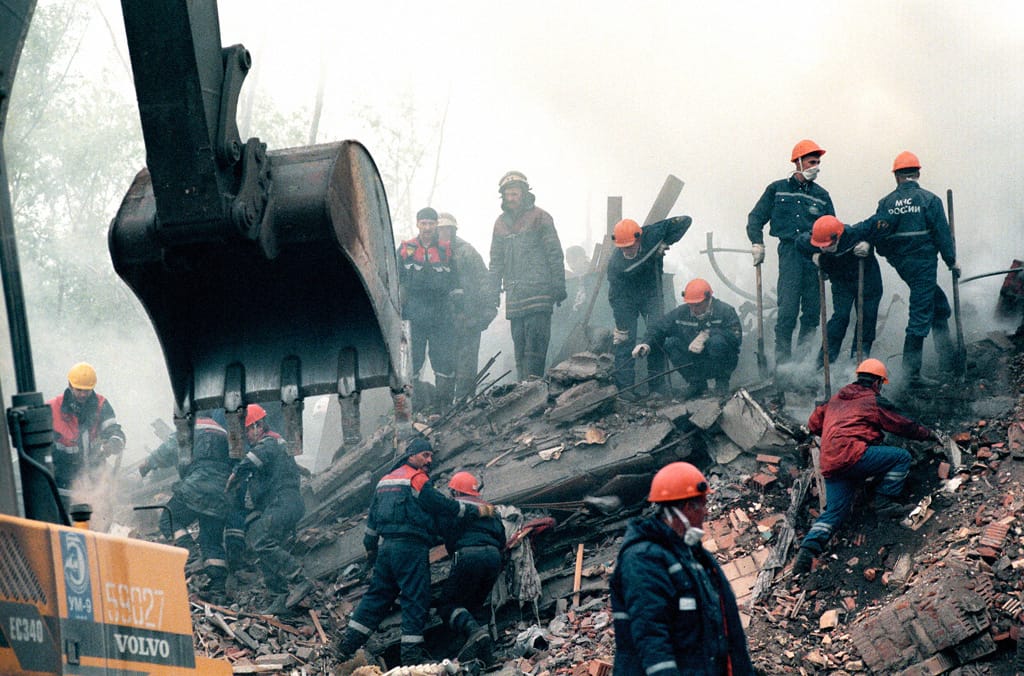
Rescuers remove rubble at the explosion site of the Kashira Highway apartment building. Photo: Commons RIA Novosti
On September 22, residents of an apartment block in Ryazan found bags in the basement containing a mixture similar in composition to the explosive hexogen. However, FSB director Nikolai Patrushev stated that it was part of an anti-terror exercise in the city. Independent investigations have cast doubt on this version of events.
According to the investigation, the terrorist attacks were conceived by the leading Chechen separatist fighters Ibn al-Khattab and Abu Umar to spread terror among the population and to influence the Kremlin’s policies regarding its troops in the Dagestan war. In January 2004, two men, Yusuf Krymshmkhalov and Adam Dekkushev, were sentenced to life in prison for carrying out the attacks. Several others implicated in organizing the attacks were killed in Chechnya. One suspect, Achimez Gochichayev, is still on the international wanted list.
On September 24, during a visit to Astana, Kazakhstan, Prime Minister Putin issued an uncompromising statement that would become a catchphrase: “We will pursue the terrorists everywhere... If we find them, forgive me, in the toilet, we’ll waste them in the outhouse...”
On September 30, federal troops entered Chechnya and seized control of a third of the republic in two weeks. By November, Grozny was surrounded, with fierce battles raging for control of the city.
* The First Chechen War lasted from December 11, 1994, till August 31, 1996. The collapse of the USSR emboldened nationalist movements in the North Caucasus, as a result of which the self-proclaimed (but universally unrecognized) Chechen Republic was de facto independent from July 1991 till end 1994, under the control of separatists headed by Dzhokhar Dudayev. Against the backdrop of widespread criminalization and simmering civil war across the republic, the Kremlin launched a military operation “to restore constitutional order,” which soon morphed into the First Chechen War. In August 1996, after defeat in the battles for Grozny, the federal authorities were forced to sign the humiliating Khasavyurt Accord, under which Russian troops were completely withdrawn from Chechnya, and a decision on the status of the republic was put back until December 31, 2001.
During the course of the Second Chechen War, approximately 6,000 federal troops died as well as 17,600 Chechen fighters. The nongovernmental organization Memorial estimates that deaths among civilians numbered between 10,000 and 20,000. Approximately, 5,000 people disappeared during the conflict.
Vladimir Putin's first Inauguration, May 7, 2000.
One of the Kukly episodes portrayed Putin as an ugly midget Klien Zaches
The raid took place during a media war that began in 1999 between Gusinsky and Boris Berezovsky, who controlled another large media conglomerate that included the television channel ORT (which is now Channel One). During the 1999 Duma election and the 2000 presidential election, media outlets controlled by Berezovsky had supported the pro-Putin Unity (Yedinstvo) political bloc as well as Putin himself. Gusinsky, on the other hand, had refused to support Putin. Between 1999 and 2001, NTV had aired coverage of the Second Chechen War that was critical of the government, produced investigations of apartment bombings, and aired a satirical puppet show, Puppets (Kukly), which routinely made fun of the activities of the new president.
A criminal investigation was opened against Media-Most on April 26. Gusinsky was arrested on fraud charges and put in Butyrka prison on June 13. He was released on June 16 after agreeing not to leave the country. On July 20, he signed over all of his media holdings to Gazprom-Media as payment on a $300 million debt. On July 26, the prosecutor closed the criminal investigation and Gusinsky left the country.
Seven federal districts were created by order of the president. In each district, Putin appointed presidential envoys to oversee and increase federal control over the regions. Strengthening of this “power vertical” continued from July 29 to August 4, when laws governing regional legislatures and executives, as well as local self-government bodies, were amended.
Membership in the Federation Council (the upper house of the Federal Assembly) was reformed to exclude regional governors who had, until that point, been able to take one of the two seats in the body allotted to each region. Now each region sent one senator from the legislative branch and one from the executive branch to the council. Putin was also granted the power to dismiss regional heads and legislative assemblies if they adopted legislation that violated the Constitution.
Putin endorsed a program of tax reform, which had been delayed for five years, via a presidential decree. The president proposed a flat income tax rate of 13 percent, lower payroll taxes, and the abolishment of both the sales tax and taxes on the purchase and sale of foreign currency.
The new tax system, fully adopted by 2003, was widely regarded as one of Putin’s “success stories.” However, the plan for tax reform was actually created by Yegor Gaidar and blocked in 1996–1997 by the Duma, which was dominated at the time by deputies from the Communist Party. The original the tax system adopted by Russia in 1992 to deal with a market economy was modelled after European and American tax systems and proved to be largely ineffective, complicated, and susceptible to widespread tax evasion.
The government endorsed a program of widespread economic and bureaucratic reforms that was prepared by the Center for Strategic Research under the leadership of German Gref, himself appointed to the post by Putin in 1999. The proposed strategy envisioned a series of reforms to taxation, the pension system, labor, education, health care, housing, and natural-resource industries.
In 2010, the economist Mikhail Dmitiev said that only 40 percent of “Gref’s reforms” were accomplished, and that the most extensive reforms were made to budget policies and financial markets. Planned reforms to administrative, legislative, and judicial institutions were virtually unrealized.
The explosion took place in one of the most crowded underway passage in Moscow.
Larry King interviews Putin on the Kursk disaster
Throughout the search-and-rescue operation, the actions of Russian authorities failed to reflect the scale of the disaster: Naval command did not realize an explosion had occurred for several hours and only made an official announcement about the accident two days later, on August 14. Rescue ships arrived on the scene on August 15 and were initially prevented from beginning operations due to a storm. After refusing international assistance, Russia allowed Norwegian ships into the vicinity of the accident on August 20. Hopes for the crew’s survival were dashed the next day when Norwegian deep-sea divers opened the escape hatch of the wreck and failed to find any survivors.
Despite widespread media attention and public interest in the Kursk disaster, Putin chose to continue his vacation in Sochi for five days, until August 17. On September 8, the American television host Larry King asked Putin live on CNN what had happened to the submarine. “It sank,” Putin said.
Following the release of a report by a government commission on July 26, 2002, the Prosecutor General's Office closed the criminal investigation into the Kursk disaster, citing a “lack of a criminal act.” The commission determined that the accident was caused by a technical malfunction and no individual, company, or group was at fault. Boris Kuznetsov, a lawyer representing the relatives of the deceased submariners, said the criminal case was closed for political reasons. Official documents concerning the Kursk disaster have been classified by the Ministry of Defense until 2030.
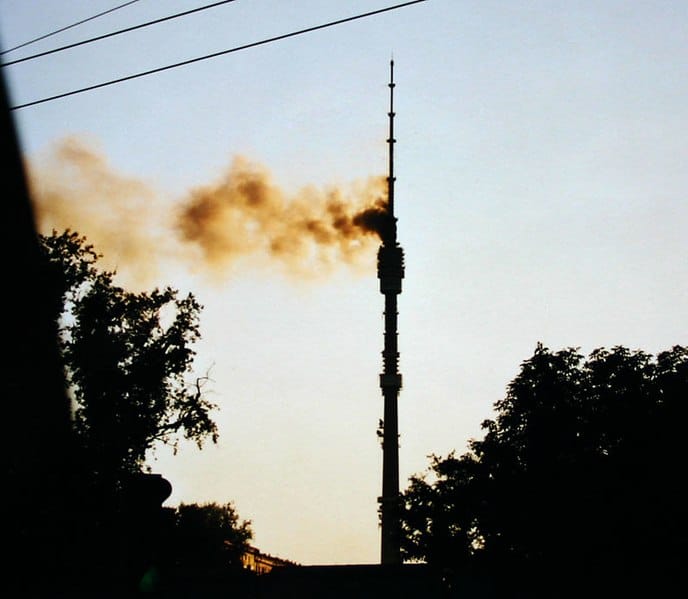
The cause of the fire was allegedly a short-circuit in wiring. Photo: Wikipedia Commons
Sergei Dorenko's program on the Kursk disaster (in Russian).
A criminal investigation of Berezovsky had opened in 1999 but was closed by November of that same year. According to investigators, between 1996 and 1999, $252 million of Aeroflot’s foreign currency revenues had been transferred to the Swiss firm Andava. The main shareholders of the Swiss company were top managers of Aeroflot and Berezovsky himself.
Many observes reasoned that the new criminal investigation of Berezovsky was connected to critical coverage of the Kursk disaster by the television host Sergey Dorenko on ORT, a channel owned by Berezovsky.
Not long before Glushkov was arrested, news emerged that Berezovsky had sold his shares of ORT, totaling 49 percent of the company, to businessman Roman Abramovich, also a member of the State Duma (the lower house of the Federal Assembly). Berezovsky had announced his intention to sell his shares in May.
In 2004, everyone charged in the Aeroflot case was convicted of embezzlement. Berezovsky was found guilty of embezzling $50 million from Aeroflot in a separate case in 2007 and sentenced in absentia to six years in prison.
Vladimir Putin declared media to be a “strategic sector, directly related to state security,” which, in practice, made it subject to government control. According to the Glasnost Defense Foundation, a nonprofit organization, the vague formulation of the doctrine allowed the government to limit the rights of journalists.
After the disintegration of the Soviet Union, Mikhail Glinka’s “Patriotic Song”—which had been the anthem of the Russian Soviet Federal Republic—became the anthem of the Russian Federation. Yet it had no official lyrics until 2000, when, in November, Putin proposed adding some.
A commission decided that the new lines should come from the poetry of Sergey Mikhalkov, who wrote the words of the original Soviet song. Putin then signed a law enshrining the new anthem—along with Russia’s tricolor flag and double-headed-eagle coat of arms—in the Constitution.
Meanwhile, that same month, Gazprom, Gazprom Media, and Media-Most signed an “amicable” agreement to repay Media-Most’s debt by transferring shares in various assets to Gazprom. But just one month later, the Russian tax inspectorate filed a lawsuit against Media-Most with the aim of bankrupting its companies due to alleged insolvency. NTV General Director Yevgeny Kiselyov described the proceedings as “a political order” that “clearly demonstrates for the first time the authorities’ true aim to liquidate NTV, and with it the remnants of Russian democracy.”
In January 2001, the conflict entered the heavy-handed phase. On January 10, Andrei Tsimailo, deputy chairman of the Media-Most board of directors, who was in talks with Gazprom, was summoned for questioning by the Prosecutor General’s Office, and his home was searched. Tsimailo himself noted that it was linked to the negotiations with representatives of CNN founder Ted Turner over the purchase of a stake in NTV. On January 16, Anton Titov, Media-Most’s finance director, was arrested on charges of fraud. And on January 26, Tatyana Mitkova, an NTV news anchor, was summoned for interrogation; three days later, the NTV team was called to the Kremlin for a meeting with Vladimir Putin, who demanded that the station change its information policy.
On March 29, several Russian newspapers published an open letter addressed to Russian society: “We have no doubt that the political consequences of NTV’s transition to state control will affect everyone. All global—and especially our own Soviet—experience confirms that when society is instructed to be silent, the state quickly develops a taste for it. And soon everyone acquires this taste, regardless of their attitude to business and politics.” March 31 saw a rally in support of NTV in Moscow, attended by 10-15 thousand people.
On April 3, a meeting of the NTV board of directors took the decision to appoint Alfred Koch as chairman, Boris Jordan as general director, and Vladimir Kulistikov as chief editor. The move split the NTV team: more than 350 journalists at the station, headed by Kiselyov, refused to accept the board’s decision and walked, declaring their intention to fight for freedom of speech; the remaining employees fell into line. Over the next ten days, the situation at NTV spun out of control: amidst an atmosphere of civil disobedience, the main programs (except news) were taken off the air, and a number of popular presenters left the channel. On April 14, NTV was forcibly seized by Gazprom.
On May 29, by decision of the Moscow Court of Arbitration, Media-Most was liquidated. By then, the newspaper Segodnya (Today) had been shut down and the entire team of Itogi magazine, headed by Sergey Parkhomenko, fired (they soon launched a new publication, Ezhenedelny Zhurnal, or Weekly Journal). Part of the NTV team, together with Kiselyov, moved to rival station TV-6 (then controlled by Boris Berezovsky, an opponent of the Kremlin since the Aeroflot affair).
A decade after the dismantling of the leading independent TV station in Russia, journalist Igor Yakovenko summed it up: “The killing of NTV, which took place in public, effectively live on air, first cowed journalism and then completely erased it as a sphere of public consciousness.”
In July 2002, Gusinsky departed the Russian media market, selling his remaining assets to Gazprom Media.
The Federal Law on Political Parties laid down that parties must have at least 10,000 members, as well as regional branches with no fewer than 100 members in more than half of the constituent entities of the Russian Federation (at least 50 members in all other branches). Experts described the requirements as excessive.
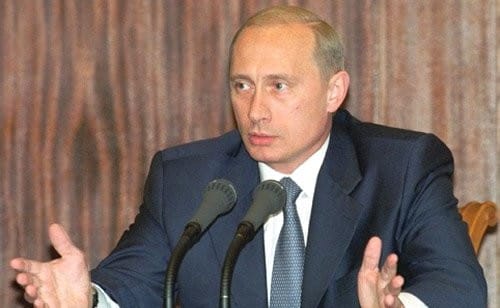
Among his achievements, he highlighted the development of Russia’s legal framework: “Four constitutional laws and 155 ordinary federal laws have been adopted,” many of which, he said, had long been gathering dust in the State Duma. Putin emphasized the importance of the laws on political parties, land, and tax reform.
He also stated his position on NATO: “I can only tell you that we do not see NATO as a hostile organization, and do not view its existence as a tragedy, but nor as a necessity. It was conceived as the antipode of the Warsaw Pact, as the antipode of Soviet hegemony in Eastern Europe. Both the Warsaw Pact and the Soviet Union no longer exist, yet NATO continues to expand. And when we are told that it is a political organization, that it is being transformed into a political organization from a military bloc, naturally the question arises: why was Yugoslavia bombed? Do political organizations do that sort of thing? Who did this? It was done by a military organization, and that doesn’t fill us with joy.”
As a solution to the problem, the Russian president proposed three options: dissolve NATO; make Russia a member; or create a new organization incorporating Russia on equal terms.
Unity lasted only two years (1999-2001) under the chairmanship of Sergey Shoigu, who concurrently headed the Ministry of Emergencies.
The Fatherland–All Russia bloc (1998-2002) was formed through combining Yuri Luzhkov’s social movement Fatherland and the All Russia bloc, instituted by regional heavyweights, among them the presidents of Tatarstan, Bashkortostan, and Ingushetia — Mintimer Shaimiev, Murtaza Rakhimov, and Ruslan Aushev, and the governor of St Petersburg, Vladimir Yakovlev. The association took shape in August 1999 under the chairmanship of Yuri Luzhkov and Evgeny Primakov.
Our Home is Russia was founded as a social movement in May 1995 at the initiative of Boris Yeltsin, co-created by Prime Minister Viktor Chernomyrdin, Gazprom President Rem Vyakhirev, and First Deputy Prime Minister Oleg Soskovets. Its parliamentarians (known in Russia as deputies) joined United Russia in 2001, and the movement was finally wound up in 2006.
More federal laws were adopted, this time on state pension provision, compulsory pension insurance, and labor pensions. According to experts, the pension system reform that followed in 2002 was the first attempt at systemic modernization; all the same, it strengthened the role of the public sector in the management of pensions. Moreover, despite a budget surplus, the reformers opted for a conservative scenario, postponing painful changes for the future.
The reform was launched as the “Concept of Modernization of Russian Education till 2010” was approved. Among the central elements of education reform were: increased federal budget spending; modernization of vocational training; changes to the university admissions process; and the introduction of the Unified State Exam (an equivalent of SAT).
The channel first began broadcasting on January 1, 1993. It was established by the Moscow Independent Broadcasting Company—whose shareholders included the city government, Logovaz founder Boris Berezovsky, the energy firm Lukoil, and others—in a joint venture with the Turner Broadcasting System (home of CNN), which remained involved until 1994. In 1999, Berezovsky increased his ownership of the company to 75 percent.
After the 2001 crackdown on NTV, Berezovsky offered Kiselyov’s team positions at TV-6 (whose ratings at the time were falling), and on May 14, 2001, Kiselyov was appointed as the new general director of the channel. Serious formatting changes followed, instilling an “old” NTV style. A number of TV-6 presenters and journalists departed to other channels.
On September 27, 2001, the Arbitration Court of Moscow granted a claim by Lukoil, which owned 15 percent of the channel’s shares, to liquidate TV-6 for financial reasons. According to the channel’s management, this move was a political one. Indeed, despite attempts to challenge the court’s decision, establish a new TV company, and hold rallies in defense of TV-6—and despite words of support from Boris Yeltsin, Mikhail Gorbachev, and other leading politicians—the channel was liquidated.
The new rules also introduced the concepts of contractual regulation of labor and probation, conditions of employee dismissal, as well as a procedure for establishing minimum wage that would be no lower than the subsistence level.
The Collective Security Treaty Organization (CSTO) was signed into existence on May 15, 1992, by six countries in the Commonwealth of Independent States—Armenia, Kazakhstan, Kyrgyzstan, Russia, Tajikistan, and Uzbekistan. The establishment of the CSTO and its future activities were largely related to the desire to create a regional counterweight to the NATO bloc.
This new body replaced the Permanent Joint Council (created by the Founding Act of 1997), whose 19 member countries would simply inform Moscow about newly adopted decisions. Under this new format, Russia gained the right to discuss issues on equal footing with others and make proposals and amendments, but not to veto key decisions.
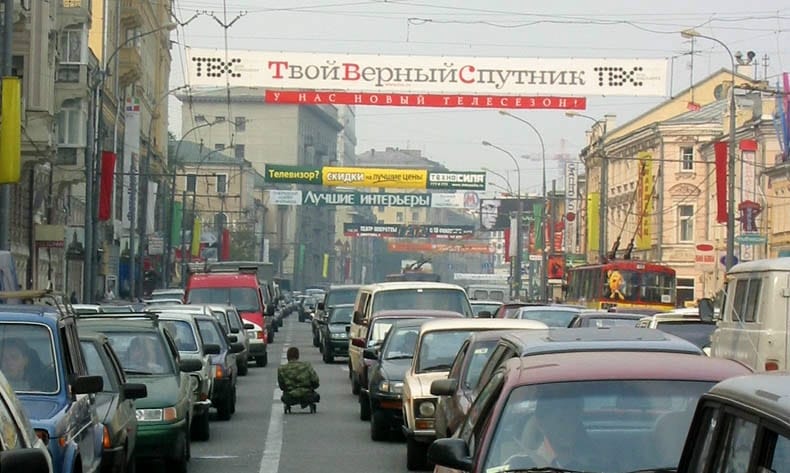
Indeed, TVS won the contest for the sixth frequency TV channel, where the now-liquidated TV-6 had previously broadcasted. Its shareholders were a group of high-powered businessmen—Anatoly Chubais, Oleg Deripaska, Roman Abramovich, and others (through a company called Channel Six), as well as the journalists from TV-6 (through the not-for-profit partnership Media-Society).
From the time it started broadcasting, the channel took a critical position of the authorities and supported the Union of Right Forces political party—actions that raised dissatisfaction among shareholders. The channel soon faced serious financial and personnel problems. Disagreements arose among both shareholders and journalists. By the beginning of June 2003, the cable operator Mostelekom started disconnecting the channel because of TVS’s debts. On June 22, 2003, the channel stopped broadcasting due to a lack of agreement among investors and a lack of funding.
However, the changes faced heavy criticism from experts. As a result of this, the concepts of “objective truth” and “people’s juries,” which were traditionally present in Russian criminal procedures, were excluded from the new law.
With the collapse of the USSR, many extremist, nationalist, and fascist organizations and media outlets emerged in Russia. The law on countering extremist activity was adopted to address this problem. However, the wording of the law turned out to be generalizing and vague, allowing it to be applied to any critics of the authorities—for example, it could be used against the independent press.
Difficult negotiations continued over the course of three days, while leading journalists, public figures, and artists came to meet with the terrorists. During this time, several dozen hostages (mostly children) were released, several hostages managed to escape, and about 20 were shot. The whole time, hostages went practically without any water, food, or personal hygiene products.
On the morning of October 26, the special service released sleeping gas into the theater, after which they began to storm the building. An hour and a half later, the FSB reported that the theater was under their control and that the terrorists were killed. At the same time, the rescue services began to withdraw the hostages, most of whom had fallen unconscious under the influence of the gas. They were loaded into buses and taken to nearby hospitals.
According to official accounts, 130 people were killed during the terrorist attack, 67 of them in the theater itself. The actions of the authorities during and after the assault were sharply criticized: many of the hostages that died were crushed or suffocated during the evacuation, and hospitals were not prepared to accept the influx of victims.
Vladimir Putin personally ordered the storming of the building, and a year after the tragedy, he announced that no one was killed “as a result of the gas,” but rather that some people were victims of “a number of circumstances: dehydration, chronic illness, and the very fact that they were forced to stay in the building.” Despite the fact that the authorities have repeatedly said the gas (fentanyl) was harmless, its exact composition was classified.
In 2012, the European Court of Human Rights, having considered the class-action lawsuit of the Nord-Ost hostages, concluded that the use of the gas in combination with the ineffective rescue operation were the main reasons for hostage deaths. The court also noted that the Russian investigation did not look into the obvious negligence of officials in charge of coordinating the hostage rescue mission.
Shamil Basayev took responsibility for organizing this terrorist attack. According to the media, it was “one of the biggest victories for separatists in the second Chechen campaign.”
After passage of a law aimed at reforming monopolies in the energy sector, Anatoly Chubais led the reorganization of the Unified Energy Systems (UES), a company founded in 1992 that supplied nearly all of the electricity in the country. Authorities broke up the company’s vertically integrated structure—and its electricity grid, distribution, and transmission capabilities remained under state control while power generation and sales were privatized. UES was dissolved in 2008.
By some estimates, the results of the reform were far from perfect: the so-called problem of “unreasonably high prices” for consumers, a lack of transparency, and an absence of incentives for competition or price reduction remained.
Shortly thereafter, Yushenkov was himself removed from his post by the party he had called “the only bastion of democracy in Russia.” Berezovsky was reinstated and Mikhail Kodanev was appointed as cochairman to replace Yushenkov.
It was Kodanev who would eventually be tried and convicted of organizing Yushenkov’s murder. Berezovsky defended Kodanev’s innocence and suggested that his prosecution was being used to damage Liberal Russia. According to Alexander Litvinenko, a former FSB lieutenant colonel, Yushenkov was killed because he had received information from Litvinenko implicating the FSB in the 2002 Nord-Ost hostage crisis in Moscow. In 2006, Litvinenko was fatally poisoned with a radioactive isotope, polonium-210, in London.
While trying to make their way onto an airfield in Tushino, in northern Moscow, where a rock festival had brought together 40,000 people, two female suicide bombers set off their explosives. Eighteen people died and more than 50 were injured. Authorities said the attack was connected to Vladimir Putin’s decree, signed a day earlier, announcing a presidential election in the Chechen Republic.
Dmitri Kozak, deputy head of the presidential administration, was tasked with carrying out the first phase (to take place in 2003–2005) of administrative reforms aimed at increasing the efficacy of the federal government. According to Aleksei Kudrin, head of the Ministry of Finance, the reforms were meant to transform the heads of nine ministries into “leading managers of the country,” called upon to “develop rules for regulating the economy.”
A truck filled with explosives blew up near a military hospital in Mozdok, killing 52 people and injuring 80. The leader of Chechen forces, Shamil Basayev, claimed responsibility for the terrorist attack. Minister of Defense Sergei Ivanov accused local authorities of negligence and failure to comply with military orders given specifically with regard to the security of Mozdok.
In 2019, Andrey Kortunov, head of the Russian International Affairs Council, said that initial hopes about this development—that “former students who participated in joint program with European universities would see Europe, the world, and Russia’s place in the world, in a new way”—turned out to be a fantasy.
The February 19, 2003, meeting at the Kremlin where Khodorkosvky raised the issue corruption with Putin, is considered one of the triggers for the Yukos affair.
There were many reasons for the prosecution, including: the Kremlin’s efforts to nationalize Yukos, Khodorkovsky’s financing of opposition parties, and Putin’s personal enmity toward the company and its management. Specific events in 2003 motivated the Kremlin as well.
First, in April 2003, Yukos announced its merger with Sibneft (controlled at the time by Roman Abramovich) and was negotiating the sale of a majority stake in the combined company to ChevronTexaco and ExxonMobil (two major American oil companies). Second, parliamentary elections, scheduled for December 2003, were coming up and the pro-Kremlin party United Russia needed to gain a legislative majority in order to continue the Kremlin’s mission of consolidating political power.
The Yukos case began on July 2 with the detention of Platon Lebedev, head of Menatep, the largest shareholder of Yukos stock. Lebedev and Khodorkovsky would eventually be charged with fraud, tax evasion, and other crimes (seven criminal charges in total). The court case began in Moscow on June 16, 2004, and both businessmen entered pleas of not guilty. On March 25, 2005, the prosecutor asked the court to sentence both men to 10 years in a penal colony. In May 2005, Khodorkovsky was sentenced to nine years, which was later reduced to eight.
At the same time, Russia’s tax authorities accused Yukos of evading taxes from 2000 to 2003. The government claimed that the company owed $18.4 billion. This amount exceeded the company’s revenue for the same period of time. In May 2004, the Federal Tax Service won a suit to recover lost taxes from Yukos. In an effort to save the company, shareholders offered to pay the tax debt by selling the government the 34.5 percent stake in Sibneft that it had received as part of the merger deal. The presiding court instead ordered the sale of Yuganskneftegaz, a key production subsidiary of Yukos.
Despite a declaration by Putin that the government was not interested in ruining the company, Yukos’ bankruptcy processes was led by the state-owned company Rosneft, which was managed by Igor Sechin, a Putin associate. In December 2004, Yuganskneftegaz was sold for $9.35 billion to a little-known company, Baikal Finance Group, which was itself bought days later by Rosneft for 10,000 rubles. On August 1, 2006, Yukos declared bankruptcy. It ceased operations in November 2007.
A powerful blast ripped the second car of a commuter train (on route from Kislovodsk to Mineralnye Vody in the southern region of Stavropol) in half, killing 41 people and injuring 200. According to officials, an investigation uncovered the explosion as a terrorist attack by Chechen rebels aimed to “destabilize the population” on the eve of the parliamentary elections.
United Russia received 37.6% of the vote, winning 120 party seats and 103 individual districts. The Communist Party received 12.6% of the vote, and thus 40 party seats and 12 individual districts. The Liberal Democratic Party received 11.5%, giving it just 36 party seats. And a brand new party, Rodina, with roots in nationalistic political movements, won a significant share of the vote, 9%, which gave them 29 party seats and eight individual districts. By contrast, the Union of Right Forces and Yabloko—the two main opposition parties—failed to meet the threshold and lost their foothold in the country’s parliament.
Surging oil prices throughout the second half of the 1990s led to an increase in the surplus of Russia’s budget (300 billion rubles in 2000, 397 billion in 2001). In 2001, the decision was made to establish a reserve akin to Norway’s oil fund. The fund was supposed to be used for microeconomic stabilization in “less favorable years” and to address strategic tasks. By January 1, 2008, the fund’s reserves reached 3.849 trillion rubles ($156.8 billion).
In response, Moscow threatened to raise the price of Russian gas for Minsk from $30 to $50 per thousand cubic meters (global prices at that time were $110-120). According to Gazprom, the company lost $500 million annually on preferential supplies to Belarus. In response to Lukashenko’s rejection of the new conditions, Moscow issued an ultimatum: a price rise or an end to deliveries.
On January 1, Gazprom turned off the taps. Up until January 24, Belarus made use of its gas reserves and, according to some reports, siphoned off transit gas bound for Europe. The gas war continued until February 18, when Moscow cut off all gas supplies through the territory of Belarus, which impacted consumers in Lithuania, Poland, and Kaliningrad. On February 19, Lukashenko agreed to purchase Russian gas at the price of $46.68 per thousand cubic meters.
The Moscow subway is an attractive target for terrorists. This latest suicide bombing was the largest to date: according to official figures, 42 people were killed, including the terrorist, and approximately 250 were injured.
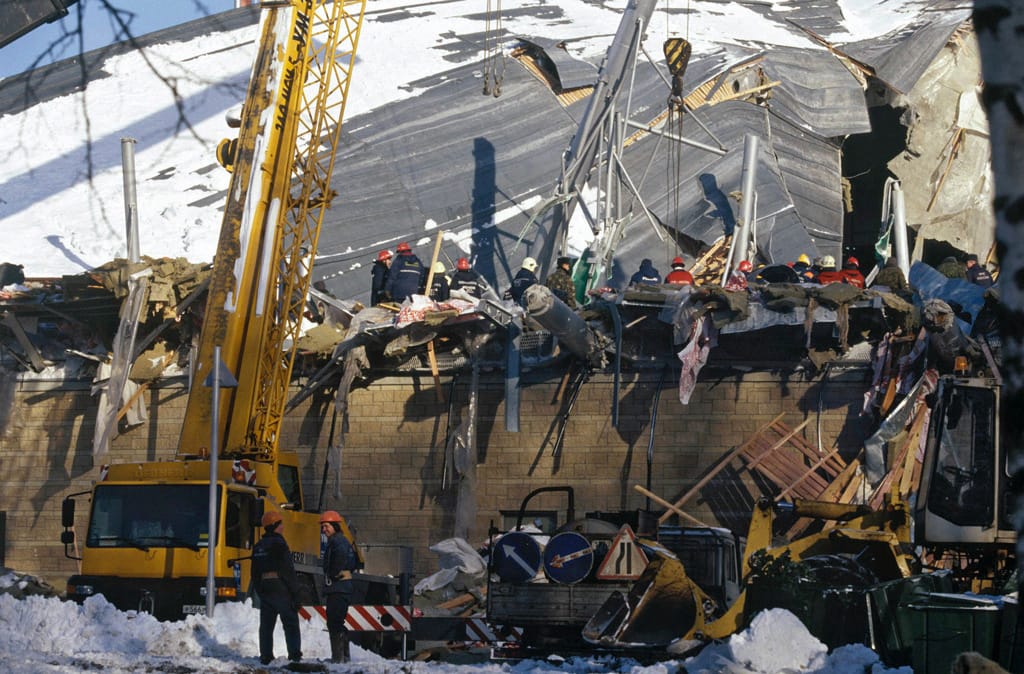
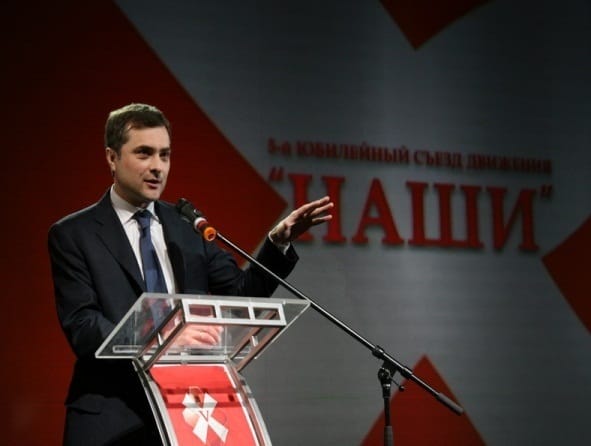
Nashi (“Ours”) was conceived as a replacement for Surkov’s previous pet project Idushiye vmyestye (“Walking Together”), retaining its chief ideologist Vasily Yakemenko. The movement was officially launched on March 1.
On paper, the aim was to instill a sense of patriotism in young people, but in reality the main goals were to mobilize Russian youth in support of the authorities, raise a new generation of loyalists, and pre-empt a “color revolution” in Russia.
By 2008, Nashi’s overly aggressive patriotism had begun to displease the Kremlin. The movement was reorganized, and by 2010 had ceased to exist.
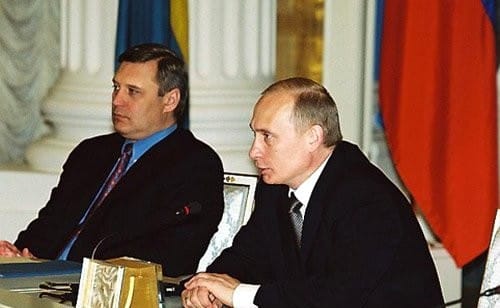
The fire that engulfed the 1817 Manezh exhibition hall was called the biggest in Moscow in a century.
On the very same day that Putin was reelected for a second presidential term, a fire devastated the historic Manezh building in central Moscow, right opposite the Kremlin, which many commentators saw as an ill omen.
The concept of sovereign democracy was first articulated by presidential administration deputy head Vladislav Surkov at a United Russia event. He later encapsulated the concept of sovereign democracy as “autocracy of the people” and “the rule of free individuals.” Surkov’s ideas sparked heated public debate and largely determined the political discourse of Putin’s second term in office.
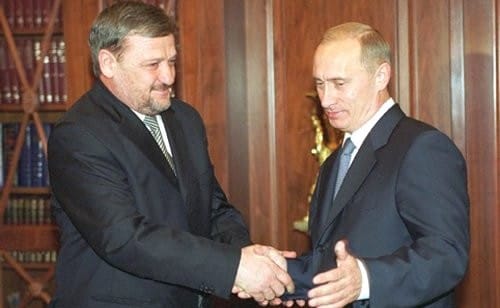
The assassination of Akhmad Kadyrov effectively decapitated Chechnya. Putin, who had handpicked him in 2000 to restore order in the rebellious republic, faced the pressing issue of finding of a successor. One of the candidates was the aforementioned Ramzan Kadyrov. However, at that time he was 28 years old, while the minimum age for the office of head of the republic was 30. As a result, the presidency went to Chechen Interior Minister Alu Alkhanov.
Nevertheless, on May 10, after a personal meeting with Putin, Ramzan’s political career was set in motion. First he took charge of the law enforcement agencies, then headed the Chechen government; finally, on March 2, 2007, immediately after Putin's nomination of Kadyrov was submitted to the Chechen parliament, he was elected president of Chechnya.
The fighting in Ingushetia ended on the morning of June 22. Around a hundred people were left dead. Yet some important questions remained unanswered: who had organized the attack (none of the attackers was ever detained) and why? According to one theory, the capture of Ingushetia was not part of the militants’ plans—instead, the operation was allegedly intended to unmask pro-Kremlin collaborators inside their Ingush networks.
In 2004, Klebnikov launched and headed the Russian version of Forbes in Moscow. On July 9, he was shot when entering the editorial office and died later in the hospital. His murder caused public outcry around the world.
According to the official investigation, the hit was ordered by Noukhayev and executed by accomplices from Chechnya. On May 5, 2006, a jury acquitted the defendants in a closed trial. And although a retrial was later scheduled, by then the accused had disappeared. Like many other high-profile contract killings in Russia, the Klebnikov case remains unsolved.
Two passenger aircraft flying from Moscow’s Domodedovo International Airport crashed in the Rostov and Tula regions, killing 90 people. The ensuing investigation found that female suicide bombers (known as “black widows”) had detonated explosive devices on board the planes. The finger of suspicion was pointed at Chechen field commanders Shamil Basayev and Achemez Gochiyayev.
Media reported that the official inquiry had excluded negligence on the part of airport security, focusing instead on finding and punishing scapegoats, which is what happened. Three years after the tragedy, the Prosecutor General’s Office acknowledged that the investigation was effectively closed.
The Arab terrorist group Istambuli Brigade (known to be part of al-Qaeda) claimed responsibility for the attack, having announced a week earlier that it had also masterminded the terror attacks on the two Russian aircraft. However, some experts considered the real culprits to be al-Qaeda-affiliated Chechen fighters using the group’s name.
In September 2019, on the occasion of the 15th anniversary of the Beslan tragedy, journalist and vlogger Yuri Dud released the documentary film Beslan. Remember; it was watched by about 20 million people.
The terrorists’ main demands were the withdrawal of Russian troops from Chechnya, recognition of the republic’s independence, and the resignation of Putin. Putin later asserted that the terrorists had not issued any demands. What’s more, the first official statements falsely put the number of hostages at 354.
The negotiations, which took place in swelteringly hot conditions, were hampered by the terrorists’ brutal attitude—the hostages were denied food and water, and shot if they tried to escape as a deterrent to others, their bodies then thrown out the window into the school yard; bombs were planted around the school, with some accidental explosions. The terrorists communicated by telephone and allowed only one person into the building — the former president of Ingushetia, Ruslan Aushev, who managed to secure the release of 11 women and 15 breastfeeding infants. In the evening that same day, through his representative Akhmed Zakayev, Maskhadov announced that he was ready to mediate in the negotiations with the militants.
On the third day of negotiations, the Russian authorities took the decision to storm the building. The operation to clear the school lasted several hours and resulted in numerous casualties among both hostages and special forces, as well as members of the public who had gathered outside the school to help save the children. During the assault, the use of flamethrowers caused a fire to start inside the school, and the building partially collapsed due to explosions.
According to official figures, 334 people were killed, including 186 children; more than 800 were injured. Beslan remains the largest terror attack in Russian history by number of victims.
As independent journalists reported from the scene, it was clear almost from the very beginning that the authorities had no intention of complying with the terrorists’ demands, which meant that the hostages were doomed. But this was not voiced out loud. All central TV stations received strict instructions from senior management on how to cover the attack, which included not telling the whole truth.
All but one of the terrorists were killed during the storming of the school. In 2006, the sole survivor was sentenced to life imprisonment.
The investigation into the Beslan terror attack unearthed many scandals along the way, and remains open to this day. In 2017, the European Court of Human Rights upheld a lawsuit filed by the “Mothers of Beslan” support and advocacy group against the Russian state seeking compensation for moral damages caused by the authorities’ failure to protect victims, conduct a full investigation, and identify the real perpetrators. The Kremlin described the decision as unacceptable.
On September 4, Putin flew to Beslan and announced measures to “strengthen the unity of the country” and take control of the situation in the North Caucasus. On March 8, 2005, Aslan Maskhadov was killed in the Chechen locality of Tolstoy-Yurt. Shamil Basayev died in a blast when riding in a truck on the night of July 10, 2006, in the Nazran district of Ingushetia. Both Chechen separatists were eliminated in FSB special ops, for which service chief Nikolay Patrushev took responsibility.
In a dissenting opinion on the proposed amendments to the law, Vladimir Yaroslavtsev, a Constitutional Court judge, noted: “The outwardly ‘democratic’ ornateness of the new procedure for delegating top officials in constituent entities of the Russian Federation cannot conceal the fact that the main purpose is to sever the people from freely electing such officials, which directly contradicts the principle of popular sovereignty...”
The amendments to the federal laws in question were adopted by the State Duma in December 2004. A protest in central Moscow against the “unconstitutional” political reform drew around 200 people.
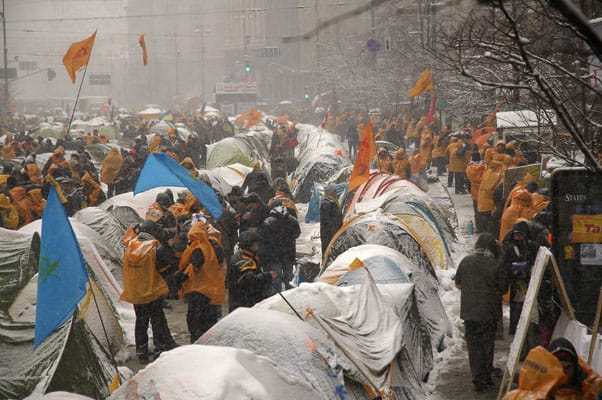
The capital’s Maidan Nezalezhnosti (Independence Square) turned into a sea of orange—the color of Yushchenko’s campaign. Approximately 100-150,000 people, as well as all members of the opposition, including Yulia Tymoshenko (of the Yulia Tymoshenko Bloc) and Oleksandr Moroz (of the Socialist Party of Ukraine), attended the mass rally in Kyiv. Yushchenko (his face scarred by the effects of poison or, according to Russia, “bad sushi”) demanded an emergency meeting of the Verkhovna Rada (Ukraine’s parliament) to resolve the political crisis.
International observers reported electoral irregularities, and the results of the second round were not recognized by either the European Union or the United States. Russia, for its part, did acknowledge the result: Yanukovych was openly supported by Putin, who had twice visited Ukraine during the election campaign and phoned him first on November 22 and again on November 24 to congratulate him on his seeming victory.
On November 26, Yushchenko and Yanukovych met for talks, brokered by the leaders of Poland and Lithuania, as well as representatives of the EU, OSCE, and Russia, but without result. The next day, an emergency session of the Verkhovna Rada declared the second-round results void. Meanwhile, in Severodonetsk (Lugansk region), supporters of Yanukovych held a congress of local leaders and demanded the creation of the so-called South-East Ukrainian Autonomous Republic together with far-ranging powers. Observers warned that the country could split in two.
On December 2, the outgoing president of Ukraine, Leonid Kuchma, paid a blitz visit to Moscow for talks with Putin, where both leaders agreed on the need to rehold the second-round ballot. Moscow also demanded an active role in resolving the Ukrainian political crisis. Acting as per the agreement struck with Moscow, at a meeting with the Ukrainian opposition, Kuchma put forward the idea of a constitutional reform that would transform Ukraine into a parliamentary republic.
On December 3, the Supreme Court of Ukraine annuled the results of the second round and scheduled a repeat election for December 26. During this period, the opposition managed to come to an agreement with Kuchma on the conditions for reform, and corresponding amendments were adopted by the Rada; as a result, presidential power in Ukraine was curbed. This time, in the now third round, Yushchenko won with 52% of the vote against Yanukovych’s 44.2%. On January 23, 2005, Yushchenko officially became president of Ukraine. And on the very next day, he made his first trip abroad—to Russia.
Beginning on January 10 (after the New Year’s holidays), hundreds of pensioners in dozens of cities across Russia started going out to rallies and pickets demanding the return of benefits, an increase in pensions, and the resignation of the government and the president. Road closures became a widespread instrument of protest. On January 21, the largest protest occurred in Barnaul, where ten thousand people gathered.
The reform failed, and the politicization of the protests took the Kremlin by surprise. In February, Vladimir Putin’s approval rating fell to a historic low (at that time) of 41 percent, and the rating of the pro-Kremlin United Russia party declined to 6 percent. To stabilize the situation, an additional 200 billion rubles ($63 billion) were allocated from the federal budget (the same amount was originally allocated for monetization). During the same period, United Russia began to hold parallel rallies—in support of government initiatives.
According to media experts, the purchase of Izvestia had a political component to it and was the Kremlin’s next step in “cleaning up” the media landscape. In September 2004, the editor in chief of the paper, Raf Shakirov, was fired for coverage of the school attack in Beslan.
The first Russian television network broadcasting in English was founded by RIA Novosti, the state information agency, with a goal of cultivating a positive image of Russia abroad.
Presidential aide Aleksei Gromov and the late Mikhail Lesin, former press minister, were appointed as the Kremlin’s curators overseeing the project. Margarita Simonyan, 25, a reporter with Rossiya, a state-owned TV channel, who had been accredited with the presidential press pool, was named as editor-in-chief.
Putin also raised the problem of foreign funding of Russian NGOs in a May 2004 address to the Federal Assembly, stating that many organizations are focused on “serving dubious commercial interests.” In December of the same year, Putin addressed George Soros, head of the Open Society Foundation, accusing him of funding the new government of Georgia. (Soros left Russia in 2003 after 15 years of work.)
The law entailed an increase in the electoral threshold for political parties (from 5 percent to 7 percent), the abolition of the minimal turnout threshold and voting “against all” candidates, the abandonment of the majority system and voting based on single-member districts, and a ban on consolidating electoral blocs. As noted in a report from the Moscow Helsinki Group, “this law has made another deep revision in electoral rights—not only at the federal level but on all levels. Its goal is clearly to prevent the overhaul of the authorities and prevent any political parties, new politicians and independent candidates from infiltrating its ranks.”
The law envisioned the transfer of a number of powers from regional to local governments throughout Russia’s territory (except Ingushetia and Chechnya, whose borders had not been defined then). Twenty-five thousand municipal entities—rural and urban settlements, urban districts, and rural regions—were created. Handling of issues such as communication services, trade, garbage collection, urban improvement, also transferred to the local level. Another crucial development was the establishment of regional councils for the municipal entities, as well as the nationwide Association of the Municipal Entities. According to the media, the main goal of the law was to build municipal components of the “power vertical.”
On January 1, Russia shut down gas supplies and blamed Ukraine—part of Gazprom’s gas transit system—for potential shortages in Europe. On January 2, gas supplies in Austria dropped by one-third, in Hungary and Slovakia by 40 percent, and in Poland by 14 percent. Moscow accused Kyiv of illicit gas intakes from the transit pipelines, as the European Union called for the two countries to negotiate.
On January 4, Gazprom and Naftogaz agreed on a compromising price of $95 per thousand cubic meters. The deal became possible due to the mixing of the highly priced Russian gas with cheaper gas from Turkmenistan (priced at $65 per thousand cubic meters). Gazprom and a trader company called RosUkrEnergo (in which Gazprombank owned a 50 percent stake) also reached a deal on transit at prices at $230, Gazprom’s original requested rate.
Responding to a reprimand from US Secretary of State Condoleezza Rice that such behavior was an “ironic and not good” start to Russia’s G8 presidency, Russia’s Ministry of Foreign Affairs retorted that gas supply is the bilateral issue of concern only to Russia and Ukraine. Following the shortages, the European Union proposed that all member countries should establish two-month gas reserves.
On January 10, Ukraine’s parliament, the Verkhovna Rada, voted for the government’s resignation, casting a sudden political blow to President Viktor Yushchenko. It was the opposition’s way to show its discontent over the deal with the Kremlin.
However, investigators excluded terrorism as their main interest, focusing instead on intentional property damage.
These events unfolded as temperatures dropped dramatically—and a chill fell over Moscow’s relationships with neighboring governments. Georgia’s president, Mikheil Saakashvili, accused Russia of instigating an energy crisis in his country. Other Georgian politicians drew a connection between what they called an “energy blockade” to Tbilisi’s call for a withdrawal of Russia peacekeepers from the South Ossetia region. The Russian Foreign Ministry dismissed these statements as “hysteria and mayhem.”
Within a week, gas and electricity supplies were restored, but Georgia announced that it would limit gas imports from Russia in favor of Iran and Azerbaijan.
In his annual address to the Federal Assembly, for the first time Vladimir Putin dedicated the majority of his time to the issues of army modernization, armaments buildup, national security, and foreign policy. Having lamented that Russia’s military expenditures were two to three times smaller than those of France and Germany, and were dwarfed by those of the US by the factor of 25, the Russian president declared a new course for the country aimed at building its own “fortress.” “Our response must be based on intellectual superiority. It will be asymmetrical, less costly, but it will increase [the] reliability and efficiency of our nuclear triad,” Putin said.
According to analysts, the speech sent several messages, especially that Russia was entering a new arms race with western powers and that it intended to build up its security architecture regardless of criticism from its adversaries about threats to domestic democracy and freedom.
On September 1, about thirty thousand people—nearly the entire population of the town—attended the funeral of the victims. On the following day, two thousand people gathered by the town hall demanding that the local authorities deport all immigrants from the North Caucasus within 24 hours. Rallies and riots ensued. When the regional leader of Karelia attempted to portray this conflict in the media as a “domestic brawl,” protests intensified.
To take control of the situation, special police forces were transferred to the town and about 60 Chechens were evacuated. Ethnic tensions became a recurring problem, and local residents complained that these temporary measures would not help solve anything, as the police were supine. The Kremlin placed responsibility for the outburst on local law enforcement agencies, dismissing a few people.
A few days after the fight, several suspects in the murder case were arrested. The investigation and the trial took four years. None of the six defendants admitted guilt. On April 1, 2010, Karelia’s supreme court sentenced them to prison terms, ranging from three to 22 years.
Mozgalyov and Pliyev were also arrested for causing riots; they were given prison sentences of thirty-six months and eight months, respectively.
In the public discourse, the work “Kondopoga” has become closely associated with ethnic conflicts it Russia.
Andrei Kozlov, the first deputy chair of Russia’s central bank, died as a result of a gunshot wound to the head.
Charged with heading up banking oversight, he had led a fight for transparency in the business and was known for using harsh measures, such as revoking licenses. On September 8, he had announced he would introduce a new measure: personal responsibility for bankers who participate in money laundering.
In January 2007, banker Aleksei Frenkel was detained on suspicion of ordering Kozlov’s murder. Frenkel ran a business that was said to be in the gray zone “between legal and criminal.” It was also reported that in 2006 Frenkel had been planning a high-profile expose of corruption in bank oversight by publishing reports that had been linked to the work of state security agencies.
In November 2008, Frenkel was found guilty of Kozlov’s murder and sentenced to 19 years in prison. In August 2019, he claimed that the first deputy head of the FSB, Sergei Smirnov, had also been involved in the crime.
In February 2006, Boris Berezovsky sold the Kommersant publishing house (home of the Kommersant newspaper) and other assets to his friend and partner Badri Patarkatsishvili. Within six months Kommersant was acquired by Alisher Usmanov, owner of Metalloinvest. One market player observed that Usmanov was a “convenient buyer for the government,” and that “now Kommersant will cease being an opposition publication.” Patarkatsishvili confirmed this indirectly by noting that the selling price included a political premium.
During Usmanov’s tenure, political pressure on Kommersant’s editorial team resulted in high-profile resignations. In 2011, following an article on election-rigging, the editor of Vlast (the newspaper’s magazine) was forced to resign. In 2015, Andrey Konyakhin, editor of Kommersant’s website, was removed for publishing the transcript of an interview with opposition politician Aleksei Navalny. In 2019, two correspondents were fired over an article they had written about Valentina Matviyenko, chair of the upper house of Russia’s Federal Assembly. This triggered the resignations of the entire political-reporting desk in solidarity.
In September, speaking at the UN General Assembly, Georgian president Mikheil Saakashvili demanded the withdrawal of Russian peacekeeping troops from both Abkhazia and Georgia. That same month, Saakashvili received assurances from NATO about Georgia’s potential membership in the alliance.
At the end of September, Georgian authorities arrested four officers of the GRU (Russian military intelligence), along with 11 Georgian citizens allegedly recruited by Russian intelligence, on suspicion of espionage and the organization of the 2005 terrorist attacks. To back up its allegations, the Georgian government released footage of the suspects confessing to spying for Russia.
Calling Georgia’s accusations “marasmic,” Moscow recalled the Russian ambassador from Tbilisi and started to evacuate embassy personnel—steps that often precede military action. On October 2, Putin accused western nations of supporting Georgian policies, alleging that the United States was the real mastermind of the developing crisis. Next, Russia began to deport Georgian citizens.
Following negotiations mediated by the Organization for Security and Cooperation in Europe (OSCE), Georgia agreed to work with Russia and handed over the arrested spies. Tbilisi also allowed Russian peacekeeping troops to patrol Kodori Gorge. But Russia continued to escalate the conflict by cutting off all transportation links with Georgia “to bring Georgian leadership to [their] senses.” According to the Russian foreign minister, Sergey Lavrov, “Georgian leadership must understand that it cannot insult Russia while thousands [of] Georgian citizens work here and feed their families.”
In mid-October South Ossetia and then Abkhazia requested that Russia recognized their independence and established associated relations with Moscow. On November 12, South Ossetia held a referendum, which, with an almost 100 percent turnout, showed an overwhelming support for independence. Georgia declared the vote illegitimate. Simultaneously, an alternative vote, backed by Tbilisi, took place in the region, with a large part of the population allegedly participating as well. According to the results, South Ossetians voted for staying within Georgia. Thus the actions of Russian and Georgian authorities essentially turned the South Ossetian voting into a sham.
A month later, at an OSCE meeting in Brussels where the issue of the “frozen conflicts” came up, Russia proposed a compromise: formally, Abkhazia and South Ossetia would remain part of Georgia, as a confederation, but for all practical purposes they would become independent.
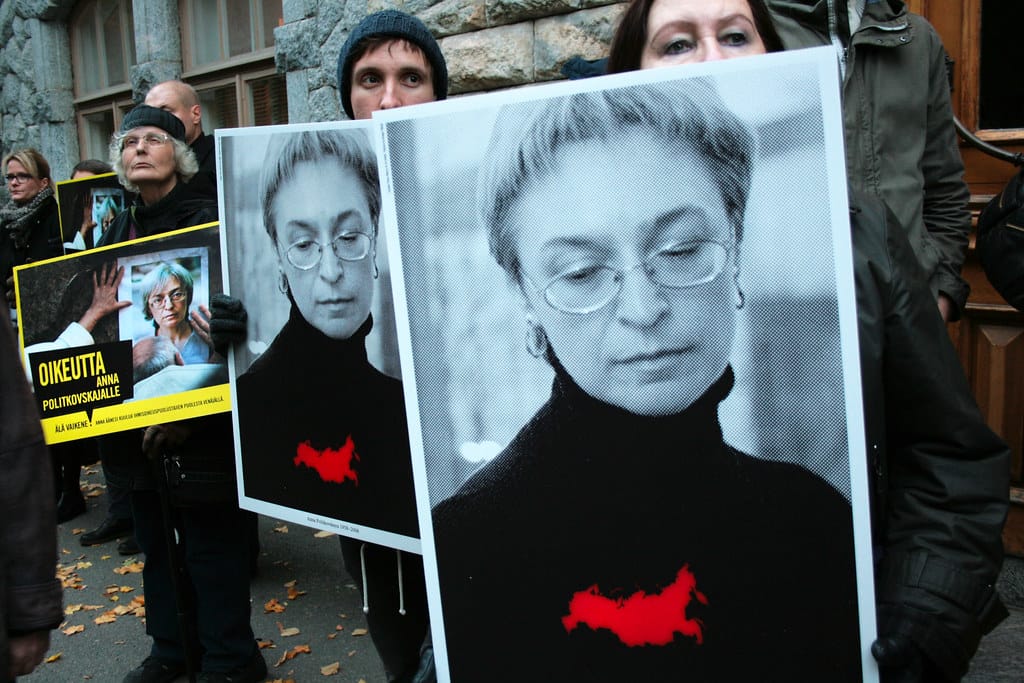
On October 7, Politkovskaya was killed at the entrance of her apartment building in Moscow. According to a Novaya Gazeta editorial, she “was killed by those who feared being exposed by her and who knew she was incorruptible and that only a bullet could stop her.”
Over the last 13 years, despite four trials, Politkovskaya’s case—like many other high-profile political assassinations—remains unsolved.
During the first year of investigation, about ten suspects were arrested; by 2008, Russia’s prosecutor general, Yuri Chaika, reported that the killers, organizers, and masterminds of this crime had been identified. In his words, these masterminds had acted from abroad (alleging that one of them was an exiled Russian businessman Boris Berezovsky) with the goal of destabilizing Russia, and had also been behind the assassinations of the journalist Paul Klebnikov and Andrey Kozlov, a government official charged with cleaning up the banking business.
The first trial ended in February 2009. Four defendants—brothers Dzhabrail and Ibrahim Makhmudov (according to the prosecution, they followed the victim, while a third brother, Rustam, a wanted man, was the shooter), former police officer Sergei Khadzhikurbanov (an alleged organizer of the hit), and former FSB officer Pavel Ryaguzov (accused of handing over the information on Politkovskaya to the killers)—were found not guilty by the jury. The prosecutor general’s office appealed the verdict, which was reversed. Eventually, the case was remitted for further investigation.
In 2001, Rustam Makhmudov and another suspect, Dmitri Pavlyuchenkov (a former police lieutenant colonel who had previously been a witness in this case), were arrested. The prosecution also named a Chechen native, Lom-Ali Gaitukayev, who was already serving time for a different crime, as the organizer of the killing.
Pavlyuchenkov pleaded guilty and struck a deal with the prosecution, which resulted in his case being separated from other defendants and heard according to a special procedure. In December 2012, he was sentenced to 11 years in a high-security prison.
The trial of the remaining defendants dragged on slowly. In November 2013, the jury had to be dismissed. A third trial began in January 2014. On May 27, 2014, all the defendants—the three Makhmudov brothers, Gaitukayev, and Khadzhikurbanov—were found guilty and sentenced to lengthy prison terms, ranging from 14 to 20 years. None of them admitted guilt.
The case focused on the masterminding of the killing was separated as well, but over the last five years, according to Novaya Gazeta, nothing has been done. In one of her interviews, Politkovskaya’s daughter, Vera, said, “the mastermind of my mom’s killing will not be named until [there is] regime change in Russia.”
In the UK, Litvinenko started working for MI-6 (Britain’s foreign intelligence service) and consulted with Spanish intelligence on Russian mafia cases. Berezovsky, who emigrated to London soon after Litvinenko, supported him financially.
On November 1, at the Millennium Hotel in London, Litvinenko met with his business partner Andrei Lugovoi, who ran a security firm back in Russia and had ties to Russian intelligence. Soon after the meeting, Litvinenko fell sick and was brought to a hospital where doctors initially diagnosed him with thallium poisoning. One day before this death it was revealed that in fact he had been poisoned with a radioactive isotope, polonium-210.
Scotland Yard took charge of the investigation into Litvinenko’s death, and the case became a point of contention in the UK–Russia relationship. In 2016, after nearly a decade, the High Court of London concluded that the FSB had organized the murder. It was also said that the killing had been approved by Nikolai Patrushev, head of the FSB, and, quite probably, by Vladimir Putin himself.
Putin criticized what he saw as the unipolar international system that had emerged, with one power center in Washington, D.C., imposing its legal system onto other countries. But above all, the Russian president was outraged with NATO, noting that as Russia withdrew its peacekeeping troops from Moldova and Georgia as part of the Treaty on Conventional Armed Forces in Europe, “so-called flexible frontline American bases” were being deployed in Bulgaria and Romania.
The consequences of the speech were likely not what Putin had expected. Following the address, U.S. Senator Lindsey Graham said that with just this speech, Putin had done more to unite the United States and Europe than they could have done themselves in a decade.
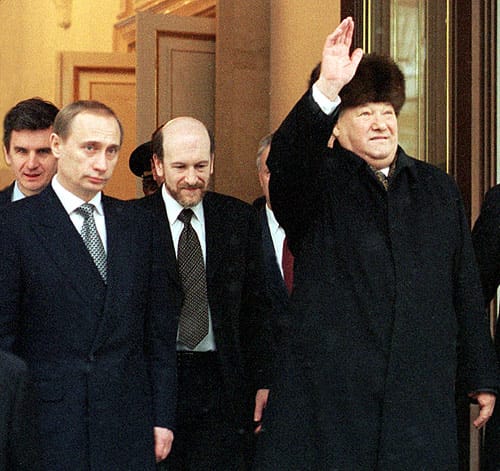
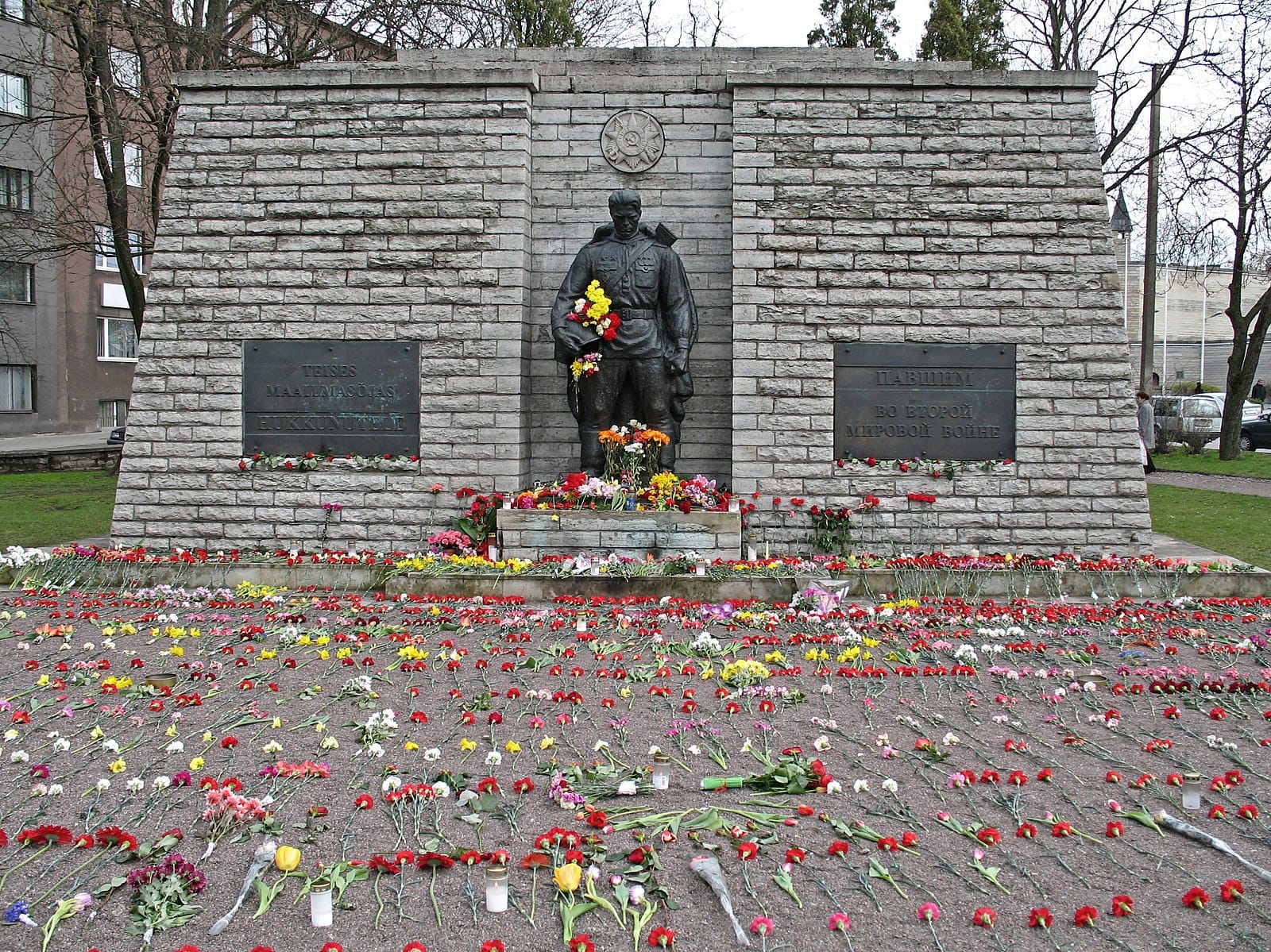
The dismantling began on April 28, eliciting a strong reaction from Russia. Boris Gryzlov, speaker of the State Duma, called Estonia’s actions “bigotry,” and there were calls to break off diplomatic relations. Russian businesses began to impose sanctions against Estonian goods.
From May 1 to 2, riots broke out around the construction site in Tallinn, growing into street fights and resulting in the death of a Russian citizen (later, Estonian law-enforcement agencies were criticized for their harsh actions against a number of protesters). Along with Russian-speaking Estonians, activists from the movement Nashi and other pro-Kremlin groups took part in the riots. Members of these organizations also besieged Estonia’s embassy in Moscow.
The European Union sided with Estonia, accusing Russia of conducting an anti-Estonian campaign and calling for a diplomatic resolution to the situation. The United States and NATO agreed. Not wanting to disrupt a summit with the EU scheduled for May 18 in the Russian city of Samara, leaders in Moscow decided to cool their rhetoric.
The patriarch of the Russian Orthodox Church, Aleksey II, and the first hierarch of the Russian Orthodox Church Abroad signed an Act of Canonical Communion in Moscow, ending an 80-year period of separation for the Russian Church.
The split occurred in 1927 when the church’s acting leader, Metropolitan Sergius, signed a “declaration of loyalty” to the ruling Bolshevik government. The Russian Orthodox Church Abroad refused to do so.
Vladimir Putin’s decree suspending Russia’s participation was signed one month after the failure of an emergency conference in Vienna, where Russia hoped to reach an agreement on ratification. But western countries linked the issue to the pledge Russia made in Istanbul to withdraw troops from Moldova and Georgia.
According to an announcement from Russia’s Ministry of Foreign Affairs, NATO’s demands were “far-fetched” and “did not have anything to do with” the treaty. In December, the moratorium on Russia’s participation came into force.
On March 10, 2015, Russia fully terminated its participation in the treaty, though it formally remains a member.
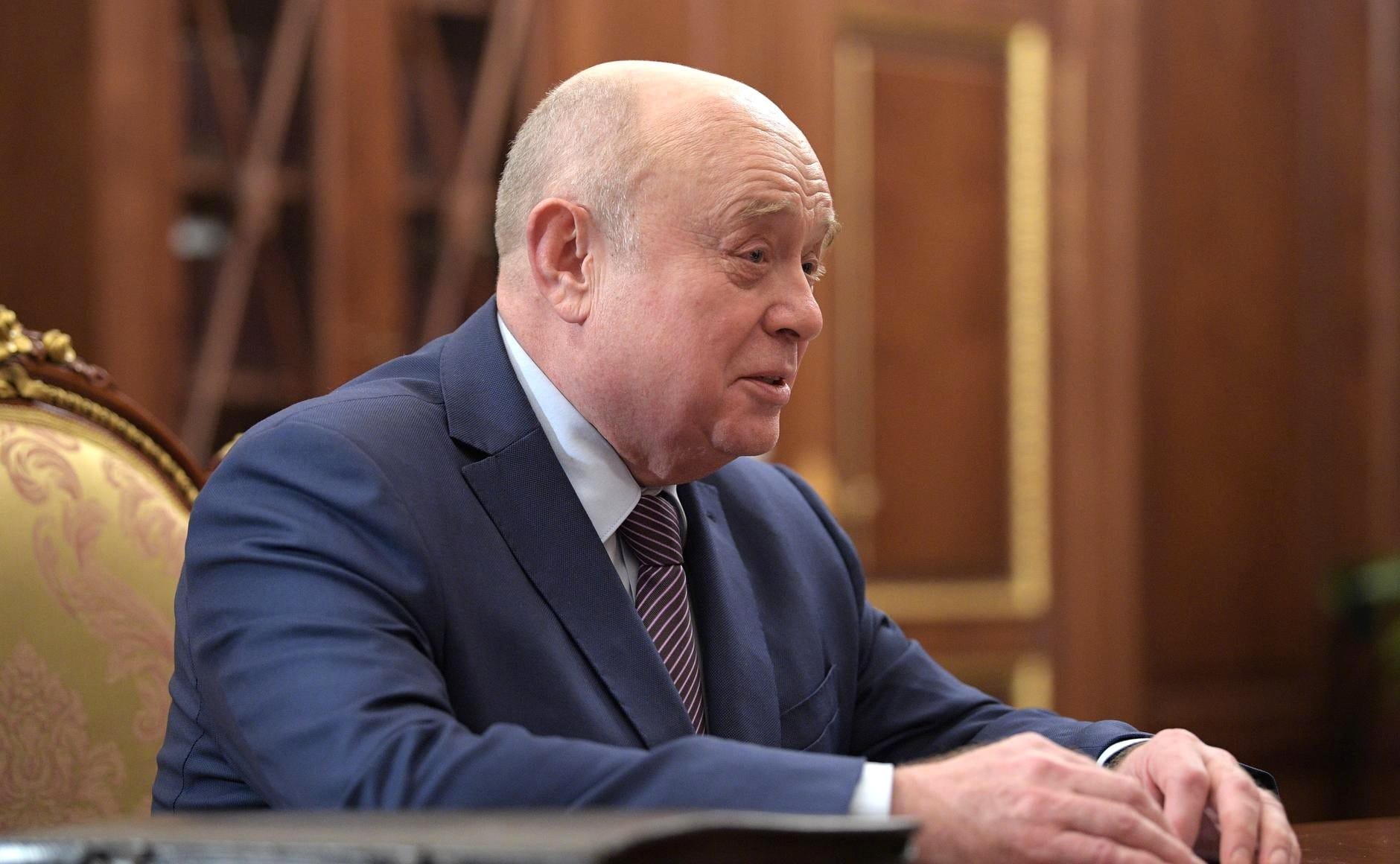
In the first vote held under the new election law, the United Russia party won 64.3 percent of the vote and received a constitutional majority in the Russian parliament. Of the 11 parties contending, only the Communist Party (11.6 percent), the Liberal Democratic Party of Russia (8.1 percent), and A Just Russia (7.7 percent) managed to pass the 7 percent barrier.
At a meeting between Vladimir Putin and leaders of the parties elected to the State Duma, the head of United Russia, Boris Gryzlov, formally proposed to nominate Dmitri Medvedev for president. Putin formally agreed, ending the intrigue of the “successor” question.
On December 17 the United Russia Congress officially nominated Medvedev, who immediately proposed that Putin head the government in the event of his victory. Thus the political tandem was born.
The corresponding resolution was introduced by Senator Richard Lugar, Republican from Indiana and chairman of the Foreign Relations Committee.
Ukraine and NATO began an “intensive dialogue” on integration in April 2005; Georgia’s began in September 2006. The resolution was a response to a formal request, sent by the Ukrainian leadership in January, and also took into account the results of the Georgian referendum on NATO, in which 76.2 percent of voters supported joining the organization.
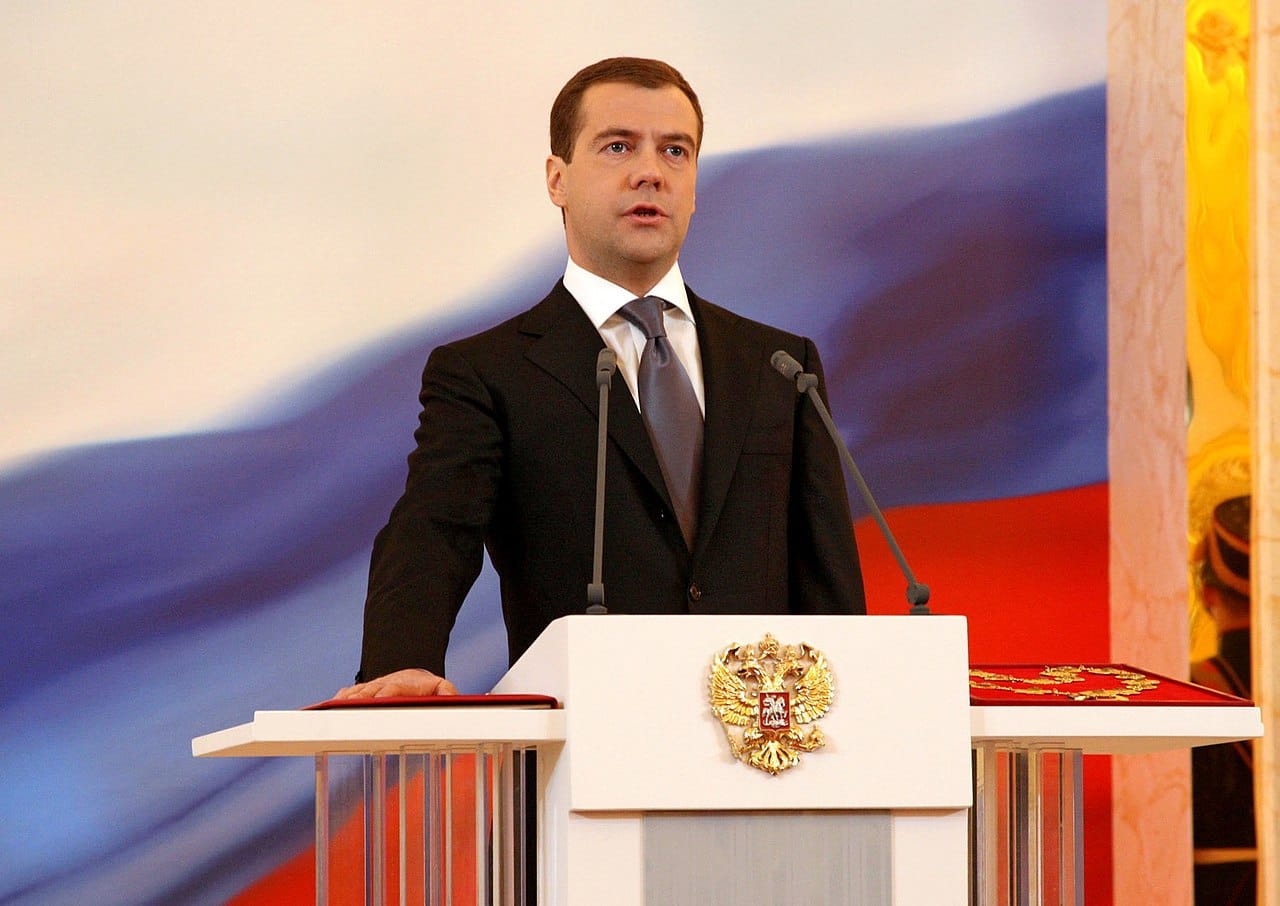
On the night of August 7–8, Georgian forces began shelling the city of Tskhinvali, in South Ossetia, and South Ossetian troops fired back. Georgia announced the forced abandonment of the existing cease-fire agreement, peacekeepers acknowledged a declaration of war, and fighting began on the outskirts of Tskhinvali. By midday, the Georgian government in Tbilisi reported the capture of most of the city, where Russian armored vehicles began entering after a few hours. The Georgian Parliament called on the international community to stop Russian aggression.
The fight continued for several days, essentially destroying Tskhinvali. The Russian air force carried out numerous strikes on strategic targets in Georgia. A group of ships from the Russian Black Sea Fleet was also stationed near the Georgian coast. By May 11, Russian tanks were approaching Tbilisi. At the same time, a second separatist region, Abkhazia, began an operation to drive out Georgian troops from the Kodori Gorge, which was successfully completed by August 13.
On August 12, shortly before French President Nicolas Sarkozy arrived in Moscow on a mediation mission, Medvedev announced the end of Russia’s military operation, noting that “the aggressor has been punished.” On the same day, at a rally of thousands in Tbilisi, Saakashvili declared Georgia’s victory over Russia.
The reaction from the West was unequivocal—unconditional support for Georgia and condemnation of Moscow’s disproportionate activities. US President George W. Bush threatened Russia with international isolation and sent humanitarian aid to Tbilisi.
On August 14, after a discussion with US Secretary of State Condoleezza Rice, Saakashvili signed a plan of international regulation of conflict developed with Sarkozy. But the disagreements between Russia and Georgia persisted regarding the status of South Ossetia and Abkhazia.
On August 26, Russia officially recognized the independence of those two republics, and expressed readiness to establish diplomatic relations with them. On September 2, Georgia severed diplomatic relations with Russia, declaring the regions occupied territories.
As the media noted, the five-day war between Russia and Georgia “set an absolute record for the number of lies that accompany it.” Despite its military victory over Georgia, Russia lost the information war. Grigol Vashadze, Georgia’s deputy foreign minister, summed up the events like this: “Russia will never wash its hands of this. It has not yet forgiven the sins of another state, the USSR. Prague, Budapest, and now us. Russian foreign policy prepared this nightmare well. And then what? They won a small triumphant war. People were killed—it is already a tragedy and now Moscow will reminisce about Project ‘Georgia 2008’ for decades.”
The war with Georgia revealed serious shortcomings in the Russian army—from equipment to reconnaissance and the use of high-precision weapons. The conflict pushed the Russian government to implement deep reforms “focused on participation in local conflicts on the territory of the former USSR.” “Civil” Minister of Defense Anatoly Serdyukov became responsible for their realization.
Aleksey II was the first patriarch of the Russian Orthodox Church to be elected (in 1990) without government interference. He managed to bring together representatives from the religious and state authorities, as well as unify the Russian Orthodox Church and the Russian Orthodox Church Abroad after an 80-year rupture.
At the end of January 2009, a church council elected Metropolitan Kirill as Aleksey’s successor. He assume the patriarchal throne, as Kirill I, on February 1.
In early November, President Medvedev submitted a proposal to the State Duma to amend the Constitution of the Russian Federation, increasing the terms of office for the president and the members of the State Duma to six and five years, respectively (terms had previously lasted four years in both cases). In less than two years, the State Duma, where the United Russia party had the constitutional majority, approved the amendments in three readings, and on November 26, the Federation Council voted for them. Then the amendments were quickly approved in the regional parliaments and by December 30 Medvedev signed the corresponding laws.
This was the first major change to the Constitution since it was adopted in 1993.
On December 24, Gazprom demanded that Ukraine pay a $2.1 billion debt for gas supplies in 2008 before the contract could be extended. When the talks broke down, Gazprom informed European customers of possible supply disruptions and price hikes. On December 30, Ukraine paid $1.5 billion, warning that it could siphon off Russian transit gas in the absence of a new contract for 2009. On December 31, the parties again failed to agree on Gazprom’s newly proposed price of $250 per thousand cubic meters (tcm).
On January 1, Russia cut off gas supplies to Ukraine, while increasing transits to Europe. Ukrainian President Viktor Yushchenko and Prime Minister Yulia Tymoshenko named $201/tcm as “an affordable price.” In the following days, Naftogaz began to draw off transit gas “for technical needs,” and European countries experienced a drop in supplies (Romania by 30-40%). Gazprom accused Ukraine of theft, and set a new gas price of $450/tcm.
On January 7, transit gas supplies to Europe from Russia stopped completely: Gazprom demanded that Ukraine guarantee transits and set up a multilateral group of observers to monitor deliveries. Brussels described the energy crisis as “unprecedented,” and European leaders urged Moscow not to turn oil and gas into “political weapons.” Ukraine did not escape criticism either — according to then EU Chairman and Czech Prime Minister Mirek Topolanek, the country had squandered its reputation as a reliable transit route.
On January 10, Russia proposed a “reconciliation” plan, which was signed (albeit not immediately) by the Ukrainian side, and on January 13 gas supplies to Europe resumed. Yet the parties to the conflict still had to agree on a new gas price. The situation was not helped when it became clear that same day that Russian transit gas was not reaching Moldova and Romania. Kyiv cited technical problems. International experts were at first unable to give a clear assessment, but later supported Ukraine’s position. Meanwhile, at an emergency meeting of the Verkhovna Rada in Kyiv, the opposition faction Party of Regions, led by Viktor Yanukovych, called for Tymoshenko’s resignation and Yushchenko’s impeachment due to the gas conflict with Russia.
On January 18, at a meeting between Putin and Tymoshenko in Moscow, the parties finally struck a deal on the gas price: Ukraine agreed to pay according to the European formula: $450 plus a 20% discount, which made $360/tcm.
It was the political undercurrent of the gas conflict between Russia and Ukraine that rose to the surface in 2009. Moscow turned gas into a key instrument of foreign policy in the post-Soviet space, rewarding loyal countries with low prices and punishing dissenters with “market” rates. An additional incentive for the Kremlin was its desire to influence the political situation in Ukraine in the pre-election year.
Markelov was killed four days later by a gunshot to the head in broad daylight in the center of Moscow. He was accompanied by the Novaya Gazeta reporter Anastasia Baburova, 25, who was also shot dead.
Initial media reports connected the murder to Budanov’s release, but the investigation managed to discover early on that the crime was committed by members of the Russian National Unity (RNU), a neo-Nazi paramilitary organization, seeking revenge for Markelov’s role in representing the interests of many of their victims in court.
On November 5, 2009, RNU members Nikita Tikhonov and Anastasia Khasis were arrested on suspicion of manslaughter. On May 6, 2011, Tikhonov was sentenced to life in prison for the murder, and Khasis to 18 years in prison for abetting.
According to the prosecution, Khodorkovsky and Lebedev organized a criminal group that stole shares of a number of Yukos subsidiaries (Vostochnaya Oil Company, Samaraneftegaz, Yuganskneftegaz) worth about 900 billion rubles, most of which was laundered. Simply put, the defendants were accused of stealing the oil that they had bought from the subsidiaries at discounted prices.
The trial lasted almost two years and featured a number of highly publicized episodes. For example, testifying on behalf of the defense, former Prime Minister Mikhail Kasyanov noted all Yukos business practices were the norm at the time and that the defendants could not possibly steal 350 million tons of oil (a very large amount), as the prosecution suggested, since the oil industry had been heavily controlled by the government. Another witness for the defense, former chairman of the Central Bank Viktor Gerashchenko, claimed that the Yukos case was a frame-up, underscoring the point that stealing such large volumes of oil was impossible, otherwise Yukos wouldn’t have a prospering company.
In his last words to the court, Khodorkovsky eschewed the legal side of his case and focused on abuse of power and lawlessness in Russia, which, he hoped, could be overcome. “I am not at all an ideal person, but I am a person with an idea. For me, as for anybody, it is hard to live in jail, and I do not want to die there. But if I have to, I will not hesitate. The things I believe in are worth dying for. I think I have proven this.”
Commenting on the second Yukos trial, Igor Yurgens, president of the Russian Union of Industrialists and Entrepreneurs, said that regardless of the verdict, Khodorkovsky achieved a “moral victory.”
Still, none of the arguments of the defense were heard by the court. On December 30, 2010, Khodorkovsky and Lebedev were found guilty of money laundering and sentenced to 13.5 years in prison. Two months later, a court employee, Natalia Vasilyeva, in an interview that caused a great stir, said that the guilty verdict on the second Yukos case was imposed on the judge against his will.
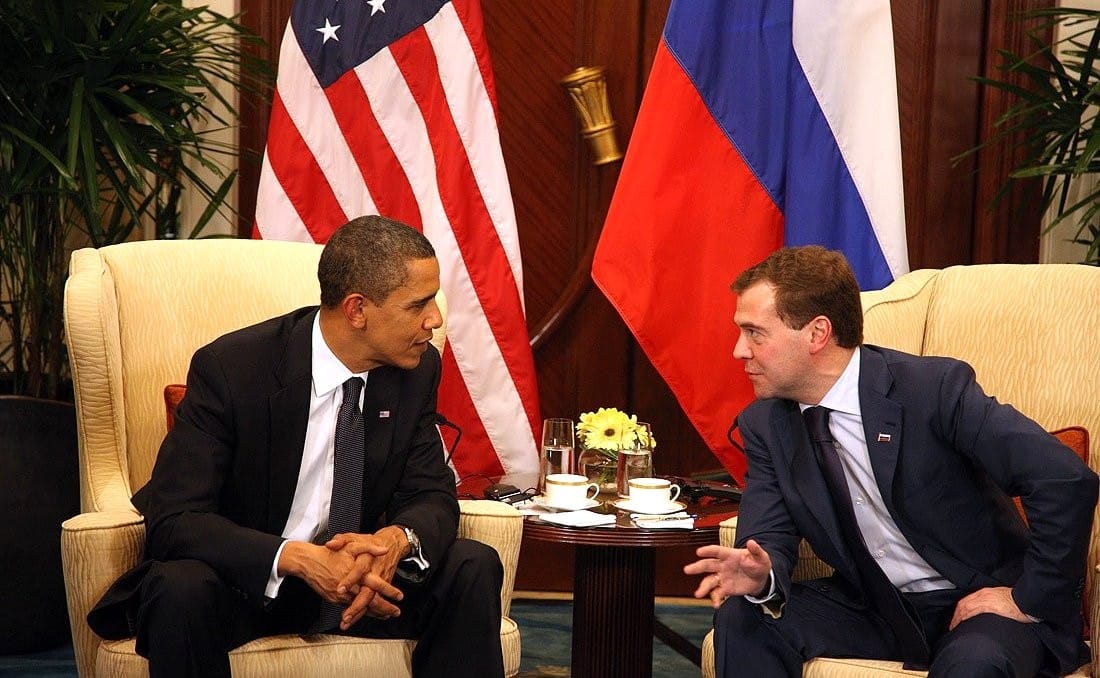
In response, on June 6, Russia’s chief sanitary inspector Gennady Onishchenko banned the import of Belarusian dairy products, citing non-compliance with Russian standards. The move had the potential to seriously harm Belarus, whose milk exports to Russia made up 6.5% of the country’s budget. A few days later, Lukashenko softened his rhetoric, but still decided to boycott an important CSTO summit, at which the six other participants signed the Agreement on Collective Rapid Reaction Forces, formally securing the alliance’s position as a counterweight to NATO.
By June 18, the “milk conflict” was over, but the dispute had already spilled, so to speak, into other areas. Now the Kremlin was accusing Belarus of underpaying for gas supplies.
As events unfolded on the eve of the CSTO summit and in parallel with the Kremlin’s plans to establish a Customs Union, Russian media noted that “Russian foreign policy lacks a long-term strategy, and only reacts to momentary external irritants.”
“A state terror is happening in Russia,” Memorial said in a statement on Estemirova’s murder. “We know about killing in Chechnya and beyond. Those who try to speak the truth, criticize the authorities are being killed. [Chechen president] Ramzan Kadyrov made the work of human rights activists in the republic impossible. Those who killed Natalia Estemirova wanted to stop the flow of truthful information from Chechnya.”
A criminal investigation into Estemirova’s kidnapping and murder was opened, with the main theory being revenge by Chechen fighters (one of the names mentioned in relation to the case was Alkhazur Bashayev). However, soon it virtually stopped. As of March 2020, neither the hitmen, nor the masterminds behind the murder, have been identified. The case remains open.
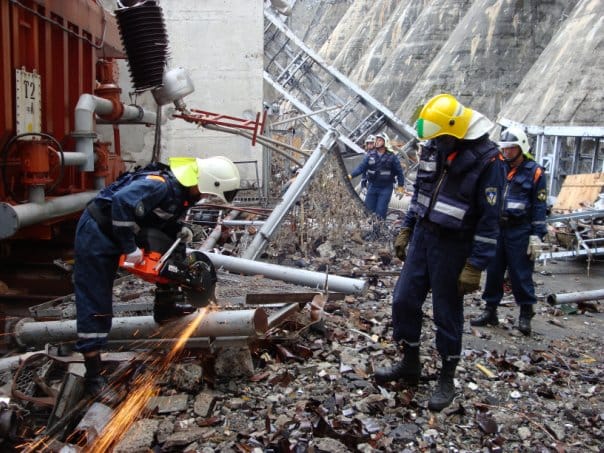
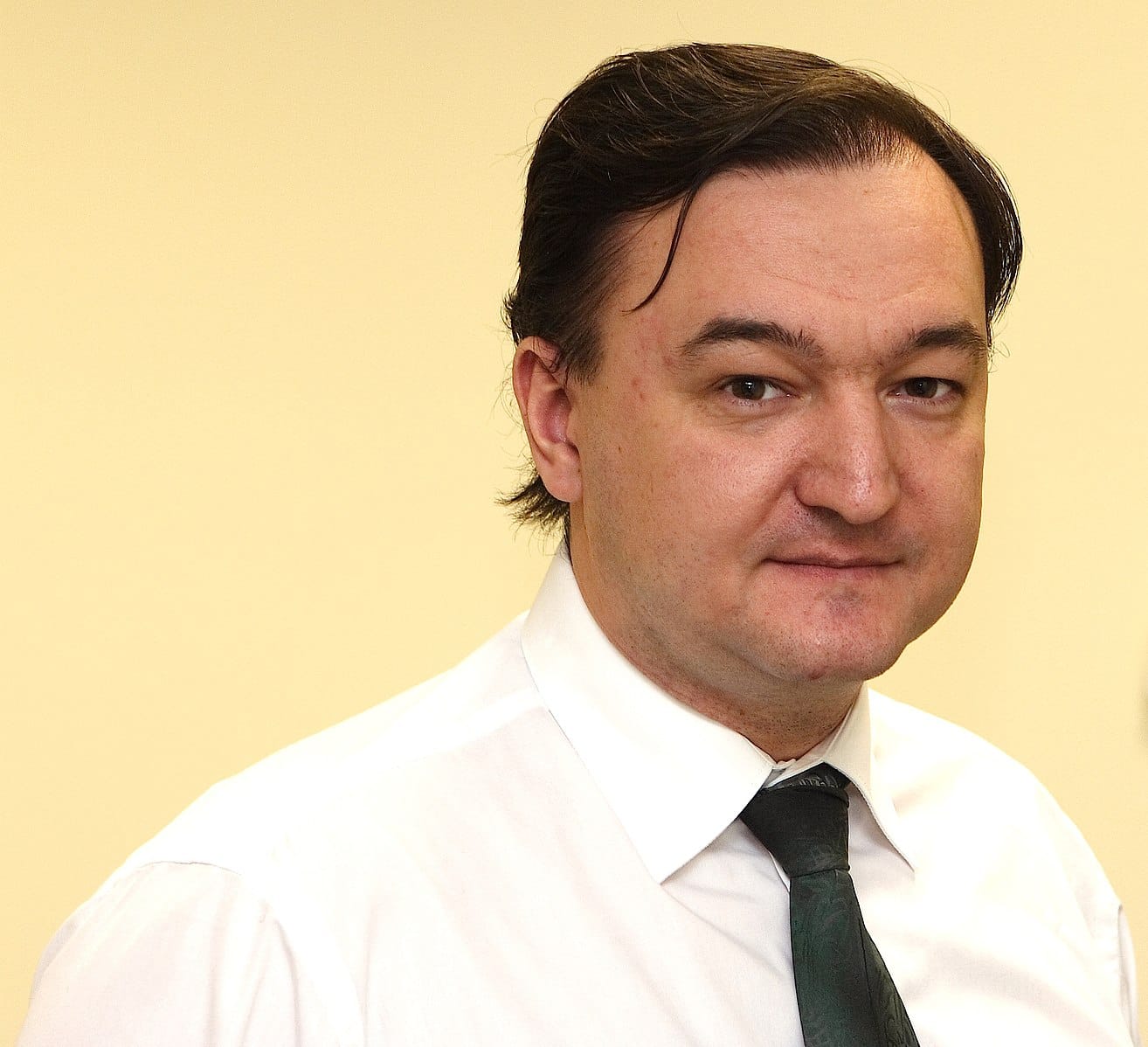
In 2007, an investigative team raided Firestone Duncan’s office, seizing constituent documents of various companies that Hermitage Capital worked with in Russia. These documents were then illegally used to re-register the companies under false names, on whose behalf a tax rebate claim worth 5.4 billion rubles ($230 million) was filed. Through various financial schemes, this money was then embezzled into Russian and foreign bank accounts.
It was Sergei Magnitsky, conducting an internal investigation at Browder’s request, who uncovered this massive corruption scheme, about which he later testified. However, on November 24, 2008, Magnitsky was arrested on charges of assisting Browder in tax evasion. During the months spent in pre-trial detention, Magnitsky developed chronic illnesses and was denied medical care.
The cause of his premature death was initially diagnosed as acute pancreatitis and traumatic brain injury, but information about this injury later vanished from the medical report.
In 2010, the investigators involved in the Magnitsky case received awards, and in 2013 Moscow’s Tverskoy District Court found Magnitsky posthumously guilty of tax evasion. Browder was convicted in absentia, and placed on Russia’s international wanted list.
Magnitsky’s death had major international repercussions.
Russia, Belarus, and Kazakhstan had agreed to form a trade union in August 2006, with customs duties among those countries to be eliminated by 2012. Moscow was the main driving force behind the effort—even though many thought the new arrangement wouldn’t have any economic benefits for Russia. According to estimates, the removal of custom duties would add $360 million to Belarus’s budget and up to $1 trillion to Kazakhstan’s. Russia, meanwhile, would stand to lose at least $2 billion. Many analysts speculated, based on these figures, that Russia backed the union for political rather than economic reasons.
According to an agreement that expired in 2010, Belarus paid a preferential rate for oil that allowed it to receive $1.8 billion in hidden subsidies from Russia. Belarus also had the right to processes oil it received from Russia at refineries and sell the petroleum products to Europe at global market prices. The profits from this practice added up to as much as one-third of the country’s budget. Tensions were further heightened, according to analysts, by Russian oil companies—such as Rosneft and Lukoil—who were looking to privatize Belarusian refineries, and by Moscow’s desire to control the building of pipelines through Belarus to Europe.
On January 27, Belarus signed a new oil agreement with Russia, in which the only concession it was able to secure was an increase in tariffs by 11percent on oil shipped through its territory.
The election’s results showed Ukraine remained divided into two parts: the pro-European west and the pro-Russian east. The only difference between this election and the one in 2006 was that Yanukovych’s results had improved among his supporters, while Tymoshenko had done slightly worse than her opponent.
On March 11, Mykola Azarov becomes Ukraine’s prime minister. On March 24, at a meeting with Vladimir Putin, Azarov announces that Russia–Ukraine relations could now begin “afresh.”
During rush hour, two female suicide bombers detonate their explosives on train platforms at two Moscow metro stations, Lubyanka and Park Kultury. Forty-one people were killed and 88 were injured.
Doku Umarov, leader of the Chechen separatists, claimed responsibility for the terrorist attack, calling it an act of revenge for a counterterrorism operation by federal troops in Ingushetia that had killed at least 10 rebel fighters.
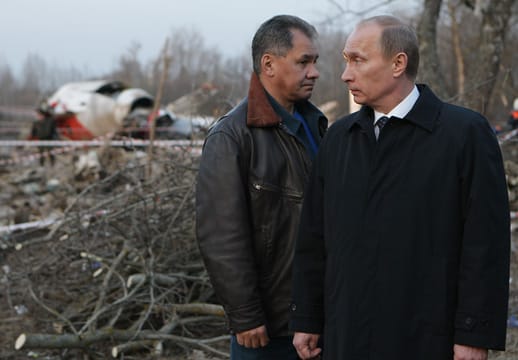
Moscow and Warsaw chose the Interstate Aviation Committee to investigate the crash. The committee placed blame on the crew’s refusal to use an alternative landing site, despite receiving reports about deteriorating weather conditions. The committee also found that the commander of the Polish air force, General Andrzej Blasik, was in the cockpit during the landing and presumably demanded that the pilots not look for an alternative site. A Polish commission led by the minister of the interior, Jerzy Miller, came to similar conclusions, stating that the crash was caused by the airplane’s descent below the minimum permitted height.
On November 25, Russia formally recognized the Katyn Massacre for the first time. The State Duma then followed suit with an official declaration.
In 2016, when Jaroslaw Kaczynski, the twin brother of Lech, became president of Poland, the investigation into the crash was reopened. In 2018, the conclusions reached by the original Polish commission were nullified on the basis of a new technical report, which pointed to the presence of explosives on board the airplane. Putin called the new accusations made by Poland a “bluff” and “political speculation” designed to endanger Russian–Polish relations.
Nevertheless, one of the arrested individuals confessed to spying on behalf of Moscow during interrogation. The arrests took place shortly after President Dmitri Medvedev visited the US. Medvedev was said to have good working relationship with his American counterpart, Barack Obama.
On July 3, Moscow and Washington reached an agreement to exchange the arrested individuals for Russian citizens serving sentences in Russia for espionage on behalf of western intelligence agencies. On July 9, nine Russian and one Peruvian national were exchanged for four pardoned Russian citizens at an airport in Vienna. Another Russian national suspected of espionage was expelled from the US on July 14.
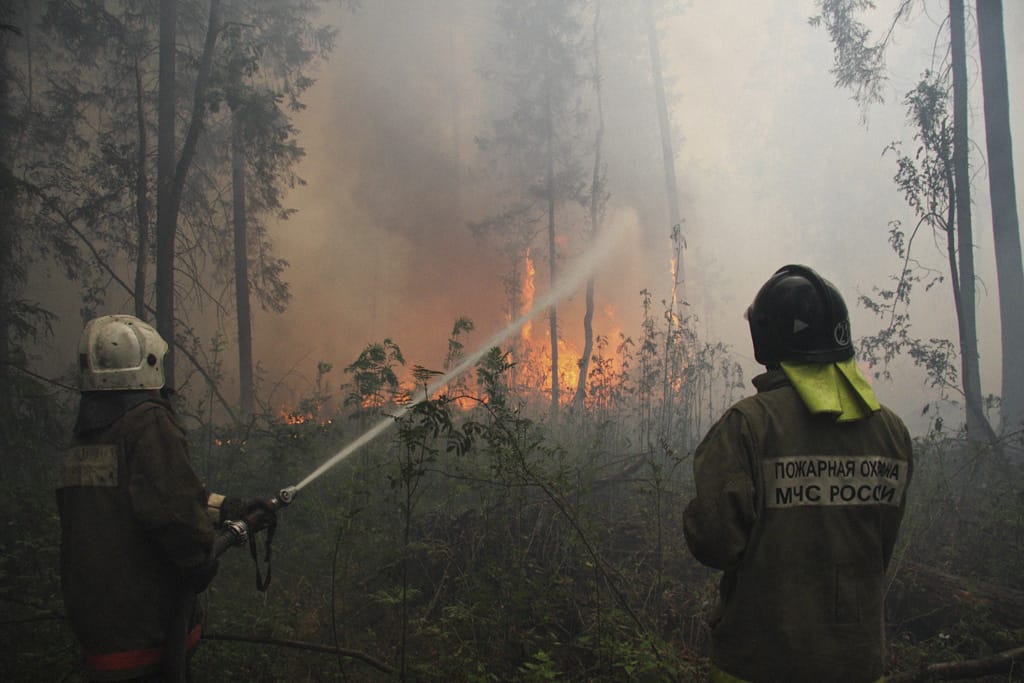
The heat and smog contributed to increased mortality in central and southern Russia: in some regions the mortality rates went up 70–80 percent compared to the year before. Missteps and inaction by government officials in response to the fires elicited a wave of public outrage. The missteps included the mayor of Moscow, Yuri Luzhkov, going on vacation in the midst of the crisis, and staged photographs purporting to show members of the pro-Kremlin United Russia party and its youth wing, Molodaya Gvardiya, fighting the fires. The photos were revealed as fakes by bloggers who became especially active during this period—monitoring fires, fundraising for victims, and chronicling the government’s response. Many volunteer groups, organized via the internet, emerged as a result of this crisis.
According to analysts, the wildfires showed that, when it came to handling emergencies, there were major flaws in the Kremlin’s “power vertical,” a system in which subordinates never acted without instructions from above. These shortcomings began with the failure of reforms to forestry management and ended with the limitations of relying on “manual management.”
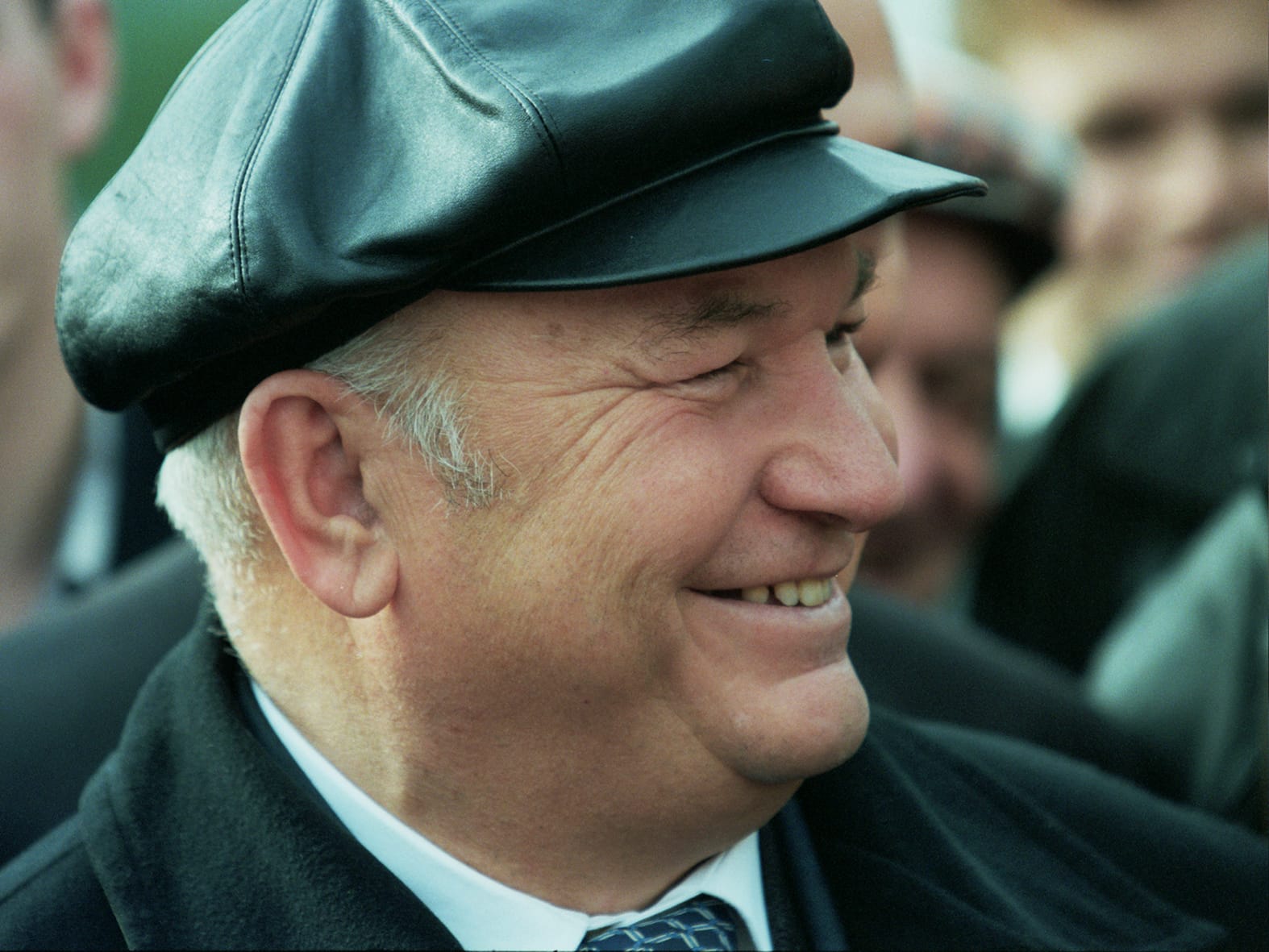
In a matter of days, Sergei Tsapok, leader of an organized-crime group, was arrested on suspicion of having committed the murders. The ensuing investigation uncovered the fact that Tsapok had committed dozens of crimes—including murder, rape, and robbery—with impunity for 10 years because he was under the protection of Alexander Khodich, head of the Center for Combating Extremism at the regional office of the Ministry of Internal Affairs. Khodich was Tsapok’s godfather.
In November 2011, a court in Krasnodar found three defendants, including Tsapok, guilty of the Kushchevskaya murders as well as a number of other crimes, and sentenced them to life in prison. Another three defendants received sentence of 19–20 years. During the investigation, two members of Tsapok’s gang committed suicide.
In 2014, Tsapok, age 38, died of a heart attack in detention while undergoing medical observation. Khodich was released in 2016 and returned to Kushchevskaya.
A unique feature of the reform was an attempt to attract public feedback through online discussions in which approximately five million people participated. However, experts severely criticized the version of the bill that was submitted for public discussion.
In August 2011, Rashid Nurgaliyev, minister of Internal Affairs, reported that “bribery, abuse of authority, corruption, general negativity and other problems of the past have remained.” In October 2012, the new head of the ministry, Vladimir Kolokoltsev, described the first stage of the reforms as ineffective.
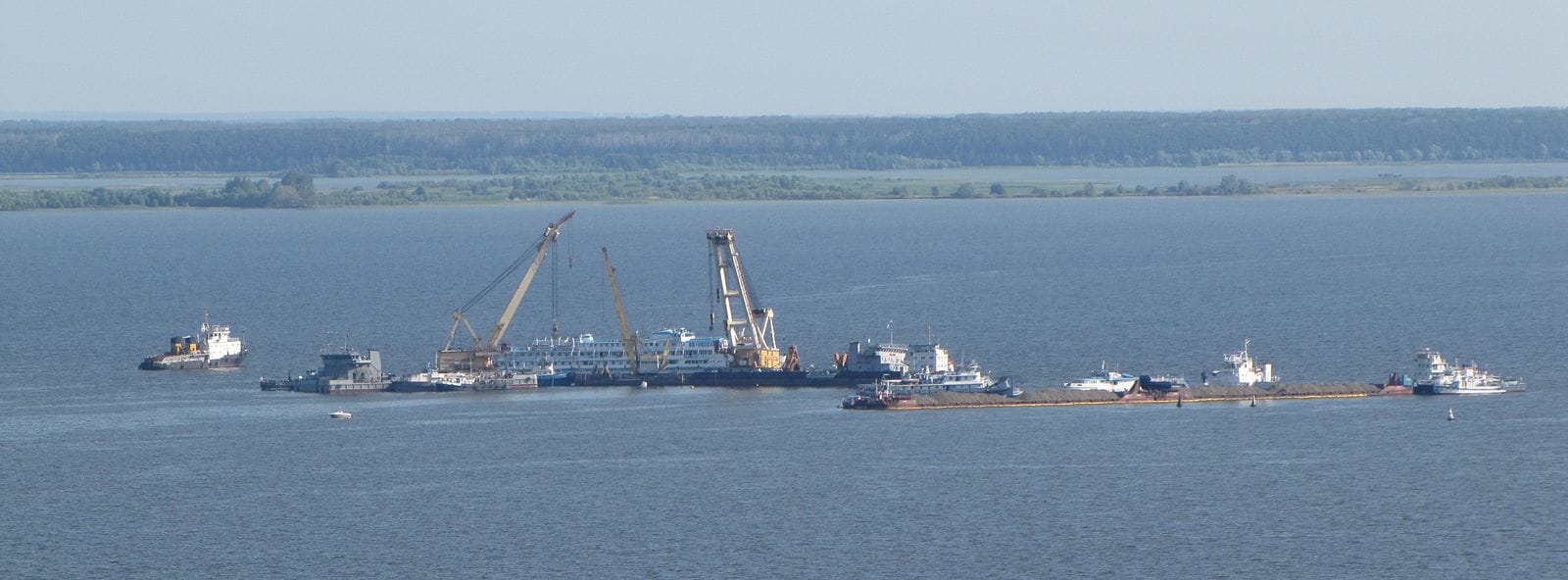
A plane carrying the Lokomotiv hockey team crashed while trying to take off from Yaroslavl on its way to Minsk. Only two of the 45 people on board survived. An investigation conducted by the Interstate Aviation Committee identified the cause of the crash as human error: one of the pilots had mistakenly activated the breaks while the plane was taking off. The only person to face criminal charges was Vadim Timofeyev, the deputy head of the airline operating the flight. Timofeyev asserted his innocence at trial and argued that the crew was incapable of making the mistake attributed to them. He claimed that the real cause of the crash was unknown.
Experts began to debate whether Dmitri Medvedev would run for a second term almost from the moment of his election to the presidency in 2008. Medvedev ended the speculation himself in a speech to a United Russia party congress in Moscow, where he announced that he would not seek reelection and suggested that the party nominate the current prime minister, Vladimir Putin, as its presidential candidate for 2012. Medvedev suggested that he could become prime minister. This switch in posts—dubbed a “castling” (rokirovka) in reference to the chess move whereby the king and the rook switch positions—solved the so-called “2012 problem.”
Back in 2009, while speaking a meeting of the Valdai Club, Putin had dismissed the idea of competing against Medvedev, saying: “We will make a deal because we are of the same blood and of similar political views.” Nevertheless, the official announcement of Putin and Medvedev’s decision to switch positions garnered much outrage online.
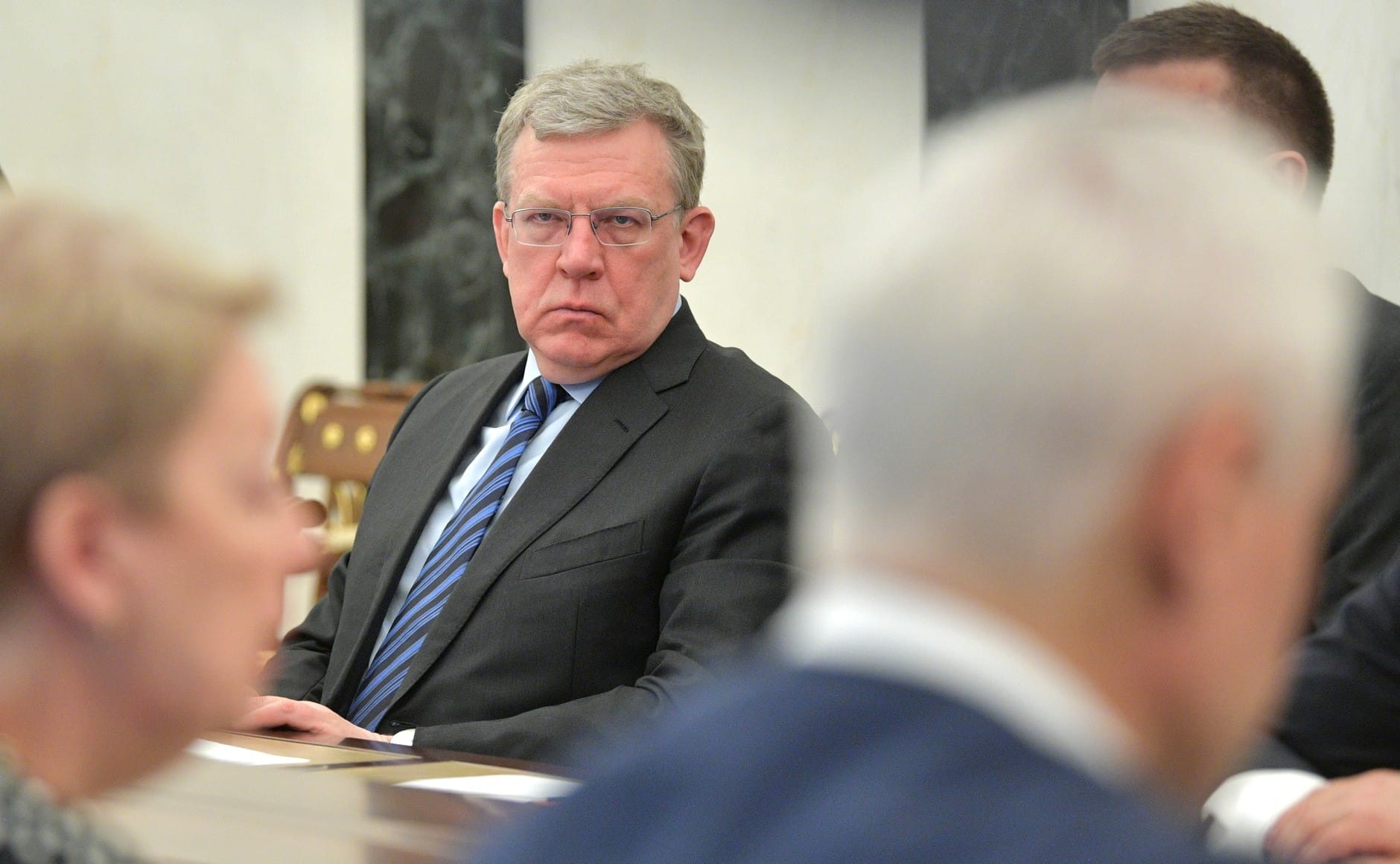
The construction of the gas pipeline from Russia to Germany via the Baltic Sea began in December 2005 during a time of diplomatic conflict between Moscow and Kiev. The “gas war” between Russia and Ukraine forced the Kremlin to develop alternative methods for delivering gas to Europe that would bypass Ukraine. The idea of a Baltic route had first been discussed in 1996.
Energy experts were skeptical of Nord Stream’s efficiency: the capacity of the gas pipeline (totaling 55 billion cubic meters per year via the twin pipelines) made up only 40 percent of its capacity. The project also directly competed with Russia’s supply of liquified natural gas to Europe from the Shtokman field in the Barents Sea.
Following changes to the Constitution that extended both legislative and executive terms, State Duma deputies were elected to five-year terms (as opposed to four) for the first time. The United Russia party was able to maintain a plurality of seats but lost its constitutional majority, winning 49.5 percent of the vote. The Communist Party received 19.2 percent, Just Russia 13.2 percent, and the Liberal Democratic Party 11.7 percent.
A unique feature of this voting was the participation of thousands of election observers committed to the idea of “fair elections.” Thanks to them, Runet (the Russian internet) was soon flooded with evidence of electoral violations, which were posted to social media networks and aggregated by online media. The phrase “United Russia: party of crooks and thieves,” popularized by Aleksei Navalny, soon became a rallying cry and online meme. According to political scientists, United Russia’s falling popularity and Putin and Medvedev’s announcement of their “castling” decision politicized many Russians.
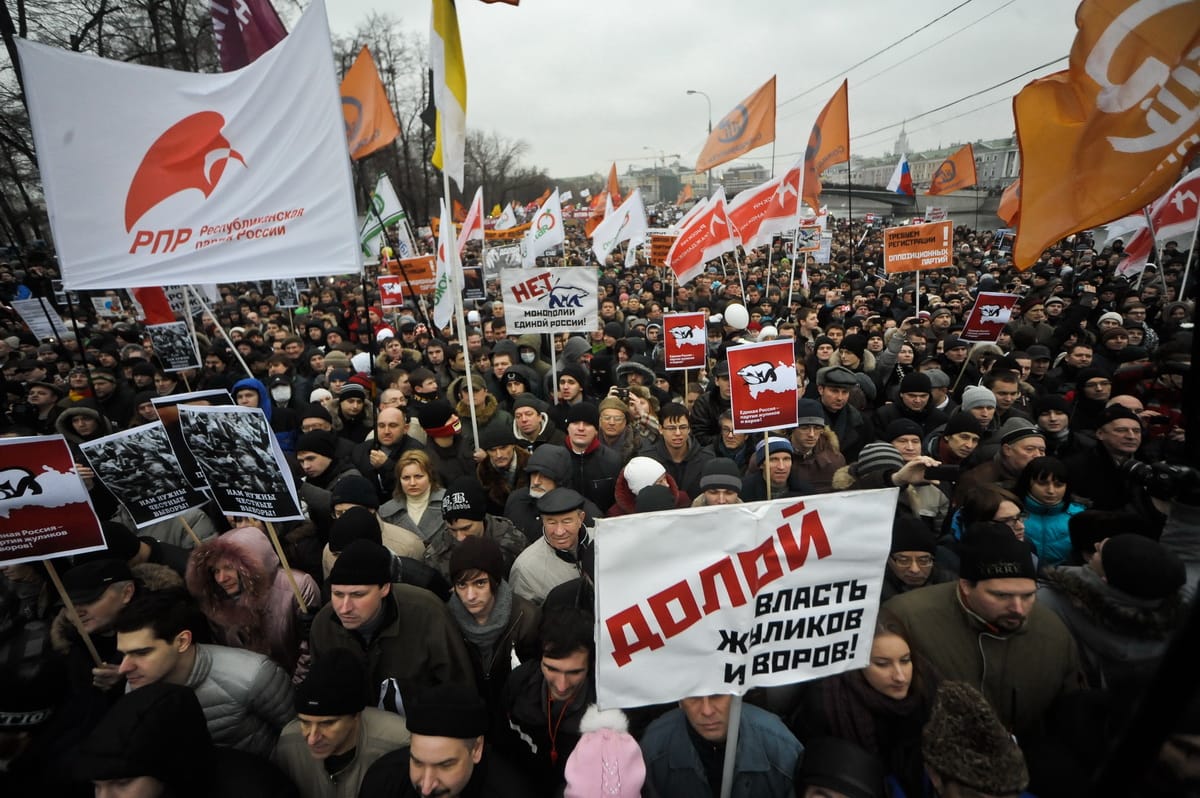
On December 10, protests in support of free elections took place in almost one hundred towns and cities across Russia. In Moscow, eighty thousand people gathered on Bolotnaya Square in a protest that united many different political forces. This was also the first protest that was covered by federal state-controlled media, which had, up to that point, avoided the topic of protest. Among the demands made by demonstrators was the release of political prisoners, the annulling of the election results, the registration of opposition political parties, and the holding of new parliamentary elections.
After the authorities refused to entertain any of the demands, more than one hundred thousand people took part in a protest on Sakharov Avenue, in downtown Moscow, on December 24. This was the largest mass protest in Russia’s modern history, which became known as the meeting of “angry citizens.” Opposition politicians, journalists, writers, and musicians were among those who spoke to the crowd that day. Alexei Kudrin, the former finance minister, also spoke at the meeting and offered his help in establishing a dialogue between the protesters and the regime.
One of the notable developments of the December protests was the involvement of many first-time participants. Members of the so-called “creative class”—the well-educated middle class—joined political protests for the first time. The protest potential of this group of people had been overlooked by authorities. Problems that had previously only been discussed online and on social networks spilled into the streets, creating a new political reality for Russia.
An agreement on the establishment of the Single Economic Space was signed by the presidents of Russia, Belarus, and Kazakhstan on November 18, 2011, with all three leaders assuring that the alliance would rival the European Union. Under the Customs Union and common agricultural policy, it was additionally proposed to create a 1,200-strong Eurasian economic commission, to be financed predominantly by Russia.
Approximately 140 amendments were made to the final document, including the requirement that governors enlist the support of 5-10% of municipal deputies (the so-called “municipal filter”). The law entered into force on June 1, 2012.
Another concession by the Kremlin was the law to simplify the registration of parties, adopted on April 4. Under the new law, the quota for the number of members needed to register a party was reduced from 50,000 (set in 2004) to 500, the need to collect signatures was abolished, and the term that parties were permitted to exist but not partake in elections was extended from five to seven straight years.
However, the opposition criticized the political reforms, calling them a “cynical imitation” and stating that “the new procedure for electing the State Duma debases even the current law and benefits only the ‘party of power.’”
In the runup to the presidential elections scheduled for March 4, demonstrations under the slogan “For Fair Elections” were held across Russia.
According to the organizers, the protests on Bolotnaya Square in Moscow were attended by 120,000 people.
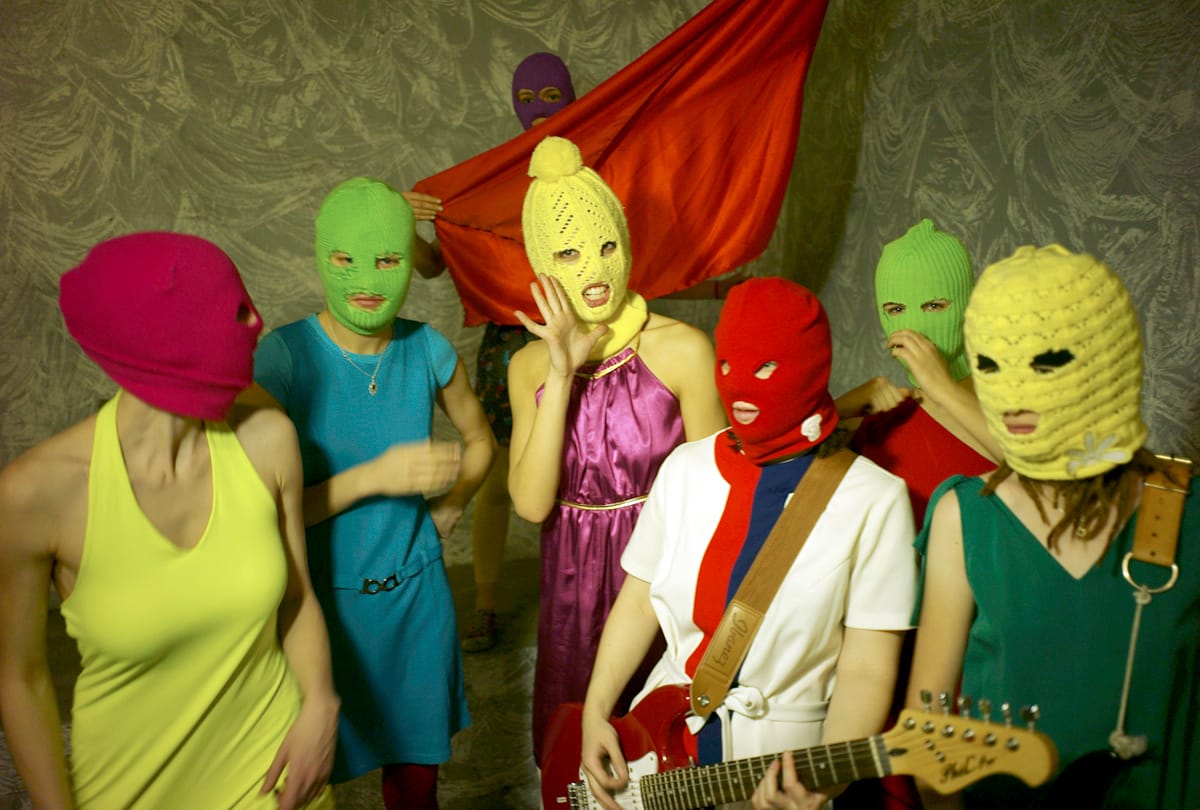
On March 3, group members Nadezhda Tolokonnikova and Maria Alekhina, and on March 16, Ekaterina Samutsevich, were arrested on charges of hooliganism and “inciting religious hatred.”
The court trial commenced on July 30, and as early as August 17 all three defendants were sentenced to two years in a general-regime penal colony. The case and verdict sparked widespread debate in society about feminism, the limits of art, religious feelings, and the nature of Russian justice. Human rights activists, legal experts, and even some representatives of the authorities and the Russian Orthodox Church described the sentence as excessive.
The Pussy Riot affair became an international cause célèbre and prompted words of support from Yoko Ono, Björk, Patti Smith, and Madonna.
On December 23, 2013, Alekhina and Tolokonnikova were released under an amnesty (Samutsevich had been freed ahead of schedule in October 2012).
The highlight was the speech of the presidential candidate himself, who urged his supporters “to stay on the straight and narrow, and not betray their motherland” (hinting that the opposition rallies were funded by the United States).
According to analysts, the standout features of the 2012 presidential campaign were the “war of the rallies” and the “internet war” between the government and the opposition.
On a turnout of 65.3%, Putin won the presidential election with 63.8% of the ballot. Among the other candidates, the votes were distributed as follows: Gennady Zyuganov (Communist Party)—17.2%, Mikhail Prokhorov (independent)—8%, Vladimir Zhirinovsky (LDPR)—6.2%, Sergey Mironov (A Just Russia)—3.9%. For the first time, the president was elected for a six-year term.
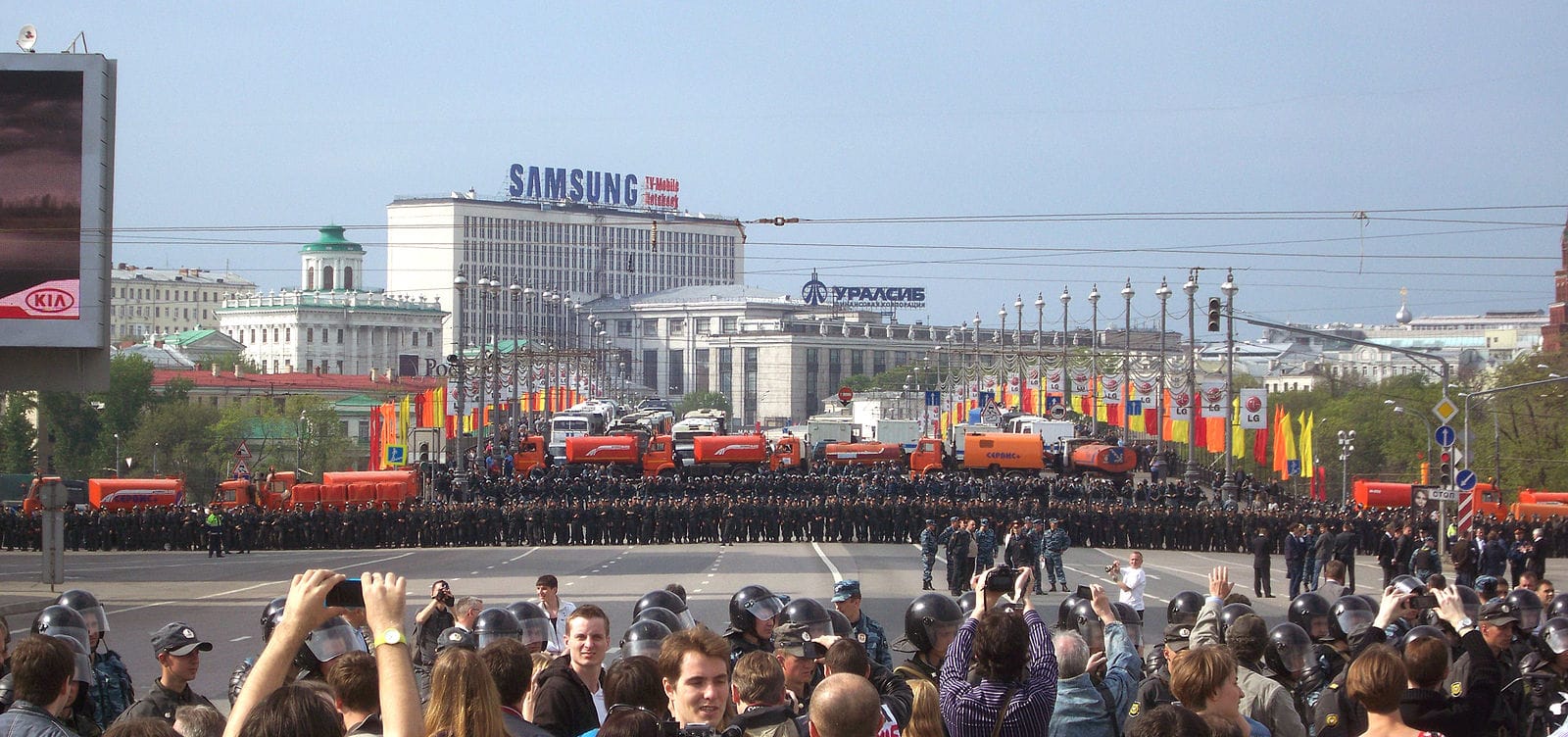
When the participants approached Moscow’s Bolotnaya Square, they clashed with a police cordon, whose presence had not been agreed with the organizers. When the crowd broke through, the police resorted to force, kicking and clubbing the protesters, and hurling them into waiting prison trucks. As a result of the violence, between 400 and 700 people were detained, with dozens of demonstrators and police officers injured.
On the very same day, a criminal case was initiated under Articles 212 (“Mass disturbances”) and 318 (“Use of violence against the authorities”) of the Criminal Code of the Russian Federation. In total, more than 30 people were prosecuted in the so-called Bolotnaya case. The human rights organization Memorial recognized the majority of them as political prisoners. According to human rights activists, the defendants in the case were specially selected by the authorities on sociological grounds: all walks of society were represented to cow the population at large into believing that no one was safe from the arm of the law.
Participants in the events admitted that the dispersal of the Bolotnaya Square rally marked a turning point for the protest movement and the political climate in the country, whereupon the screws began to be tightened.
The law on administrative liability for rallies entered into force, under which fines for violations of the procedure for holding rallies were stiffened significantly — up to 20,000 rubles for individuals, 600,000 rubles for officials, and 1 million rubles for legal entities.
The high death toll was largely due to the lack of an effective public warning system — people had to alert each other by phone and other means.
The public response was tremendous: within a day, volunteers from all across Russia had started arriving to help with the clean-up operation (more than 2,600 by the end). Fundraising and humanitarian aid efforts sprang up spontaneously. By July 11, the Krasnodar branch of the Red Cross had raised 82 million rubles, of which 28.5 million were small donations.
On July 20, the Investigative Committee of Russia opened a criminal case against four officials of Krymsky District, finding them guilty, on August 21, 2013, of negligence resulting in multiple homicide; they were sentenced to prison terms of 3.5 to 6 years.
Russian human rights activists reacted strongly to the law. The head of the Moscow Helsinki Group, Lyudmila Alekseeva, called it “vile” and stated that she was prepared to forsake foreign sources of financing. Lev Ponomarev, leader of the organization For Human Rights, described the title of “foreign agent” as an “insult.”
In October, the State Duma also introduced a range of fines for NGOs. For instance, failure to add the “foreign agent” label to media materials carried a fine of 300,000 rubles for individuals, and 500,000 rubles for legal entities.
A draft law on defamation was introduced to the State Duma in early July, proposing the reintroduction of penalties for defamation in the Criminal Code and an increase in the fine for verbal assault in the Code of Administrative Offenses; defamation had been decriminalized in 2011.
The bill was adopted by the State Duma on July 13, and approved by the Council of the Federation on July 18. Those convicted now faced a fine of up to 2 million rubles or up to 320 hours of corrective labor. On July 30, the law was signed by Vladimir Putin.
According to opposition members, the initiative was an extension of the law on foreign agents and the increased fines for holding rallies — the measures were all designed to target the protest movement, journalists, and civil society.
The negotiations on Russia’s entry into the World Trade Organization had been 18 years in the making. The most difficult talks were those with the United States, and were wrapped up only in October 2010.
However, the expected benefit of joining the WTO was soon nullified by sanctions, falling oil prices, and the devaluation of the ruble.
The law, adopted on December 29, 2010, was intended, in the words of its drafters, to combat attempts to “morally and psychologically molest children” (topics such as suicide, wrongdoing, and drug abuse, as well as information that questioned family values and respect for parents were placed under this umbrella).
On November 1, in execution of the law, the Federal Service for Supervision of Communications, Information Technology, and Mass Media (Roskomnadzor) drew up a register of blacklisted websites disseminating information categorized as harmful to children (child pornography, information on suicide methods, drug promotion). What’s more, many popular Runet (Russian internet) resources were blocked, including Lurkmore, Rutracker.org, and the online library Librusek.
The defendants in the case were around 20 employees of the Ministry of Defense and associated companies. Serdyukov himself was initially called as a witness. In November 2013, a criminal case was instituted against him personally on suspicion of negligence, but thanks to an amnesty in honor of the 20th anniversary of the Russian constitution, the case against the ex-minister was dropped.
His replacement in the defense chair was Sergei Shoigu, who had previously headed the Ministry of Emergencies since 1994.
In November, Congress linked the adoption of the act, which sought to set restrictions on human rights violators (visa bans, account freezes), to the normalization of trade relations with Russia through repealing the Jackson-Vanik amendment. (The Jackson-Vanik amendment to the US Trade Act had been passed in 1974 to restrict trade with countries that violated human rights, in particular freedom of emigration.) Talks on the repeal of the outdated amendment had been ongoing since 2002, but without success.
On December 6, the Magnitsky Act was approved by the US Senate; on December 14, Barack Obama signed it into law.
Equivalents of the Magnitsky Act were adopted by several European countries and Canada. In 2016, the Global Magnitsky Act entered into force in the United States, which extended its principles to other countries.
Moscow’s asymmetric response to the Magnitsky Act was the Dima Yakovlev Law, named in memory of an adopted Russian boy who died in the United States. In addition to tit-for-tat measures (entry bans into Russia and account freezes on US citizens deemed to have violated human rights), the law also prohibited the adoption of Russian children and the financing of Russian NGOs by US citizens.
As a consequence of the Dima Yakovlev Law, around 500 adoptions of Russian children by American families were frozen.The mutual recriminations put an end to what was left of the US-Russia “reset.”
According to media reports, Russian stakeholders planned to resolve the conflict of interest by firing Robert Dudley, the company’s CEO. The showdown, including the BP’s suit to the High Court of London, lasted for several months until a compromise was reached—which entailed a restructuring of management, Dudley’s resignation, and an initial public offering of 20 percent of the company. Despite this development, internal conflicts continued over the next five years.
On March 21, the Russian state oil company Rosneft acquired TNK-BP shares from AAR for $27.73 billion and from BP for $16.65 billion. As part of the deal, BP increased its stake in Rosneft to 19.75 percent. In October, it was reported that Rosneft refused to buy out the 5 percent stake from the minority shareholders (and pay out their dividends). As a result, TNK-BP’s stock value fell by 16.4 percent.
In April 2012, the Kirov committee closed the case due to a lack of evidence of a criminal act. A month later, Russia’s Investigative Committee annulled that decision. In July, Navalny was charged with embezzlement in a new “Kirovles case.” This time, the damages were estimated to be 16 million rubles. Investigators submitted the case to the court on March 25, 2013. Two days later, Navalny uploaded all the case documents and expert analyses online for the public to review.
During the trial, which began on April 17, 2013, witnesses sided with Navalny and said that they had no complaints about the actions of Vyatka, and that the charges were based on the evidence of just one person, Opalev. The governor of the Kirov region, Nikita Belykh, also testified on behalf of Navalny. On July 18, 2013, the count found Navalny and Ofitserov guilty of embezzlement and sentenced them to five and four years in prison, respectively, and imposed a 500,000 ruble fine. The verdict was delivered the day after Navalny registered as a candidate for mayor of Moscow. Despite the verdict, both defendants were released on a promise not to leave the country. Some analysts attributed this leniency to a lack of consensus within the Kremlin on how to deal with Navalny, while others speculated that Navalny’s treatment had to do with acting mayor of Moscow Sergei Sobyanin’s need to stage a competitive election in order to secure his political credentials. On October 16, 2013, the count gave Navalny and Ofitserov suspended sentences.
According to the new law, Russian officials and members of the parliament who owned foreign assets were forced to dispose of them or resign. The law extended to their spouses and children. It also required officials to declare foreign real estate they owned. According to media reports, the presidential administration came up with the idea for this law as part of the official campaign to “nationalize the elites.” Vladimir Putin was named as the author of the bill.
With a turnout of 32 percent, Sobyanin was elected mayor, scoring 51.4 percent of the vote and winning in the first round. Navalny came second with 27.3 percent. However, according to exit polls run by Navalny’s team, Sobyanin received only 46 percent of the vote—a percentage that, if officially recognized, would trigger a runoff election. The opposition claimed that the voting results were rigged, to no avail.
On September 9, about twenty thousand people took to the street to rally in central Moscow in support of Navalny.
On October 13, about two hundred people gathered at the so-called “people’s assembly,” including nationalist groups who demanded the resignations of the local district head and a resolution of the “migrant strangle” problem. Part of the crowd stormed the neighboring shopping center, lashing out on the migrants who worked there and clashing with police.
By the end of the night the crowd mushroomed to several thousand people, who moved toward a local produce market known for its high concentration of migrants. Chanting slogans, such as “Russia for Russians” and “Moscow for Moscovites,” the mob beat up whoever they found who looked like they were from the North Caucasus or Central Asia. To crack down on the riots, the Moscow police force was mobilized: four hundred people were detained, including dozens of members of informal nationalist groups.
As a result of the riots, multiple criminal cases were initiated on charges of hooliganism and violation of the public order. Following an inspection of the produce market, cases of illegal immigration were also brought up. Several officials were dismissed. While the Biryulyovo riots highlighted the gravity of the migrant problem in the city, no proper political discussion ensued.
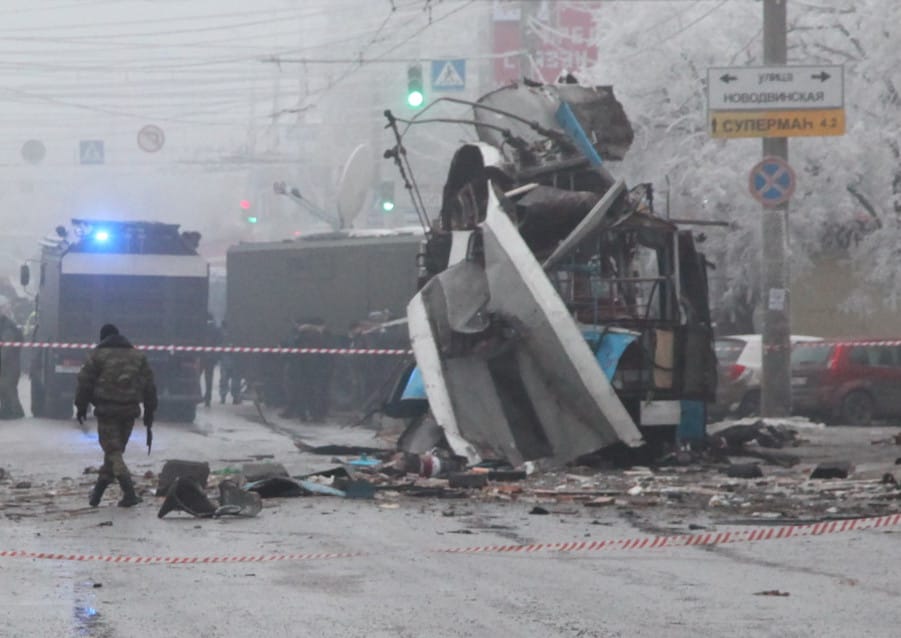
On December 29, another explosion killed 16 people and again wounded 40 at the Volgograd train station. The following day, yet another terrorist attack shook up the city—this time on a trolley bus. Fourteen people died, 27 were wounded.
In late January 2014, the National Antiterrorist Committee claimed that the December attacks had been executed by the members of a terrorist cell based in the city of Buynaksk, in Dagestan. Western press linked these events to the upcoming Winter Olympic Games in Sochi.
Authorities issued an amnesty decree said to honor the 20th anniversary of the 1993 Russian Constitution. Under the measure, twenty-five thousand people were to be pardoned and acquitted, including two members of the music group Pussy Riot—Nadezhda Tolokonnikova and Maria Alyokhina—and four defendants in the Bolotnaya case, Greenpeace activists who staged a “Save the Arctic” protest at the Prirazlomnaya oil-drilling platform in August 2012.
The year’s political sensation arrived as Vladimir Putin was leaving his annual marathon press conference. Responding to a last-minute question on the potential amnesty for Mikhail Khodorkovsky, the former CEO of Yukos oil company who had been imprisoned since 2003, Putin gave a surprising answer: that he planned to free the businessman for “humanitarian” reasons, having received a pardon request for him. (Khodorkovsky’s lawyers immediately claimed that no such request had been made, and Khodorkovsky confirmed this soon thereafter.) Khodorkovsky was released just a few hours after Putin’s comments—and flown to Germany that night. He had spent 3,709 days in prison and had 246 days left on his term.
While western countries hailed the development, many European politicians saw it as a mere ploy to improve Russia’s public image in the runup to the 2014 Sochi Olympics.
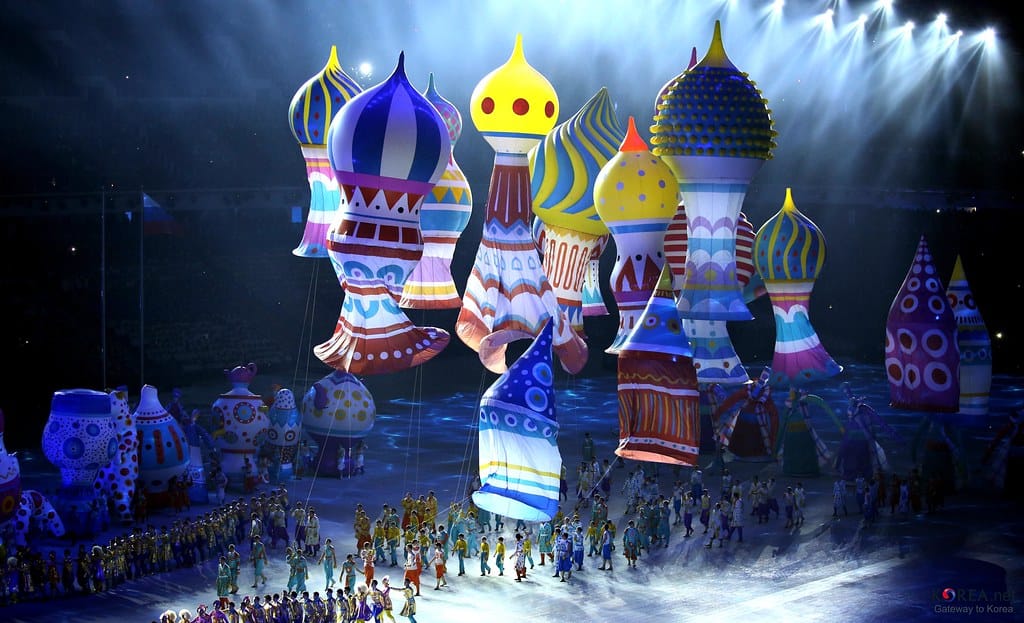
Despite this grim coverage, the Sochi Games turned out to be a big success for Russia, whose team came first in the overall standings. It seemed that the country’s international prestige—something Putin had been craving—was boosted.
However, in December 2014, the German television network ARD released a documentary on doping in Russian track-and-field athletics as well as in the Sochi Olympics. The film launched a series of investigations, including one by the World Anti-Doping Agency (WADA), that led to the largest doping scandal in Russian sports. In 2015, the agency accused Grigory Rodchenkov, head of the Russian Anti-Doping Center, of destroying over a thousand drug-test samples during the Sochi Olympics. Rodchenkov denied the accusations, but soon resigned and fled to the United States. In May 2016, the New York Times published a major investigation that shed the light on the real reasons for the success of the Russian Olympic team. With Rodchenkov as a whistleblower, reporters detailed a large-scale government-sponsored doping program operating in Russia. WADA’s investigation, conducted under the auspices of Richard McLaren, later confirmed the Times findings.
As a result, disciplinary cases were opened against dozens of Russian sportsmen, and the country was stripped of a dozen Olympic medals won in Sochi. Some of the medals, however, were later returned.
The consequences of the antidoping scandal continue to play out. On December 9, 2019, WADA banned Russian sportsmen from participating in major international competitions for four years.
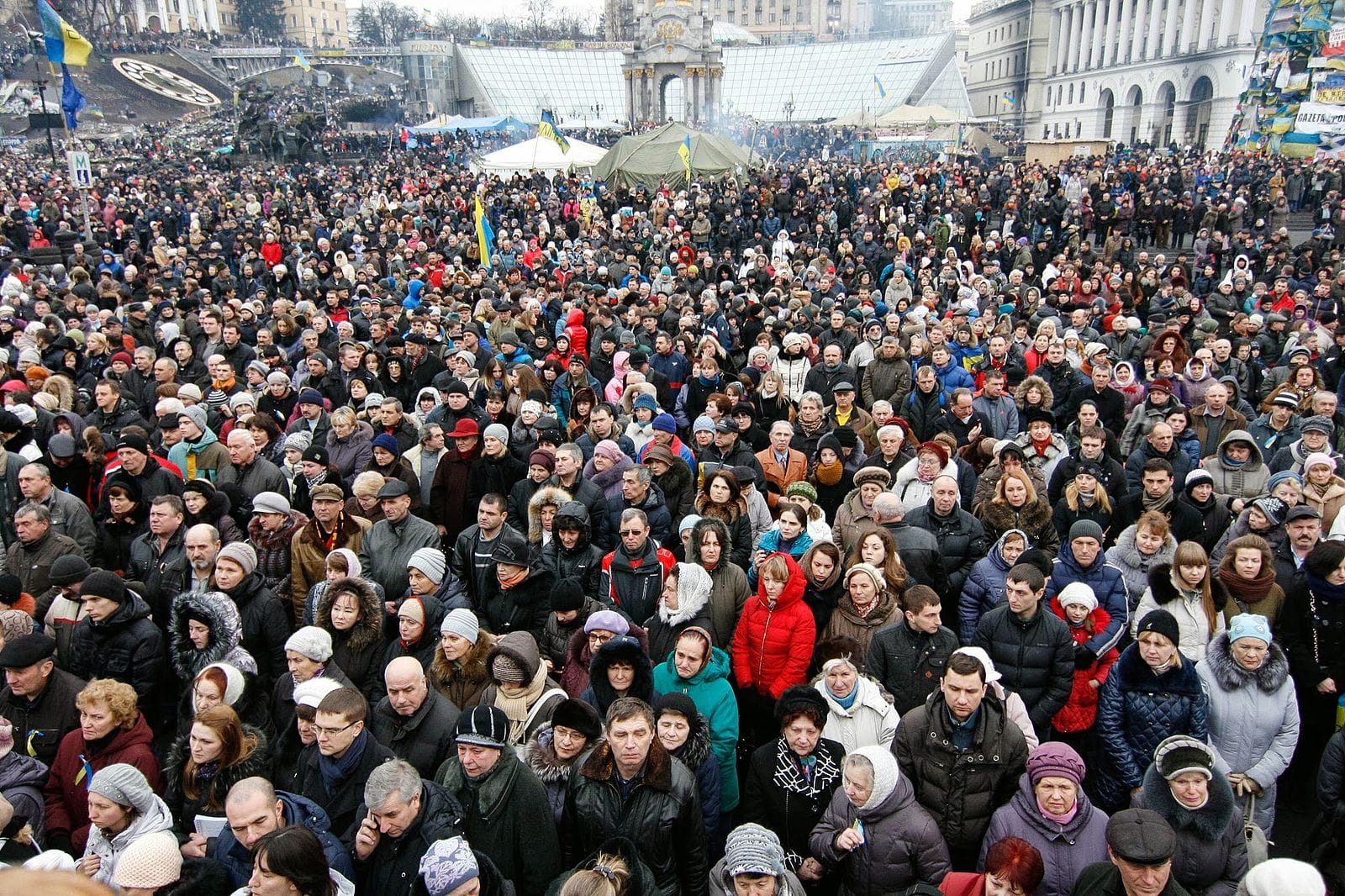
On November 29–30, at the Eastern Partnership summit, President Viktor Yanukovych, defying the opposition, reiterated Ukraine’s decision to pause the EU integration—in stark contrast with the governments of Moldova and Georgia, who signed association agreements with EU at that very summit.
Late at night, on November 30, the Ukrainian special police force, the Berkut, cracked down on protesters’ tent camp in central Kyiv; 35 people were wounded. On the following day, one hundred and fifty thousand to four hundred thousand people, by various estimates, took to the streets of Ukraine’s capital. Protests turned into a power standoff, as activists of the nationalist Freedom party seized several administration buildings.
To resolve the crisis, a roundtable was held in Kyiv on December 10, at which former Ukrainian presidents Leonid Kravchuk, Leonid Kuchma, Viktor Yushchenko gathering for talks with Yanykovich. Together they seemed to have reached a decision to resume negotiations with the EU. But later that night, Berkut units tried to purge protesters from the city center. The reaction of western powers was just as harsh: the Ukrainian government was threatened with financial aid cuts from the EU and sanctions from the US. Russia demanded that these nations stop putting pressure on Kyiv.
On December 17, Yanukovych paid a visit to Moscow where he received assurances that a large share of the Ukrainian macroeconomic problems would be relieved, including a $15 billion credit line and a discount for Russian gas imports. But this did nothing to resolve the standoff. Many Ukrainians celebrated New Year’s Eve at the Maidan square.
After the holidays, on January 16, the Verkhovna Rada, Ukraine’s parliament, passed a number of draconian laws aimed at repressing the protests, including prosecution in absentia, criminal liability for extremism and libel, tougher punishments for mass riots, and the “foreign agents” law. The opposition called these laws illegitimate, western countries criticized them sharply, and Russia claimed that the entire case was Ukraine’s “internal business.”
On January 20, another peaceful rally turned into bloody clashes with police. To crack down on the protesters, policemen were using water jets and gas grenades, while protesters threw stones and Molotov cocktails. Ultranationalists of the Right Sector party called for a “national revolution.” Over one hundred people were wounded in the riots.
As the laws came into force on January 22, riots in Kyiv intensified. Berkut stormed the barricades erected by the opposition; two people died.
Amid this escalation, Yanukovych held a meeting with three opposition leaders—Vitali Klitschko of the UDAR party, Arseniy Yatsenyuk of the Fatherland party, and Oleg Tyagnibok of the Freedom party. An agreement was reached to cease the hostilities, but the negotiations failed in terms of substance. Neither the president nor the government were willing to resign, as the opposition demanded.
Meanwhile, protests spread to Ukraine’s western regions.
On January 23, US Vice President Joe Biden called Yanukovych, expressing grave concern over violence. In Moscow, the Ukrainian crisis was viewed as an attempted coup. On the following day, Yanukovych offered positions in the government to members of opposition. Yatsenyuk said he’d accept the offer under several conditions.
On January 27, the Verkhovna Rada abolished the “antiprotest” laws, and Azarov’s government resigned. A few days later, another law was passed granting pardon to all protesters if they vacate the seized government buildings. Despite these concessions, opposition refused to leave the Maidan.
As talks on integration with the EU resumed, protests sparked in pro-Russian eastern Ukraine under the slogan “Fascism will not pass!” At a meeting of Yanukovych’s Party of Regions in the city of Kharkiv, volunteers who wished to help the police formed a “people’s guard.”
By mid-February, the government started to release Euromaidan supporters from jail, and the opposition began to vacate occupied buildings. But the fragile hope that this crisis could end peacefully was never to come true. As the authorities and the opposition failed to find consensus on constitutional reform, riots returned to central Kyiv, resulting in streets fights and deadly clashes. Twenty-five people were reported dead.
On February 19, yet another cease-fire was called, but it held less than a day. Street fights intensified, the death toll increased to 75.
On February 21, following all-night negotiations among the opposition, representatives of the EU, and Russia, Yanukovych agreed to hold an early election, form a new government, and implement a constitutional reform. But the Maidan activists continued to demand his immediate resignation. On the night on February 22, they took control of the government quarter in central Kyiv, as troops had been withdrawn earlier that day. In the morning, news spread that Yanukovych had fled the country (he later resurfaced in Russia).
On February 23, Oleksandr Turchynov of the Fatherland party became acting president, and the new government was headed by Yatsenyuk. An early presidential election was scheduled for May 25.
The handover of power to the opposition caused mixed reactions in Crimea. The division lines split three ways: there were supporters and opponents of the Maidan, as well as those representing the interests of the Crimean Tatar community. As the Crimean parliament reached a decision to hold a referendum on independence on May 25, armed men occupied the parliament building as well as the Crimean government, where they also planted a Russian flag.
On that same day, the Russian State Duma (the lower house of the Federal Assembly) proposed to simplify the procedure for the new regions to join Russia. On March 1, the Federation Council (the legislature’s upper house) granted permission to Putin to use military force in Crimea, which became a turning point in the Ukrainian crisis.
All these developments in Russia alarmed the west, raising sharp criticisms. The United States announced it would impose economic sanctions on Russia. Moscow defied criticisms, insisting that the only way forward was to return to the February 21 agreement signed by the legally elected Ukrainian president alongside European leaders. Russia also resented that the EU and the US called for Moscow to look into the future and pretend that the agreement had never happened.
In the meantime, the Crimean authorities rescheduled the referendum to March 30 and then to March 16. Reports emerged that some members of the Ukrainian military based in Crimea had joined the Crimean authorities, who rejected the new government in Kyiv.
On March 6, the Crimean parliament officially requested Russia to consider accepting it into its territory. The declaration of intent to announce its independence, signed by the parliament on March 11, extensively cited international legal norms, including the Kosovo precedent.
In the runup to the referendum, numerous media reports mentioned the presence of Russian soldiers without insignia in Crimea (they were described as “polite people” and “little green men”). Putin bluntly denied this at the time. A few years later, he acknowledged it was true.
According to the official results of the March 16 referendum, with a turnout of over 80 percent, 96.8 percent of the population of the Autonomous Republic of Crimea, and 95.5 percent of the residents of the city of Sevastopol, voted in favor of joining Russia. On March 17, Crimea unilaterally declared its independence, and on the following day signed an agreement to join Russia. The referendum results were not recognized by almost all the members of the United Nations, as stated in a March 27 special resolution. For most of the world, Crimea remains a temporarily occupied part of Ukraine.
In Russia, 88 percent of the population welcomed Crimea.
The first round of sanctions over Crimea was imposed a day after the Crimean referendum. The EU introduced personal sanctions against 21 people (Russian and Crimean officials and politicians), banning their entrance to Europe and freezing their assets. The US followed suit and sanctioned 11 people—the list was expanded in three days to include 19 more. On March 21, the EU expanded its “blacklist” as well, by adding 12 more people.
Over the following weeks, Western countries gradually introduced economic sanctions, mostly restricting Russian access to defense technology and services. Sanction lists have been growing ever since.
Protests and riots that included attempts at seizing local city halls swept over the Luhansk and Kharkiv regions. Ukrainian authorities faced the issue of potentially altering the country’s unitary state into a confederation and expanding the powers of these regions (this is what Moscow was calling for from early on).
On April 17, diplomats from Russia, Ukraine, the US, and the EU convened in Geneva, where they signed a de-escalation agreement. However, Moscow and Kyiv had different interpretations of which groups were required to disarm.
In early May, the standoff between pro-Russian “citizen militia” and supporters of the Kyiv authorities led to bloody clashes. In Odessa, 48 people died in street fights and a fire. Eastern Ukrainian cities of Slovyansk and Kramatorsk became the epicenter of the standoff.
The conflict in Ukraine has since turned into a civil war.
On the following day, the self-proclaimed republics demanded that Ukrainian troops and National Guard forces withdraw from their territory.
Amid the growing tensions, a May 20 statement issued by Rinat Akhmetov, the richest man in Ukraine and a key sponsor of Viktor Yanukovych, was a crucial moment in the conflict. Akhmetov accused leaders of breakaway republics of “genocide against Donbass” and an attempted new property redistribution. DNR authorities responded with claims that they would start a full nationalization of all enterprises in the region.
On May 24, DNR and LNR signed an agreement to form the Union of People’s Republics, which also became known as Novorossiya.
The voting process in Donbass failed. On election day in Donetsk, DNR supporters tried to storm Rinat Akhmetov’s residence.
Immediately after his election, Poroshenko promised to reinforce the antiterrorist operation in eastern Ukraine.
Russia recognized Poroshenko as the newly elected president of Ukraine—“despite all the nuances.”
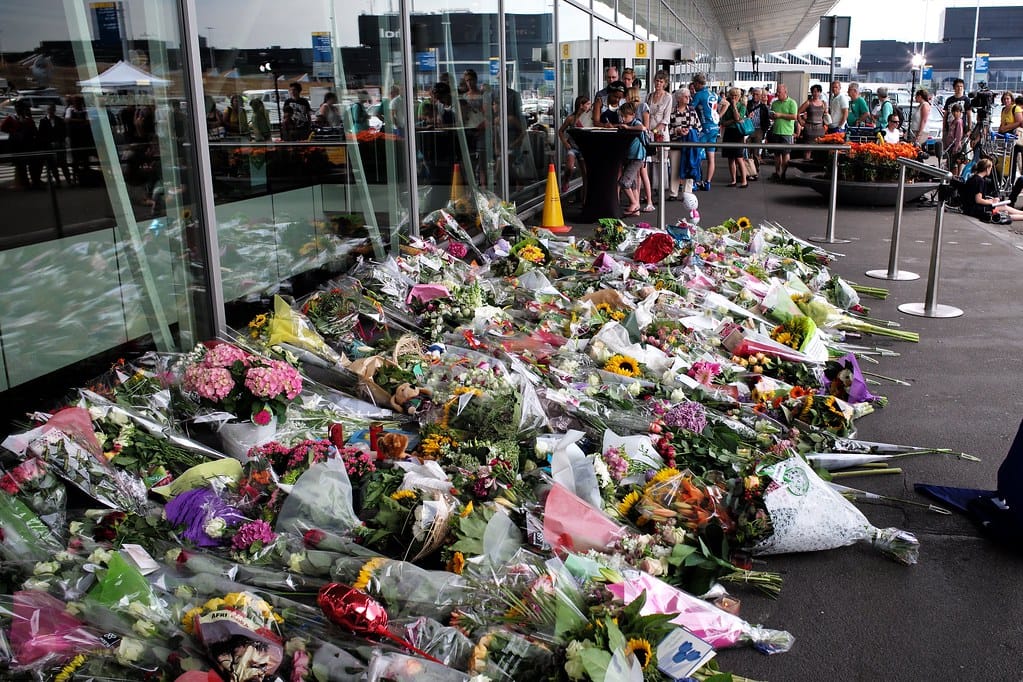
Malaysia Airlines Flight 17 (MH17), on its way from Amsterdam to Kuala Lumpur, was shot down in Ukrainian airspace and crashed nearby Donetsk. All 283 passengers and 15 crew members died. Most of them were Dutch citizens.
According to an official investigation published in October 2015, the airplane was hit from the Buk air defense missile system located in territory controlled by pro-Russian fighters.
In June 2019, the Joint Investigation Team named four suspects responsible for the crash. Three of them were Russian citizens, including a former military intelligence officer and DNR defense minister named Igor “Strelkov” Girkin.
The trial for the MH17 crash began on March 9, 2020, in the Netherlands.
The case spanned almost a decade: court proceedings began in 2005, while hearing on the merits started in 2009. Russia’s position focused on two arguments: that the PCA had no jurisdiction over the GML claim because this case should be heard in Russia, and that Russia couldn’t violate the Energy Charter, since it hadn’t ratified it. Still, the court ruled against Russia.
Russia appealed the ruling, and in 2016 the District Court of The Hague annulled the 2014 decision, having agreed that PCA had no jurisdiction to hear the case.
In February 2020, a Dutch appeals court overturned the 2016 annulment and reinstated the 2014 ruling.
Eighty major law firms wrote a letter to the president detailing the negative implications of the “unification.” They warned that with the abolishment of the High Court of Arbitration, public trust in the court system would be undermined, and economic disputes would be moved to be settled in foreign courts.
Their arguments fell on deaf ears. The unification law was signed on March 12. The High Court of Arbitration was officially dissolved on April 6.
The first agreement on a bilateral cease-fire in Donbass was signed in Minsk at a meeting of the Trilateral Contact Group, under the auspices of Organization for Security and Cooperation in Europe (OSCE), and with participation of the new separatist leaders—Aleksander Zakharchenko of the DNR and Igor Plotnitsky of the LNR. The agreement included 12 provisions on resolving the conflict, such as the decentralization of power in Ukraine via early regional elections, the release of hostages, and the withdrawal of illegal paramilitary factions, equipment, guerrilla fighters, and mercenaries from Ukrainian territory. Still, the cease-fire in Donbass continued to be constantly violated, defying the agreement.
According to the UN, by mid-December, more than 4,600 people had died in the military conflict in Ukraine, and over ten thousand were wounded. The number of refugees exceeded one million.
An arbitration trial on the Bashneft case was developing at the same time, following a claim by Russia’s prosecutor general seeking to return Bashneft’s shares to the state.
By late October, the claim was sustained; the court ruled that the government of the Bashkiria region made an illegal decision to privatize the company, since it had not received permission from federal authorities. On December 9, Bashneft became property of the state.
Within a week, Yevtushenkov was released from house arrest. Vladimir Putin made a public comment on the case: noting that the prosecution did not prove Yevtushenkov’s involvement in the legalization of Bashneft, all charges were dropped. Ural Rakhimov was arrested in absentia, and Russia filed request for his extradition from Austria.
In January 2015, Yevtushenkov claimed that he did not hold any “grudge against the authorities” and did not intend to fold up the rest of his business. In January 2016, the criminal case against him was closed.
In October 2016, it was reported that the oil company Rosneft acquired Bashneft’s controlling stake from the state. According to some observers, the entire case against Yevtushenkov and Sistema was orchestrated by Rosneft’s CEO, Igor Sechin, who took interest in the income-generating asset (Bashneft was among the top 10 best performing oil companies in Russia).
However, the story didn’t end there. In May 2017, Rosneft and Bashneft filed a claim against Sistema seeking $2.9 billion for alleged damages caused to Bashneft during the company restructure. An arbitration court in Moscow sustained the claim, issuing an award of $2.3 billion.
However, a conflict over the election date tainted the process from the beginning. The Rada’s law approved the date of December 7, but at the end of September DNR and LNR leaders said that they would hold the election on November 2, adding that they would not allow the Ukrainian Central Election Committee to participate.
According to Putin, there was an informal agreement during the Minsk negotiations that the election should be held before November 3, but the Rada decided to ignore that unilaterally. Brussels decided to stick to the formal protocol and announced that if Moscow recognized the November 2 elections, more sanctions would ensue.
On November 2, Aleksandr Zakharchenko was elected prime minister of the DNR, and Igor Plotnitsky won the election in LNR. No observer from the OSCE mediating body was present to monitor the voting process. Officially, Russia did not recognize these elections, but said it respected the expression of will by the people of the two republics.
Earlier that year, following a new round of sanctions over the downing of the MH17 passenger jet, Putin signed a decree on Russian countersanctions—slamming the US, Europe, Canada, Australian, and Norway with a food embargo. On the same day that countersanctions were introduced, showdowns took place across the country, with imported food being destroyed by bulldozers.
Some experts estimate that the results of the import substitution were very poor: over the last five years, this policy led to “increased prices, industrial goods shortages, and drug deficits.”
Despite these measures, on December 15, on the heels of the OPEC’s announcement that it would not reduce oil production even if oil prices dropped to $40 per barrel, and following a secret deal on an urgent bond offering by Rosneft, the foreign exchange market went into panic. In two days, the ruble collapsed, its value to the dollar dropping by half. It was the largest drop for the currency in Russia since 1999.
To stop the panic, the Central Bank raised its key rate dramatically—from 10.5 percent to 17 percent—while Putin gave informal directives to large companies to cease foreign currency speculations.
The ruble managed to regain some of its value, but, having lost 41 percent, it was deemed to be one of the worst currencies in 2014, according to Bloomberg.
Western experts observed that the EAEU is largely a political association, but members of the union denied it. With the sanctions regime affecting the economies of both Russia and the EU, the latter said it was ready to change its approach to dealing with the Kremlin and consider establishing a formal relationship with the EAEU. In November 2014, Jean-Claude Juncker, president of the European Commission, offered to Vladimir Putin to start the talks but linked it to Russia’s implementation of the Minsk agreement.
After 16 hours of intense talks, a package of measures for the implementation of the Minsk agreements was adopted. The document included provisions on ceasefire, withdrawal of heavy equipment, and constitutional reform in Ukraine.
However, the second Minsk agreement reached a stalemate as well. According to Alexander Hug of the OSCE Special Monitoring Mission, the sides “didn’t keep even the basic promises they gave as part of the Minsk agreements.”
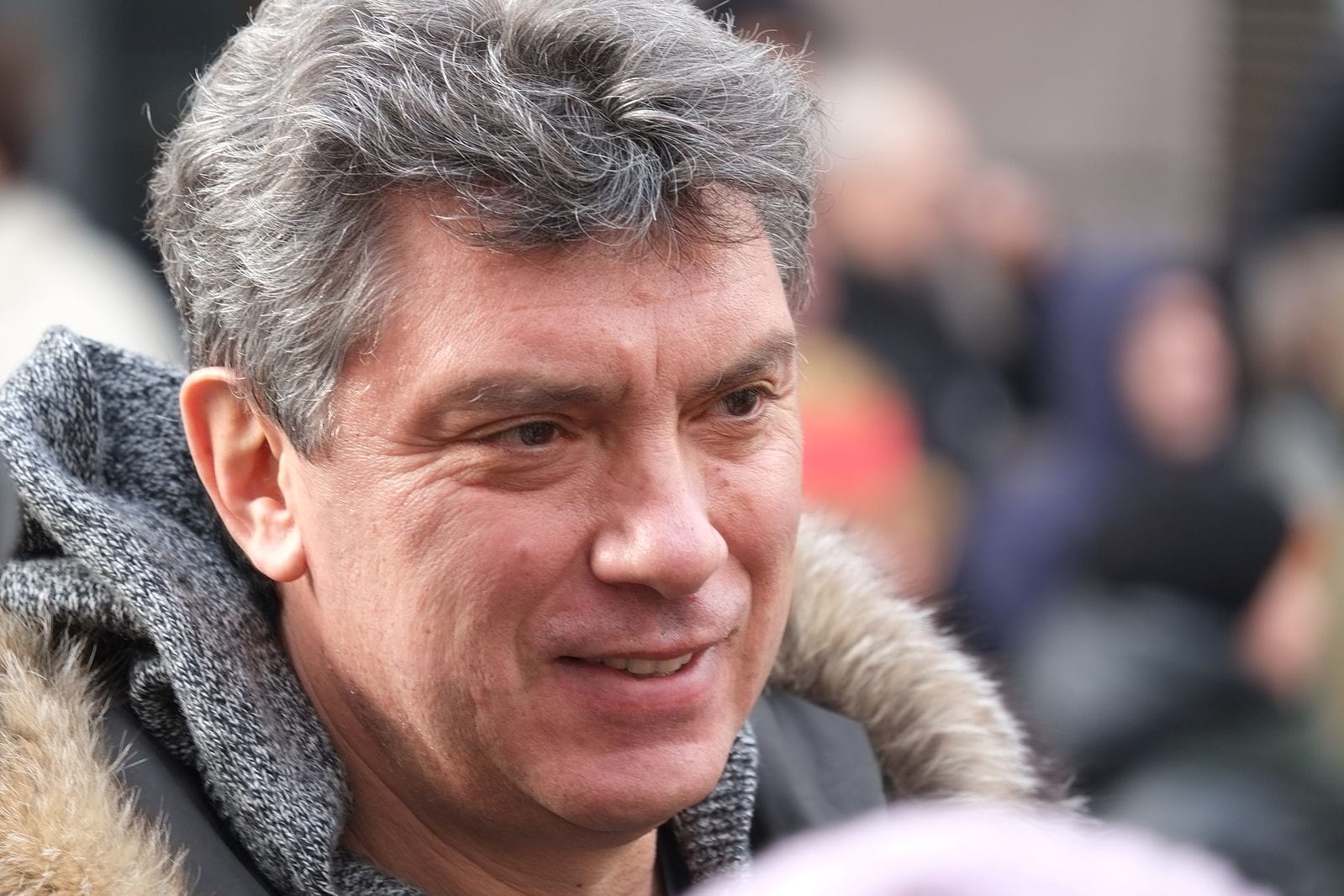
The killing took place just a few days before the “anti-crisis” march of the opposition. Instead of protesting Russia’s tanking economy, tens of thousands of people all across Russia went for a mourning march in Nemtsov’s memory. Over 50,000 people marched in Moscow alone.
In the months before the assassination, Nemtsov was working on a new report detailing the involvement of the Russian military in the war in south-eastern Ukraine. Subsequently, the report was finished and published by his associates.
On March 8, five suspects—Zaur Dadayev, brothers Anzor and Shadid Gubashev, Temirlan Eskerkhanov, and Khamzit Bakhayev—were arrested. According to investigators, they were implicated in organizing and executing the assassination. During the arrest, Dadayev made a confession, which he later withdrew. Another suspect, Bislan Shamayev, blew himself up at the attempted arrest in Chechnya. Investigators also claimed that the suspects received 15 million rubles for the murder of Nemtsov and named Ruslan Mukhudinov (who was put on the international wanted list) as the mastermind of the crime. Mukhudinov was known to be a driver for Ruslan Geremeyev, deputy chief of the Chechen battalion “Sever” (north). Dadayev had previously served in the same battalion, which is now part of Rosgvardia, the internal military force.
After the first arrests, the lawyers for the Nemtsov family observed that the pace of the investigation slowed down, their request to bring in key witnesses for questioning—including Geremeyev, deputy chairman of the Chechen government Adam Delimkhanov, and Chechen president Ramzan Kadyrov—were declined by the Investigative Committee. Kadyrov spoke in support of the arrested men, claiming that “traces of the crime should not be sought in Chechnya, but in Ukraine, [Ukraine’s National Security Agency], and further in the United States.”
On July 13, 2017, the jury sentenced all suspects to lengthy prison terms—from 11 to 20 years. However, the lawyers for the Nemtsov family believe that the case remains unsolved since the mastermind was not found, and the key motives were not established.
In May 2019, the special rapporteur under the Parliamentary Assembly of the Council of Europe concluded that the Nemtsov investigation was a failure and called for the inquiry to be resumed. The author also concluded that such a crime could not have been committed without direct guidance or approval from the Russian authorities.
Khoroshavin was detained in Yuzhno-Sakhalinsk by the officers of the Investigative Committee on suspicion of receiving a large bribe. During a search of his apartment, they found about 1 billion rubles in cash. Khoroshavin was transferred to Moscow, where he was immediately arrested. On March 25, the governor was dismissed from the office due to “loss of trust” of the president.
On February 9, 2018, Khoroshavin was sentenced to 13 years in high security prison and a fine of 500 million rubles. It was the harshest verdict received by a Russian governor in 20 years.
The head of the presidential Human Rights Council, Mikhail Fedotov, said the only reason for passing such a law was an “asymmetrical response to Western sanctions.”
On July 28, the U.S. National Endowment for Democracy was recognized as “undesirable” in Russia, followed by the Open Society Foundations, the U.S. Russia Foundation for Economic Advancement and the Rule of Law, the National Democratic Institute, the Open Russia movement, the Atlantic Council, and others.
According one political commentator, this high-profile arrest was part of the anticorruption campaign propelled by the Kremlin: “it was a time of resonant cases.”
On June 10, 2019, Gayzer was found guilty on all charges and sentenced to 11 years at a high-security penal colony and a fine of 160 million rubles.
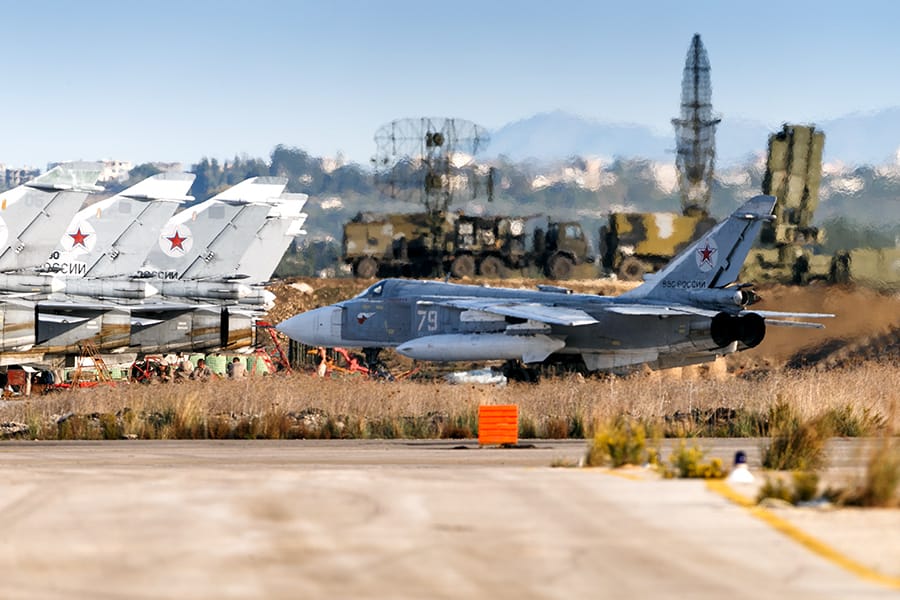
On September 30, Russia, responding to a formal request of Syrian President Bashar Assad, carried out airstrikes on the ISIS positions. It was Russia’s first military operation on foreign soil—beyond former Soviet republics—since the Afghan war.
According to foreign observers, some of the Russian strikes hit the positions of the moderate opposition to Assad, who were also fighting against ISIS and were backed by the U.S.-led coalition.
Syria has been in Russia’s sphere of influence since the mid-20th century. Syrian leaders used to purchase Soviet weapons, and in 1971, Russia opened a naval base in the Syrian port of Tartus. With the collapse of the Soviet Union, military and technical cooperation was suspended, however by the early 2000s it resumed with newly elected presidents Assad and Putin. In 2008, Syria was one of the very few countries that supported Russia’s actions in South Ossetia. Since civil war tore apart the country in 2011, Putin has consistently supported Assad, the “legally elected president of Syria.”
According to analysts, Russia’s decision to launch a military operation in Syria was driven by its desire to preserve a reliable ally in the Middle East, along with other factors, such as Russia falling into international isolation over the annexation of Crimea and military conflict in Eastern Ukraine. The risk of terrorism spilling over the Russian borders was also a consideration. Iran and Turkey joined the Russia-led coalition, each member pursuing its own interests.
On March 15, 2016, Putin announced the mission in Syria successfully accomplished and called for Russian troops to start returning home. Twice after, a Russian withdrawal from Syria was announced, but Moscow continues to maintain its presence in the region.
Inspections of the crash showed that the aircraft was destroyed while in the air. Russia’s main theory was a terrorist attack. This conclusion was reached based on a preliminary analysis and anonymous claims made by the fighters of the ISIS Sinai wing, who allegedly timed the attack to their joining the Islamic State. At the time, Russia was in the middle of its military operation against ISIS in Syria.
Some sources cited by the media pointed out that a small bomb could have been planted in the aircraft fuselage. Further investigation by the Egyptian authorities confirmed this.
On November 6, Moscow made a decision to suspend all flights between Russia and Egypt and evacuate up to 40,000 Russian citizens from Egypt. Due to the ban, the Russian tourism industry suffered billions of rubles in losses, since Egypt is one of the most popular tourist destinations for Russians—about 1 million travelled to Egypt annually.
Regular air travel with Cairo only resumed in September 2018, while charter flights could be restored in April-May 2020.
A company called “RT-Invest Transport Systems” (RTITS) became Platon’s operator. It was also reported that Igor Rotenberg, son of Arkady Rotenberg (Vladimir Putin’s close friend) owned a stake in RTITS.
In the first month of Platon’s operation, the toll was fixed at 1.53 rubles per kilometer, but in March 2016, it was slated to double to 3.06 rubles. Failure to pay the toll could result in a fine of up to 1 million rubles.
In the runup to the Platon launch, numerous protests swept across Russia. Long-haul truck drivers demanded a delay of three years to test and adjust the system. To address the protests, the ministry of transport put a moratorium on the non-payment fine until the situation cleared up, but the drivers did not budge.
On November 30, protesters delivered an ultimatum, threatening to form a column and drive to Moscow if Platon was not suspended. On December 13, they recorded a video address to the president, asking to hold a referendum on Platon, citing Article 3 of the Russian Constitution that stated that the only source of power in the country is its multinational people. The long-haul drivers also underscored that 70% of Moscovites supported their protest, but since their demands were not being heard, they were forced to conclude that “Platon is more important than the people of the country.” In response, Putin suggested abolishing the transport tax but insisted that Platon was necessary.
In February 2016, the government appeased protesters by delaying the Platon toll increase indefinitely. However, it happened a year later, triggering a new wave of protests, but to no avail.
The incident triggered a major crisis in Russian-Turkish relations. Ankara claimed the Su-24 had encroached into Turkish airspace; Moscow insisted the aircraft had remained in Syria’s airspace. Independent analysis showed that both versions of events were flawed.
Calling Turkish actions a “stab in the back,” Vladimir Putin signed a decree imposing economic sanctions against Turkey on November 28. Starting January 1, 2016, Russia banned imports of all food products from Turkey, suspended the visa-free regime and charter operations. Mutual damages amounted to billions of dollars. Turkey was the number one tourist destination for Russians, followed by Egypt. Frozen were major investment projects, such as the Turkish Stream (gas pipeline construction) and construction of a nuclear power plant by Russia’s Rosatom corporation. These measures, however, did not affect the two countries’ cooperation in the antiterrorist coalition that continued to run military operations in Syria.
On June 28, 2016, Turkish president Recep Tayyip Erdogan offered an official apology for killing the Russian pilot, as the Kremlin repeatedly signaled that this would be a mandatory condition to resuming a dialogue. Bilateral relations began to restore soon thereafter.
Vladimir Putin signed a law giving permission to Russia’s Constitutional Court to not recognize rulings of international courts, such as the European Court of Human Rights or the Permanent Court of Arbitration, should such rulings contradict Russian law. The law was enacted despite the fact that Article 15 of the Russian Constitution clearly states, “If an international treaty or agreement of the Russian Federation fixes other rules than those envisaged by law, the rules of the international agreement shall be applied.”
According to some media outlets, the law was linked to the 2014 ruling by the Permanent Court of Arbitration that obligated Russia to pay a $50 billion award to former Yukos shareholders.
During the night of February 8–9, city authorities in Moscow demolished roughly one hundred convenience stores and street kiosks, most of them around metro stations, deeming them to be structures of “dangerous unauthorized construction.” The demolition, which became known as “the night of long buckets,” gained wide resonance in social media networks: many were outraged by the demolition of even those kiosks that had the appropriate paperwork and had won their cases in court. There was a second wave of demolitions in August. This time, 280 kiosks were destroyed.
The first part of the dossier, based on 11.5 million financial documents leaked from Mossack Fonseca, a Panamanian corporate law firm, was published on April 3. It described hundreds of thousands of offshore companies used by politicians, businessmen, actors, athletes, and celebrities to evade taxes and for the purpose of money laundering. On May 9, the Panama Papers archive was opened for public use.
The documents shed light on a cellist and longtime friend of Vladimir Putin, Sergei Roldugin, who owned “a shadow offshore empire worth billions of dollars.” According to the investigation, Roldugin was the owner of a company called Sonnette Overseas, based in the British Virgin Islands, and another named International Media Overseas, based in Panama. In these companies, Roldugin was represented by people who owned shares in two other firms, Sandalwood Continental and Sunbarn. These companies were financed through off-exchange sales of shares in Rosneft and Gazprom, which had been donated by wealthy businessmen or bought using special loans from the state-run Russian Commercial Bank, based in Cyprus. The companies connected to Roldugin also owned shares in two of Russia’s biggest national enterprises, Video International and Kamaz.
The Panama Papers also named dozens of Russian bureaucrats and politicians, including Aleksei Ulyukayev, who then ran the Ministry for Economic Development, Andrei Turchak, the governor of the Pskov district, and State Duma deputy Suleyman Geremeev (brother of Ruslan Geremeev).
Putin called the dossier an attempt to upset Russia’s domestic politics and make the country “more compliant.” On the eve of publication, Putin’s press secretary, Dmitri Peskov, warned of an imminent “informational attack” against Russia.
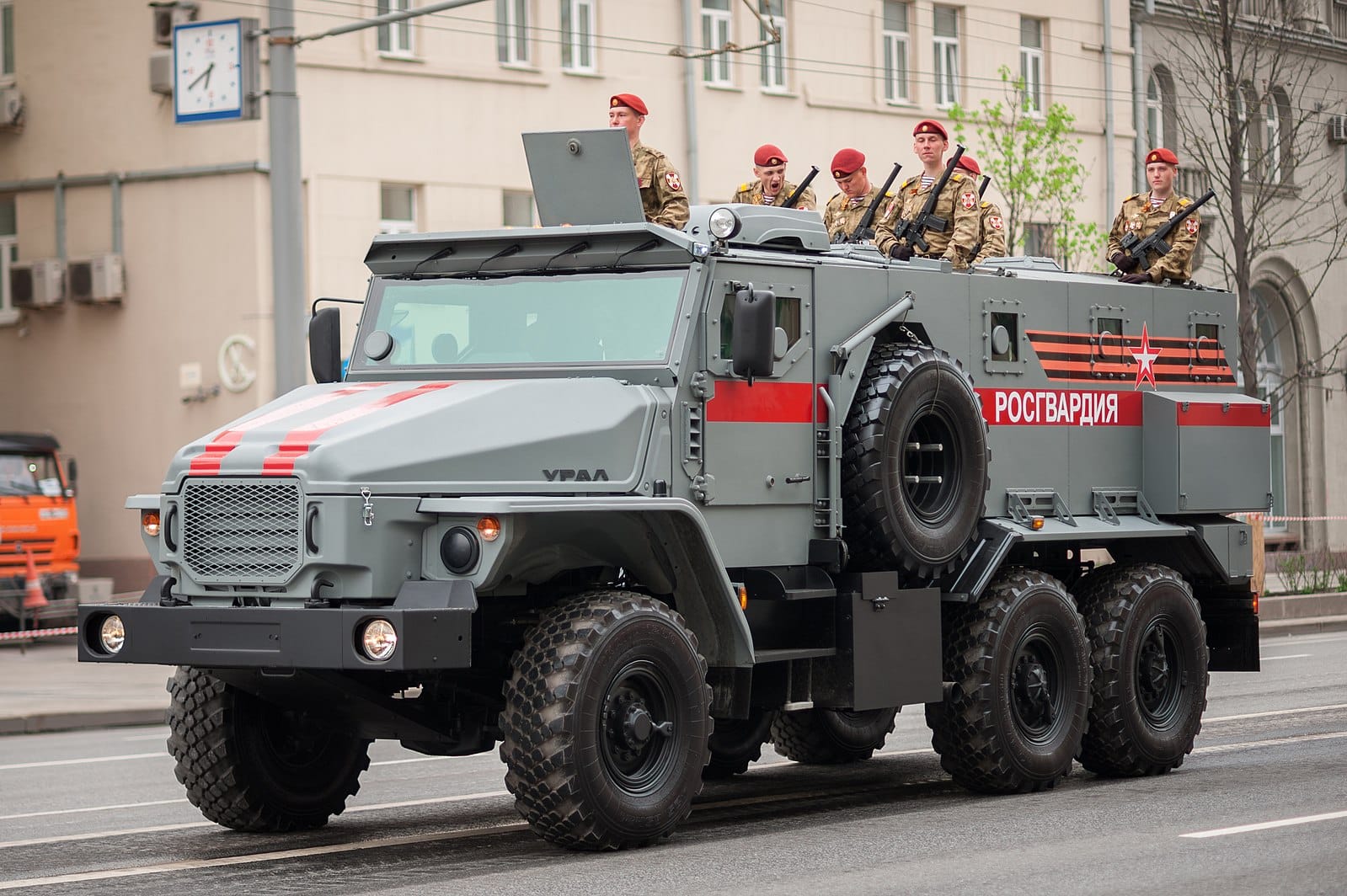
In another change, the Federal Drug Control Service and the Federal Migration Service were dissolved and their functions were absorbed by the Ministry of Internal Affairs.
Viktor Zolotov, who had previously been the chief of security for the president, became the director of the Russian Guard, which currently counts over 340,000 members. Analysts debated the reasons behind the new force’s creation. Some saw it as evidence of a power crisis, or as a demonstration of strength. Some have also compared it to the Praetorian Guard—the bodyguards of Roman emperors—or to the oprichniks—the bodyguards of Ivan the Terrible.
Fourteen children died during a storm on Lake Syamozero, in the republic of Karelia, while on a boating trip. The children, ages 12 to 14, had been at a local recreation camp. This was the largest loss of life among children in recent memory. After an investigation, several camp counselors, along with the deputy director of the camp, were arrested for having allowed the boats to launch despite storm warnings. It also emerged that the company operating the camp, which was organized for low-income and other needy children, had been the subject of repeated complaints by campers and regulatory authorities. Public outrage was also directed at Pavel Astakhov, the commissioner of children’s rights, who said to the young survivors of the disaster, “How was your swim?” On September 9, Astakhov left his post, supposedly of his own free will.
Nikita Belykh, head of the Union of Right Forces party and leader of the Kirov district, became the first ever governor to be arrested for corruption. According to the official version of events, Belykh was arrested at a restaurant in central Moscow after receiving four hundred thousand euros as a bribe from Yuri Zudheimer, the owner of the Novovyatsky ski factory. Belykh did not deny receiving the cash. He argued that the money was not a bribe but rather a donation to help repair infrastructure in Kirov in the runup to the State Duma elections. Putin dismissed Belykh from his office on July 28 citing a “loss of trust.” In March of 2018, an investigative committee issued new charges of bribery against Belykh. The ex-governor’s court case began in August of 2017 and he was convicted of bribery on February 1, 2018. Belykh was sentenced to eight years at a prison colony and fined 48 million rubles.
The law toughened penalties for advocating terrorism or defending terrorists online (punishable with up to seven years in prison) and for financing extremism (punishable with up to eight years in prison). In addition, criminal liability was introduced for failing to report criminal activity to the police.
Most of the debate about the law centered on the requirement that telecommunication providers store all voice calls, data, images, and text messages for six months—and store metadata (such as the location, time, and recipient of transmissions) for three years. The providers were obligated by law to share this data with the FSB upon request. Refusal to cooperate would result in a fine of between eight hundred thousand and one million rubles.
Telecommunication operators claimed that following the new requirements would cost them 2.2 trillion rubles.
For the first time since 2003, elections to the State Duma took place using a mixed voting system: 225 deputies were selected using party lists (proportional representation) and 225 were chosen in single-mandate districts (a majoritarian system). Ella Pamfilova, the new head of the Central Electoral Commission, supervised the voting. Previously the commissioner for human rights, Pamfilova had replaced the disgraced Vladimir Churov, whose reputation was seriously damaged after the 2011 Duma elections and subsequent protests. With voter turnout at 47.9 percent, the United Russia party once again secured a constitutional majority, winning 54.2 percent of the vote. The Communist Party received 13.3 percent, the Liberal Democratic Party won 13.1 percent, and Just Russia got 6.2 percent. In single-mandate districts, one representative from the Rodina party and one from Civic Platform also won seats, as did one self-nominated independent candidate.
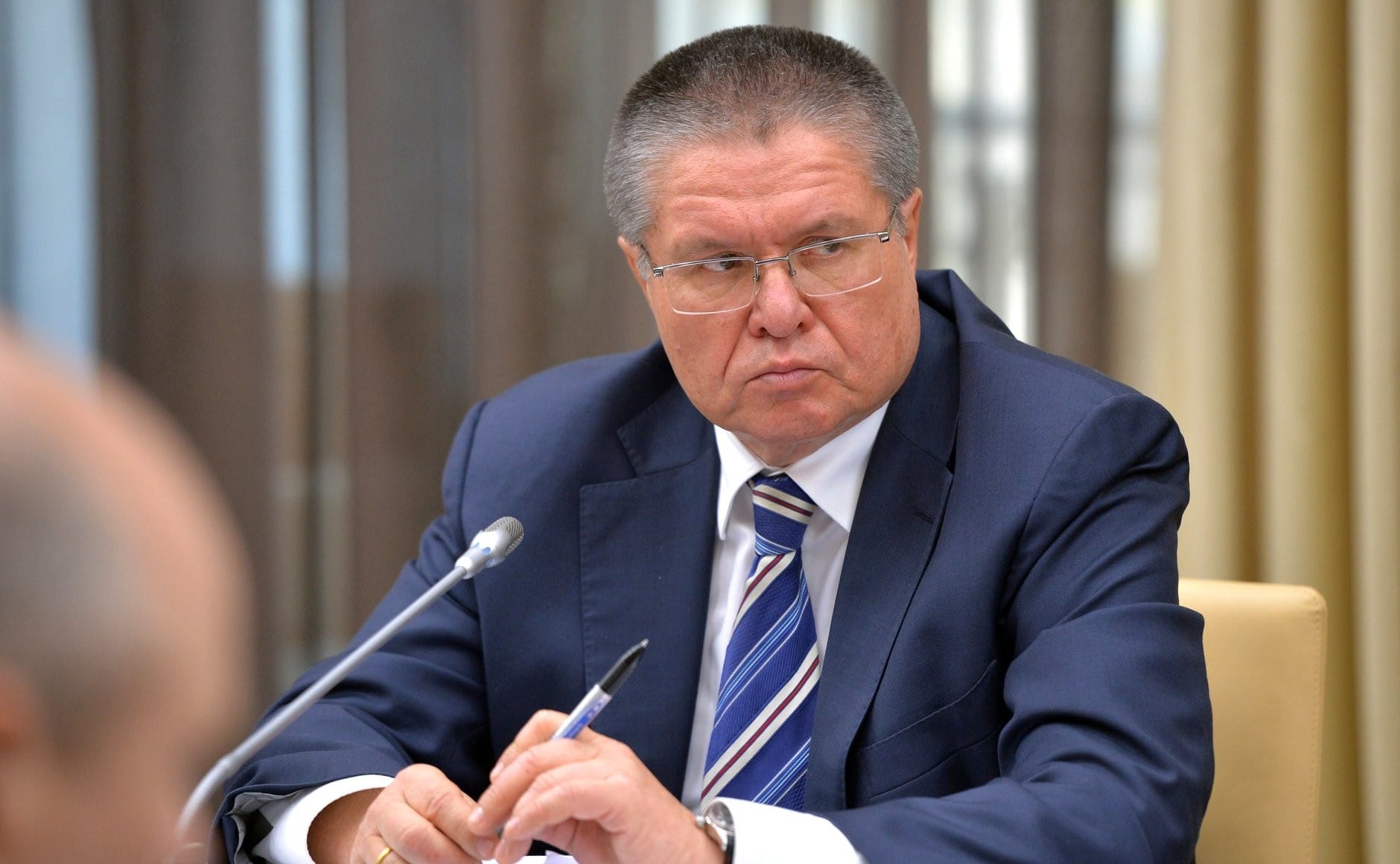
Ulyukayev became the highest-ranking member of government to be charged with a criminal offense since 1991.
According to the investigation, Ulyukayev solicited bribes from representatives of Rosneft in exchange for a favorable finding by the Ministry of Economic Development that would allow Rosneft to buy 50 percent of the shares in the oil company Bashneft. The bag containing the cash bribe was given to Ulyukayev personally by the head of Rosneft, Igor Sechin, in a sting operation overseen by the FSB.
On November 16, Ulyukayev was fired from his post and placed under house arrest. His trial began on August 7, 2017. Ulyukayev maintained his innocence and called his prosecution a “provocation.” On December 15, 2017, he was sentenced to eight years at penal colony and fined 130 million rubles.
According to observers, the high-profile anticorruption prosecution was beneficial to the Kremlin, which was preparing for a presidential election at the time. The chief beneficiaries of the ex-minister’s downfall were members of what is known as the “siloviki”—politicians and bureaucrats who came from the military or security services.
In March of 2017, the results of the technical investigation were announced, which showed that the pilot had retained control of the plane until the moment of impact. However, the Ministry of Defense dismissed theories of the crash that pointed to pilot error.
In December 2019, a criminal investigation into the crash was closed due to a lack of evidence. Yet the decision to close the investigation was classified as a state secret.
A series of reports about the hacking of the Democratic National Committee (the organizing body of the Democratic Party), along with the publication of stolen correspondence by entities like WikiLeaks, DCLeaks, and Guccifer 2.0, raised the issue of Kremlin interference in the elections. In October, the US government produced evidence that connected the hacking of the committee to Russian intelligence services and accused Moscow of attempting to influence the election. Vladimir Putin called the allegations “nonsense.”
On January 6, two weeks before Trump’s inauguration, US intelligence services published a report detailing evidence of Russian interference in the election. President-elect Trump dismissed the findings.
Aleksei Navalny’s Anti-Corruption Foundation released an investigative documentary, He Is Not Dimon to You, on YouTube. “Dimon” is a slang form of the name Dmitri, and the film chronicled the large and complicated web of corruption through which Prime Minister Dmitri Medvedev accumulated various properties estimated to be worth 70 billion rubles. Within a week, the film was viewed seven million times (as of March 2020, the viewership had reached 33 million). Following the release of the report, Navalny called on his supporters to stage countrywide anticorruption protests.
On March 26, tens of thousands of people across Russia took part in the largest protests since the winter of 2011–2012—resulting in mass detentions as police arrested a record number of people (over one thousand) in Moscow alone. One of the unique features of these protest, as compared to previous ones, was the widespread participation of young people and students.
Eight people were arrested in connection with the attack a few days after the bombing. Another three—including the alleged mastermind—were arrested later. Among those arrested were citizens of Kyrgyzstan (the suicide bomber was also said to be Kyrgyzstan-born), Uzbekistan, and Russia. According to investigators, the suspects had engaged in recruitment on behalf of the Islamic State. Two of the suspects reported that members of the security services had kidnapped and tortured them in an effort to secure a confession. On December 10, 2019, a court sentenced all of the accused to lengthy prison terms ranging from 19 years to life in prison.
Aleksander Solovyov, governor of the Udmurtia republic in Russia’s western Urals region, became another in a series of politicians caught up in a corruption scandal. He was dismissed from his post due to a “lack of trust” shortly after being arrested.
According to investigators, between 2014 and 2016, Solovyov had received bribes totaling 139 million rubles in cash as well as shares in commercial companies worth 2.7 million rubles. The case went to court in December of 2018. In January of 2020, Solovyov used a court appearance to profess his innocence despite the fact that he had previously admitted guilt to at least some of the charges. As of March 2020, the case was ongoing.
A new wave of anticorruption protests spread throughout Russia in June. Approximately one hundred thousand people took part in over 150 Russian cities and towns. Eighteen hundred people were detained—including four hundred in Moscow and three hundred in St. Petersburg alone.
In Moscow, an officially sanctioned protest was planned for Sakharov Avenue. However, due to interference by city authorities in preparations for the protest, Aleksei Navalny suggested that participants instead stage a “public stroll” on Moscow’s Tverskaya Street. While on his way to the event, Navalny was arrested in front of his apartment building and given 30 days administrative detention for calling for people to participate in an unsanctioned protest. Four people faced criminal charges as a result of participating in demonstrations; two were minors at the time of their arrest.
According to public surveys, 39 percent of Russians approved of the anticorruption protests of June 12, while 37 percent did not.
According to media reports, one motivation for city authorities to undertake such a costly project was the desire to avoid the redistribution of the capital’s budget to other regions.
In May, protests began in the city against the renovations and in support of residents’ property rights. Many people expressed concern and dissatisfaction with the criteria used to determine which buildings would be demolished, the process of resettlement to new housing, and the lack of communication between city authorities and citizens.
The first demolition in the city took place in August 2018. By the end of 2019, sixteen thousand people had been resettled.
According to law enforcement, the phone calls were a coordinated attack using IP phones, which allowed the calls to be routed through the internet, making locating their origin difficult. On September 25, Interfax reported that a resident of the Stavropol area connected to the Islamic State may have been responsible for the “telephone terrorism.” On October 5, the Investigative Committee reported that it had established the identities of four individuals living abroad who were responsible for the “telephone terrorism.” Most of the calls, according to investigators, had originated in parts of Syria controlled by the Islamic State. More than three thousand criminal cases were opened in connection to the bomb threats.
The calls continued until December and 2.6 million people were evacuated from thousands of buildings in over 150 cities across Russia. The financial cost of the bomb threats was estimated to be 300 million rubles.
On December 20, the State Duma adopted legislation that would increase the penalty for “telephone terrorism” to up to 10 years in prison.
This law was a response to a demand made by the American government that the Russian international television channel RT America register as a “foreign agent.” The request was made based on the channel’s role in election interference as established by a US intelligence report issued earlier in the year. On November 13, RT America registered under the new designation.
On December 2, 2019, Vladimir Putin signed a law expanding the list of media outlets that could potentially receive the designation of “foreign agent.” The new formulation allows for individuals who disseminate media reports to be given this designation. Independent journalists as well as media outlets are now both at risk of being labeled in this way.
On March 12, British Prime Minister Theresa May demanded an explanation from Moscow. When it was not forthcoming, London expelled 23 Russian diplomats. As a sign of solidarity, around 20 Western countries followed suit, kicking out a total of 130 individuals. The Russian Foreign Ministry responded to the expulsion of diplomats in kind.
Skripal was a former GRU (Russian military intelligence) officer, who had been convicted of spying for the British secret services and exiled to the West as part of an agent swap. Experts proposed two versions of events: either an act of revenge by members of the Russian special services, or a warning from Moscow to other defectors (or a combination of the two). In October the previous year, Putin had spoken publicly about Skripal, calling him a “traitor to the motherland” and a “piece of scum.”
On June 30, it was reported that two British citizens had been poisoned with the same substance, having picked up a discarded bottle containing it. One of them, Dawn Sturgess, passed away on July 8. This only exacerbated the diplomatic crisis.
As a result, the United States imposed financial restrictions and a ban on the sale to Russia of weapons, goods, and dual-use technologies. (A second round of US sanctions was introduced on August 26, 2019, on transactions involving Russian state debt.)
On September 5, Scotland Yard named the poisoning suspects as Russian citizens Alexander Petrov and Ruslan Boshirov, who had visited Britain on March 2-4. On September 13, Petrov and Boshirov gave a surprise interview to TV station RT, saying that they had gone to Salisbury to “see the cathedral.” However, a joint investigation by Bellingcat and The Insider revealed that both men were members of the Russian special services. The publications also uncovered their real names: Alexander Mishkin (Petrov) and Anatoly Chepiga (Boshirov). In February 2019, a third participant was identified as Denis Sergeyev, also a GRU operative.
The British police charged Petrov and Boshirov, further concluding that Putin had likely approved the operation. This viewpoint had been voiced earlier by Theresa May.
From the very beginning, Moscow denied any involvement in the poisoning. On March 4, 2019, on the anniversary of the incident, the Russian embassy published a 50-page report entitled “Salisbury: Unanswered Questions,” which set forth the Russian position and highlighted errors in the British police reports and media coverage.
Two years on, the investigation continues—the British police have yet to present their final version of the events.
In the run-up to term number four, the president did almost no campaigning at all, merely setting out his program as part of his annual address to the Federal Assembly under the slogan “Russia Looking to the Future.” The program on the whole was conservative, with no major reforms promised.
The election stood out for featuring seven other candidates, including TV presenter Ksenia Sobchak, representing the interests of the “protest electorate.”
Putin won with 76.7% of the vote on a turnout of 67.5%. Pavel Grudinin (Communist Party) came second with 11.8%, with the perennial Vladimir Zhirinovsky (LDPR) in third on 5.65%. Sobchak scooped 1.7%, taking fourth place in the presidential race.
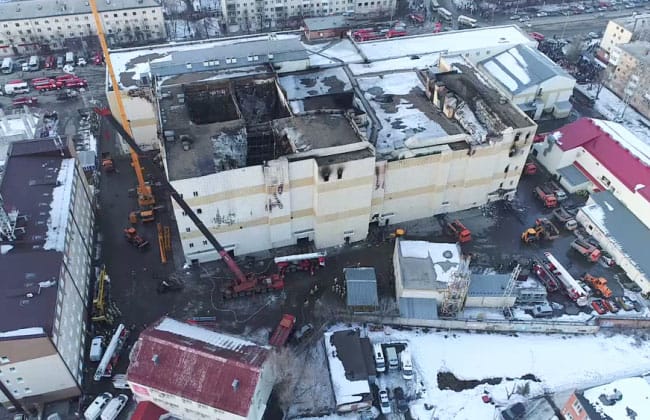
As a consequence, 12 people were arrested, including the former building owners and managers, on charges of violating fire safety rules. A court case opened on April 12, 2019; the hearing is ongoing.
As in the case of other tragedies, victims expressed despair and distrust of the authorities. A major rally took place in Kemerovo on March 27, demanding the publication of the exact number of victims and the dismissal of the local administration. The vice-governor of Kemerovo Region, Sergey Tsivilev, who attended the gathering, asked one of the protesters: “Are you using the tragedy for self-promotion?” It turned out that the man had lost his wife and three children in the fire. Later, Tsivilev was forced to kneel before the crowd and ask for forgiveness.
When regional head Aman Tuleyev resigned on April 1, Tsivilev took over as acting governor.
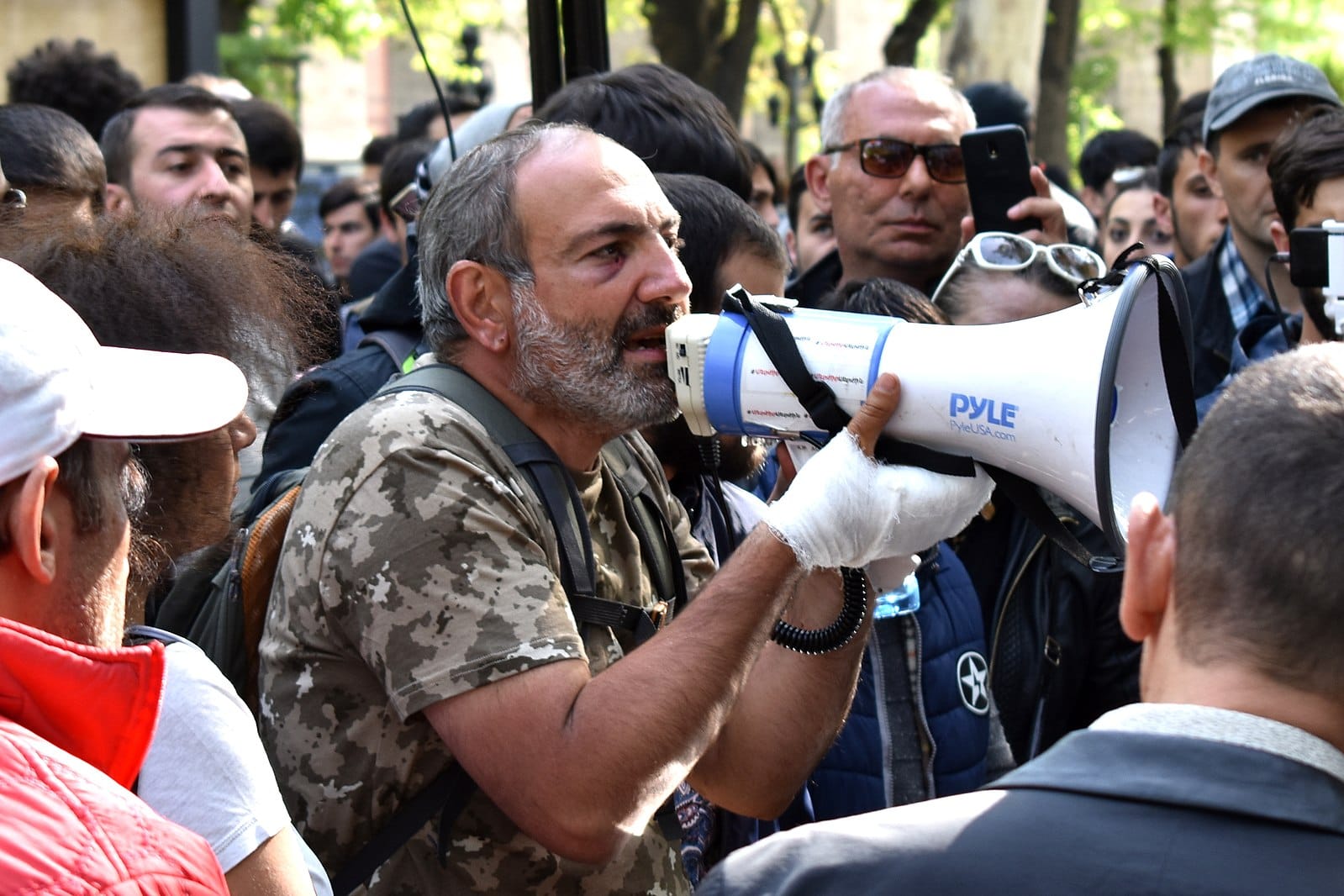
Earlier that year, in March, Armenia had seen the start of protests organized by the head of the opposition Elk (Exit) Party, Nikol Pashinyan, which became dubbed the Velvet Revolution. On April 13, thousands of demonstrations flared up in Yerevan, which only intensified after the appointment of Sargsyan.
On February 22, Sargsyan agreed to meet with the opposition, but refused to resign, which only spurred more anti-government protests. Mass arrests got underway in Yerevan, among them Pashinyan and two of his associates. However, the people refused to disperse.
On April 23, Sargsyan resigned, stating in his farewell address to the nation that he had made a mistake. Russia called for a peaceful resolution to the conflict and the handover of power in Armenia.
The confrontation entered the final phase: a struggle for the office of prime minister broke out in parliament between the opposition and the ruling coalition. At an extraordinary sitting on May 1, most parliamentarians rejected Pashinyan’s candidacy, whereupon he urged his supporters to take to the streets once again. On May 2, against the backdrop of this new wave of protests, the second largest bloc in the National Assembly, the Tsarukyan Alliance, sided with the opposition. On May 8, Nikol Pashinyan was elected prime minister of Armenia. On May 14, he met with Vladimir Putin in Sochi.
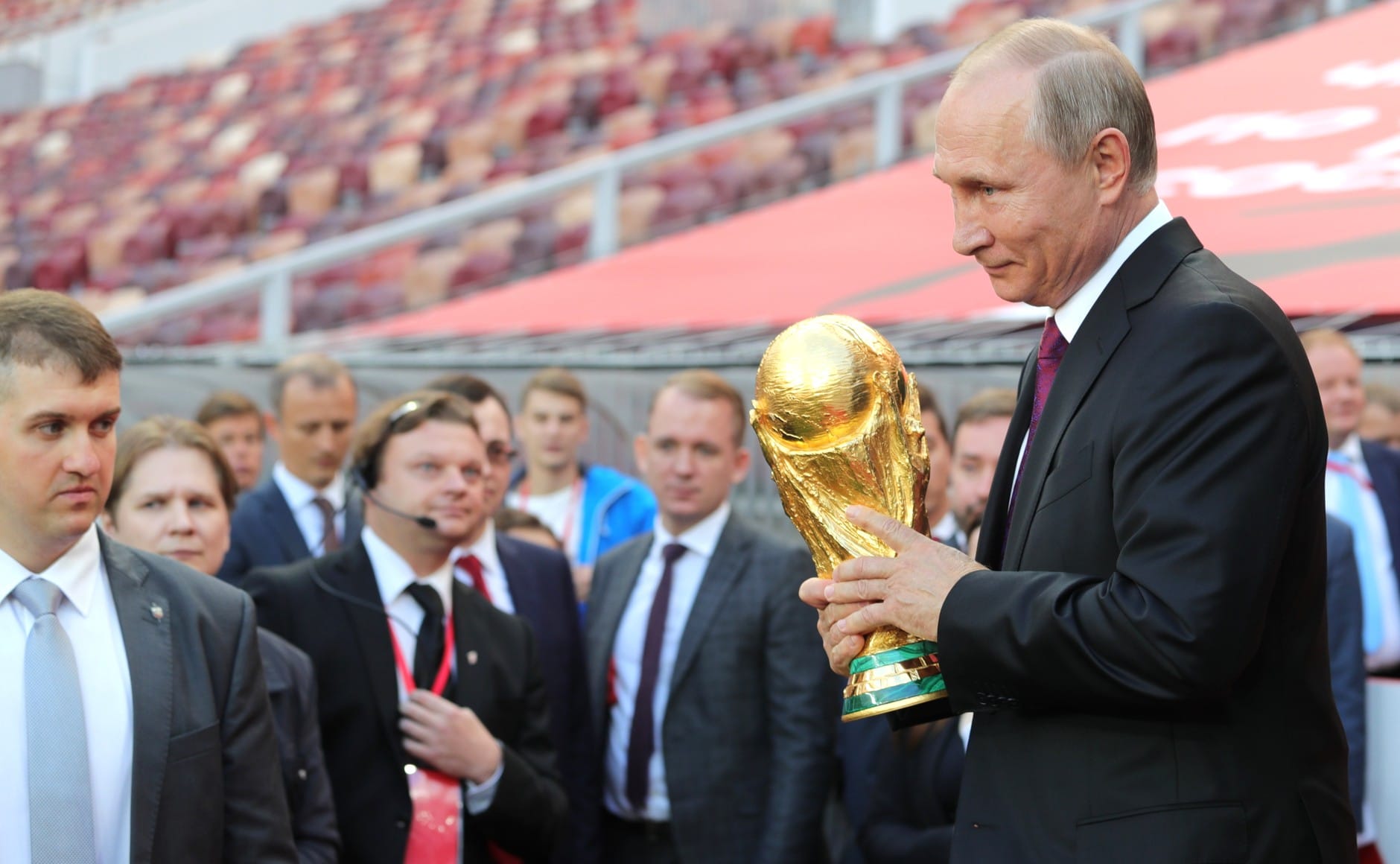
The price tag of the event was estimated at 883 billion rubles, making Russia’s World Cup the most expensive in history. Part of the cost was transferred to regional budgets, forcing a cut in funding for essential social services.
In 2015, during a corruption scandal at FIFA, the former head of the organization, Joseph Blatter, stated that the 2018 World Cup had been awarded to Russia under a secret deal. However, two years later, a special investigation conducted by FIFA itself refuted the allegations.
The championship was held amid the political isolation of Russia and calls for a complete boycott. But the tournament exceeded all expectations, both within Russia and abroad, dispelling the gloomy forecasts of critics. The FIFA Council went so far as to recognize the 2018 World Cup as the best and most profitable in history. Even the performance of the much-maligned Russian national team defied the odds, reaching the quarter-finals for the first in its history (not counting the USSR), and restoring pride among the Russian populace. Yet despite acknowledging Russia’s burnished international image, Western politicians made clear that this did not erase the issues that had isolated the country in the first place, namely the annexation of Crimea, the invasion of Syria, and contract killings abroad.
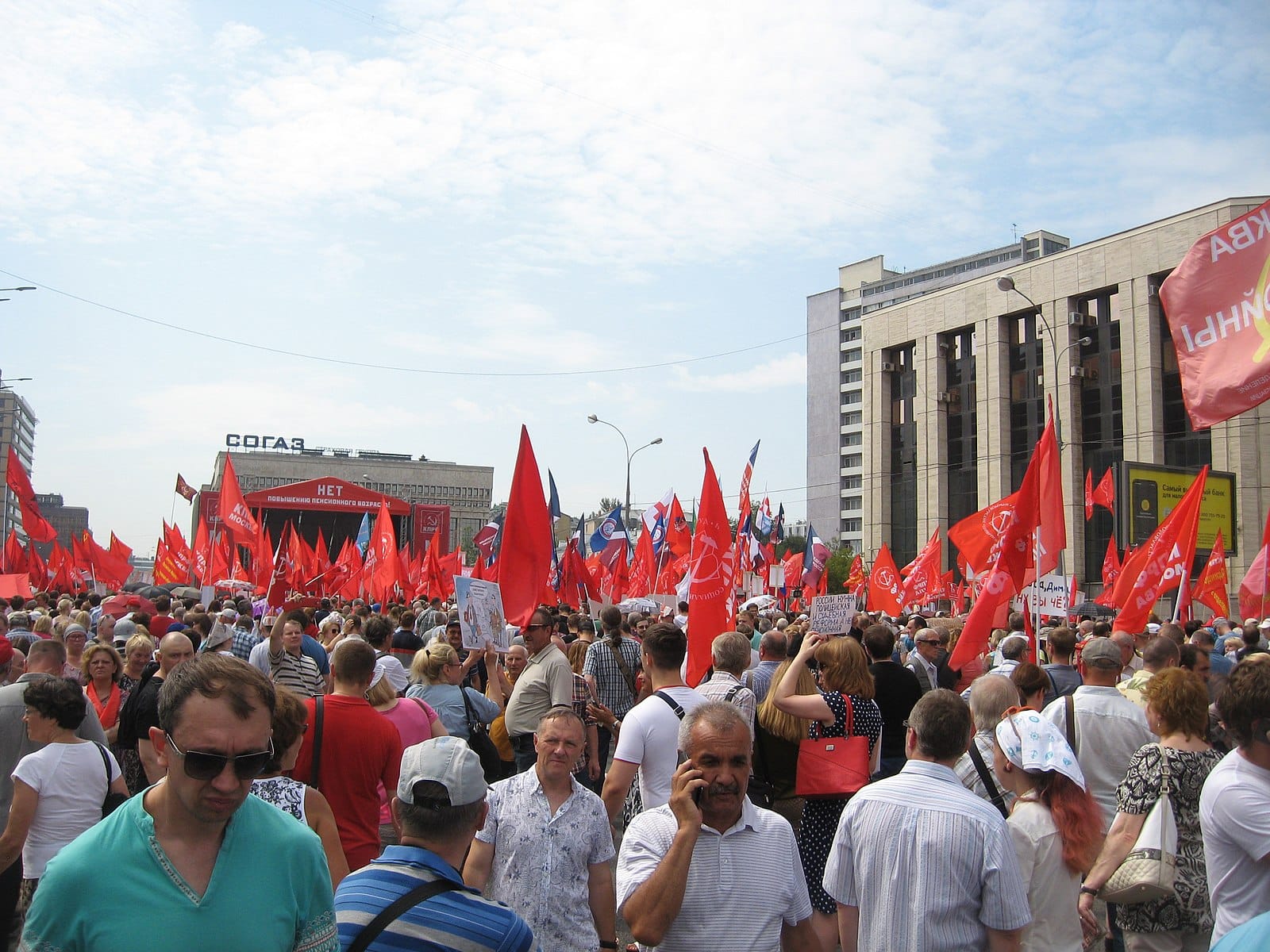
Initially, the bill proposed raising the retirement age for men from 60 to 65 years old, and from 55 to 63 for women. On July 19, the bill passed in its first reading. That moment marked the beginning of the protest wave across Russia. People were upset by the lack of public dialogue on the issue and the ensuing financial losses due to the retirement age increase (many pensioners in Russia continue to work). Several political forces were organizing the protests: the Communist Party and the liberal opposition led by Aleksei Navalny. A Change.org petition to cancel the pension reform was signed by 3 million people. According to polls by the Levada Center, about 90% of Russians spoke against the reform.
On August 29, in a televised address, Putin offered a few concessions, including setting the new retirement age for women at 60 (instead of 63) years old. This did little to satisfy the public outrage. However, despite widespread public discontent, the protests failed to attract massive crowds. The largest rally, which took place in Moscow on September 2, brought together about 9,000 people.
The law on pension reform was signed by Putin in October and went into effect on January 1, 2019. Protests against the reform continued throughout the fall of 2018 and well into 2019. The reform had one tangible political consequence: a noticeable decrease in Putin’s approval ratings, down to 33%, according to the January 2019 polls.
In the first three cases, United Russia candidates lost to their competitors—the Liberal Democratic Party (LDPR) candidates in Khabarovsk and Vladimir regions, and to the Communist candidate in Khakassia. In Primorsky Territory, the first election with its runup had to be annulled due to significant violations. In the new election, the United Russia candidate (who eventually won) had to run as an independent to reduce the negative impact of his party brand.
Political scientists linked these developments to a sharp decline in United Russia’s approval rating and the country’s overall social and political deterioration.
Following a year-long investigation, Russia’s Investigative Committee confirmed that Roslyakov was the only suspect. The motive for the crime was said to be a psychological crisis resulting from humiliations by his peers due to his poor financial situation. But Roslyakov’s acquaintances disagreed. Some media compared the Kerch shooting with the 1999 Columbine High School massacre.
As the government response to the tragedy, Vladimir Putin demanded tightening gun control in Russia.
According to Moscow, the Ukrainian ships had illegally crossed Russian maritime borders, while Kyiv cited a 2003 agreement between the two countries guaranteeing free sea traffic in the Kerch Strait and the Azov Sea, and accused Russian border patrol of illegal action. The conflicting interpretations are rooted in Russia’s annexation of Crimea. Russia considers the peninsula and adjacent waters its own territory; Ukraine doesn’t recognize it.
The incident immediately drew international attention. The United States and United Kingdom voiced their support for Kyiv, the European Union spoke about introducing new sanctions against Russia. Certain sanctions by the U.S., EU and Canada, did ensue in March 2019, and the existing “black lists” (of people who are banned from entering these countries and whose assets are frozen) were expanded to include Russian persons implicated in the incident.
On September 7, 2019, during a mutual exchange of the detainees with Ukraine, Russia released all the captured Ukrainian sailors, and on November 18, 2019, handed over the ships.
On February 1, U.S. President Donald Trump’s administration announced it would suspend participation in the Intermediate-Range Nuclear Forces Treaty (INF) signed in 1987 by then-president Ronald Reagan and Soviet General Secretary Mikhail Gorbachev. Trump made his intentions regarding INF known back in October 2018.
On February 2, Russia responded in kind. President Vladimir Putin ordered the defense ministry to start developing the formerly banned classes of missiles.
According to Russia’s Federal Security Service (FSB), Calvey stole 2.5 billion rubles ($31.6 million) from Vostochny Bank using a financial scheme that involved the First Collection Bureau, a collection agency. It was alleged that in 2017 Baring Vostok transferred to the bank shares of the International Financial Technology Group (IFTG) toward a debt payment. Baring Vostok’s estimate of the share price was 3 billion rubles ($38.2 million), but some bank shareholders claimed it was 600,000 rubles ($7,600).
According to Calvey, the underpricing could have been temporary due to the shares’ operating restrictions, which were lifted in 2018. He also claimed the criminal case is connected to a business conflict between Baring Vostok and the main minority shareholder of Vostochny Bank, Artyom Avetisyan.
Calvey’s business partner Philippe Delpal, a French citizen, was also charged, along with two other Baring Vostok top managers, as was the director of the First Collection Bureau. They all faced up to 10 years in prison.
In April, the court released Calvey from custody and placed him under house arrest. With Delpal, this only happened in August, prior to Vladimir Putin’s visit to France.
In September, Russia’s Investigative Committee received the results of the expert evaluation of the IFTG market price, which was deemed to be at 3.8 billion rubles ($48.4 million), not 600,000 as had been maintained by the investigation. The defendants’ lawyers demanded the case be closed due to lack of evidence of a crime, but to no avail.
In December, the charges in the case were amended from fraud to embezzlement. In February 2020, pre-trial restrictions were finally relieved for the three remaining defendants, who were released from custody and placed under house arrest. The case remains open.
Calvey has become the highest-profile foreign investor arrested in Russia in recent years. The Baring Vostok case was named as one of the factors that caused capital outflow from Russia in 2019, along with the sanctions regime and the U.S. foreign trade policy. According to presidential business ombudsman Boris Titov, in 2019, the number of criminal cases against Russian entrepreneurs increased by a third, with over 300,000 crimes being registered, the majority of them under what he called the “elastic” fraud article of the Criminal Code.
As a control measure against “disrespectful” information about the state, the law envisions blocking websites. Violations of the law incur financial penalties, from 30,000 to 1.5 million rubles ($380 to $19,000).
The law came into force on March 29, complementing an array of state tools to control information. According to one media outlet, “now it seemed that anything could be justified by the fight against unverified news.”
According to the investigation, Abyzov sold four energy companies at a discounted price: 4 billion rubles ($51 million), as opposed to what the investigation said was a fair price of 186 billion ($2.4 billion). Abyzov did not admit guilt, claiming that he had been paid a market price.
The court ruled to place the former minister in detention, further arresting his assets in June. In August, Abyzov was additionally charged with illegal business practices that he had allegedly engaged in while in office. The investigation continues.
Some journalists have argued that Abyzov’s case has shown that the state essentially allows federal security forces to interfere with commercial disputes.
The law envisions that under threat, Runet can be placed under the centralized management of Roskomnadzor (Russia’s communications watchdog), which would control traffic and information flows, including incoming from abroad. Communication providers are obligated to install special equipment supplied by Roskomnadzor that will route all traffic. In addition, a national domain name system (DNS) will be created.
According to analysts, it is impossible to isolate Russia from the global internet, but the law can be used to temporarily block internet service, e.g. in the case of protests.
On November 1, the law came partially into force. It will be fully enacted on January 1, 2021.
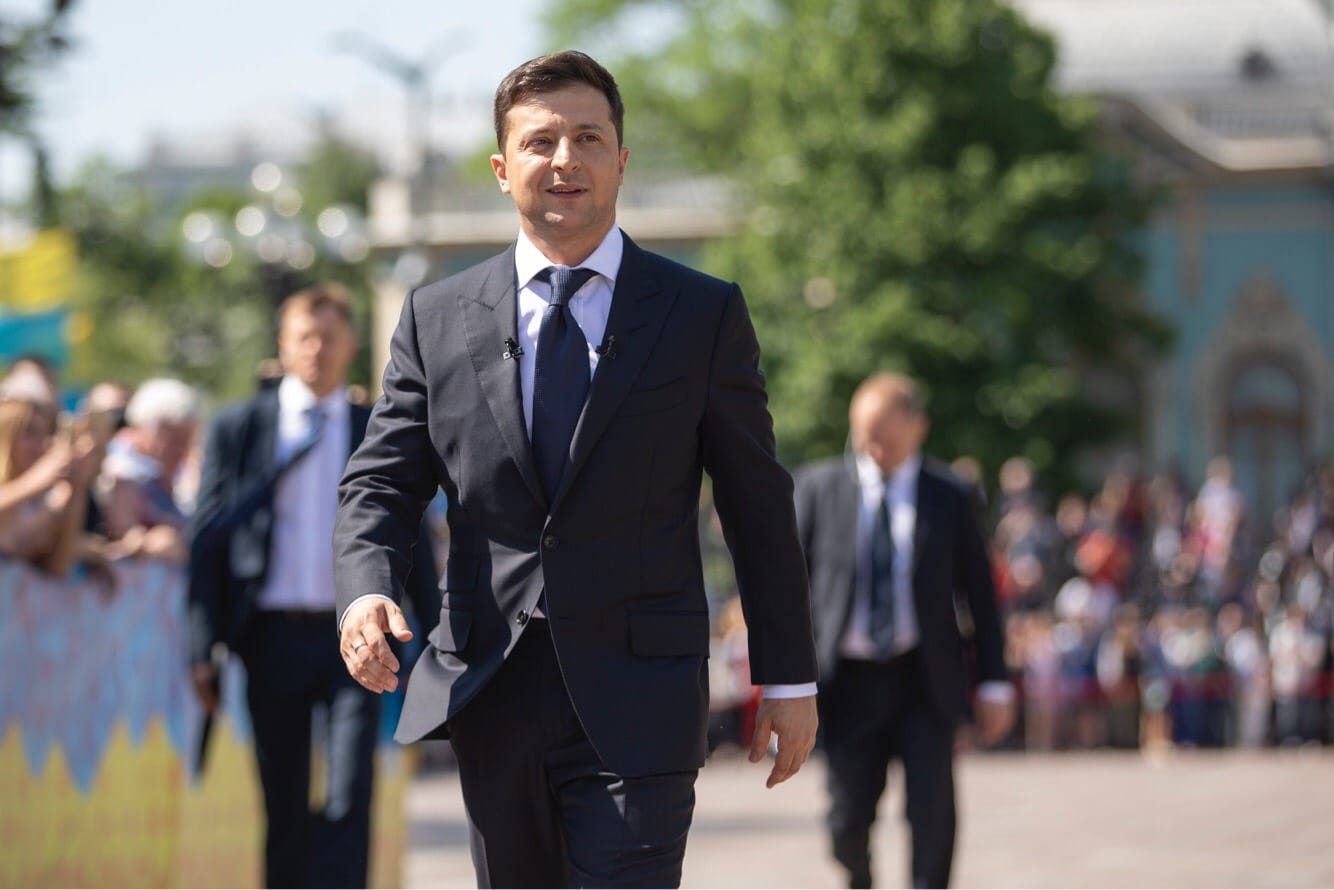
On April 21, in the runup election Zelensky claimed victory with 73.23% of the vote. Notably, he won in all Ukrainian regions (with the exception of Lviv), defying traditional division lines between pro-European west and pro-Russian east.
Russia recognized the election results, and Vladimir Putin said that he was ready to restore the relationship, albeit “not unilaterally.” Signaling that Moscow will not give Kyiv any advances, at the end of April, Putin signed a law to simplify procedures to obtain Russian citizenship for the residents of the Donetsk and Luhansk People’s Republics (DNR and LNR).
Zelensky called the resolution of the military conflict in Donbass one of his foreign policy priorities, branding himself as the “president of peace.” In September, following negotiations, Russia and Ukraine held their largest prisoner exchange so far, which observers called a first step toward normalization of the bilateral relationship.
The first official meeting between Putin and Zelensky took place on December 9 in Paris.
Preliminary explanations for the tragedy ranged from poor qualification of the pilots, dispatchers and technical personnel to aircraft technical deficiency to bad weather.
On June 15, the Interstate Aviation Committee (IAC) released a preliminary investigative report on the crash. According to media reports, the document detailed numerous guidelines violations committed by the crew but refrained from judging them as “mistakes.”
Russia’s Investigative Committee finished its own investigation in December. Without waiting for the IAC’s final report, it charged the aircraft captain, Denis Yevdokimov, with manslaughter. The state-owned airline Aeroflot was recognized as the victim in the case, with its damage estimated at 1.5 billion rubles.
The Sukhoi Superjet 100 is the first passenger aircraft constructed in Russia since the collapse of the Soviet Union as part of the federal program on Russian aviation development. It was first put into service in 2011, but since then encountered numerous technical and financial difficulties, raising concerns over its future. The Russian government continues to support the project, which, as some experts observed, is important for the country in terms of regaining the former status of the civil aircraft producer.
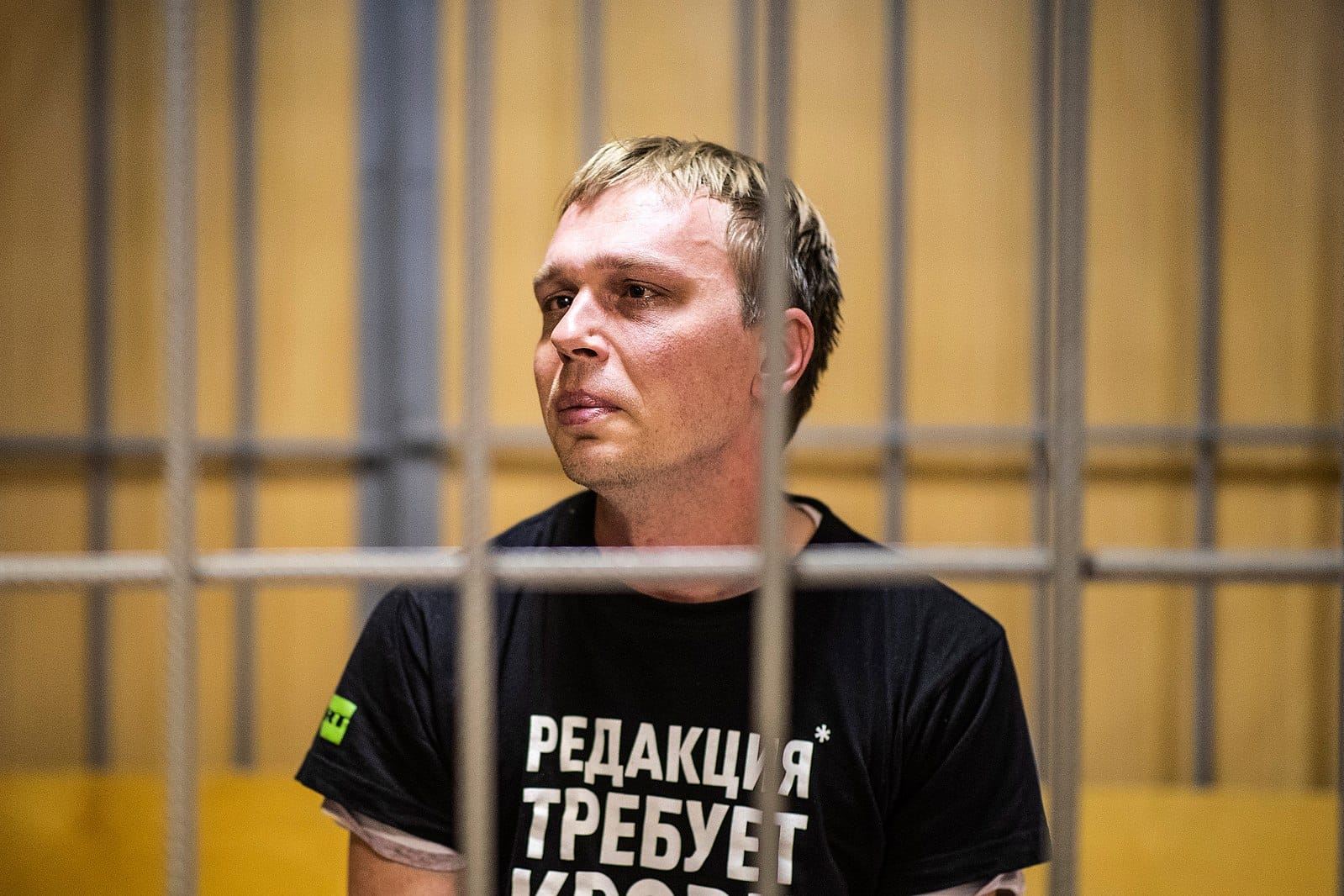
He said the arrest was connected to his investigative work—specifically, his latest article about corruption in Moscow’s funeral industry, over which he had received threats. The persons of interests in Golunov’s investigation were Aleksei Dorofeyev, head of the Moscow FSB branch, and his aide Marat Medoyev.
Golunov’s arrest caused a great stir among Russian journalists. Rallies in his support were held in Moscow; questions about his situation were addressed to government officials at the high-profile St. Petersburg International Economic Forum. Golunov’s case started trending online. All of these factors made it part of the federal agenda. Within days, all leading media outlets voiced their support for Golunov—from the state-funded RT to the independent Novaya Gazeta.
On June 10, three major dailies ran the same front page, saying “I/We are Ivan Golunov.” Due to this unprecedented campaign, Golunov was released from arrest, and on June 11, cleared of all charges. Russian interior minister Vladimir Kolokoltsev personally delivered the news in a special video address.
As a result of internal investigation, seven police officers involved in the case were fired. On December 18, the Investigative Committee finally opened a criminal case on the count of violations committed in Golunov’s arrest.
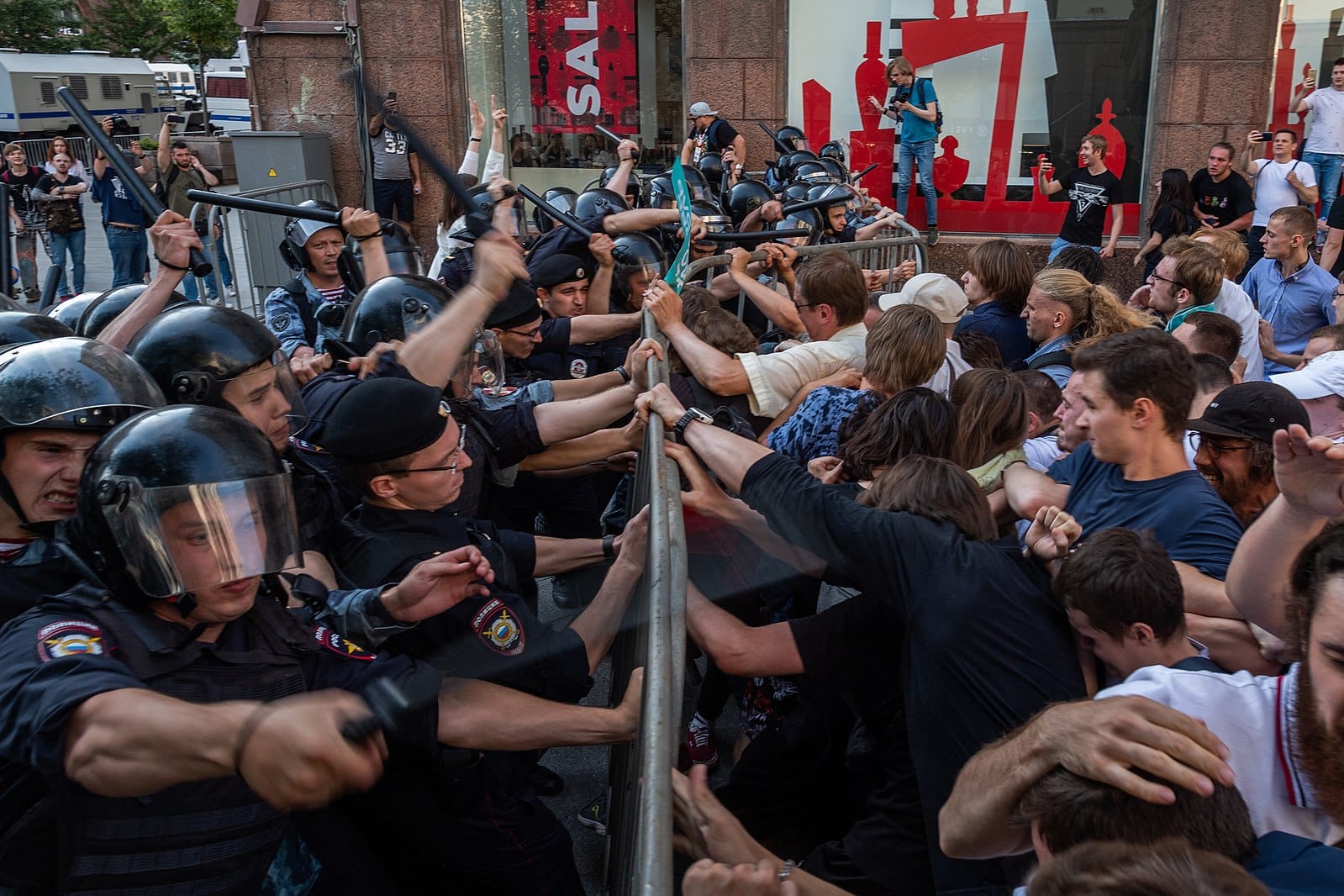
The first sanctioned rally for the right of the independent and opposition candidates to be registered in the election took place on July 20, with about 20,000 people showing up, according to some estimates. On July 24, one of the opposition leaders, Aleksei Navalny, was arrested for 30 days for his calls to participate in an unsanctioned protest on July 24.
The second rally was planned on July 27 as a meeting with voters—a format that doesn’t require prior sanction from the authorities. That morning, several opposition politicians were detained, including Dmitri Gudkov, Ilya Yashin, Lyubov Sobol, Yulia Galyamina, Ivan Zhdanov. Still, the protest formed spontaneously, with about 5,000 people taking part, but was cracked down on by the special police units of Rosgvardia (the National Guard force). Over a thousand people were detained, about 60 arrested, hundreds penalized.
The opposition filed a petition for the third rally to be held on August 3, but city authorities refused to sanction it on that day. Again, protests burst out spontaneously around Moscow, with several thousand participating—many of whom were detained. Police actions were harsh, 20 people were reportedly beaten up. According to Agora, a Russian human rights group, on that day mobile internet was temporarily shut down in Moscow.
The following rally, scheduled for August 10, was finally sanctioned by the authorities. Organizers announced popular music artists, including rapper FACE, electronic duo IC3PEAK, and gangsta rap group Krovostok. The allure of their live performances brought more people to the rally—up to 60,000. Popular videoblogger Yuri Dud and another rapper, Oxxxymiron, who called on their social media followers to join in, also participated in the protest. After the official rally was over, several thousand people marched toward the building of the presidential administration, where police started to crack down on the peaceful protesters. A video featuring a girl being kicked in the stomach by a police officer was posted online and went viral.
Despite the rallies and protests, opposition candidates were not allowed to run. Still, when the September 8 election results came in, the pro-Kremlin United Russia party lost 13 seats—to the Communist Party and A Just Russia.
Another result of the summer protests was the so-called “July 27 case” under which 15 people were criminally prosecuted. Memorial Human Rights Center recognized them as political prisoners, because they “were baselessly accused of participation in mass riots, violence against the security forces and organizing such violence.” Out of 15, three people received suspended sentences, one fled Russia, and the rest were sentenced to real prison terms.
On January 21, Putin introduced the bill amending the Constitution to the State Duma, where it was approved in the first reading. Some of the key amendments that will define Russia’s future power configuration are: codifying the status of the State Council (an advisory body to the president created in 2000) in the Basic Law; limiting the number of presidential terms to two (instead of two consecutive terms); and creating a more flexible system of government appointments and resignations.
Many observers believe the reform is rooted in the Kremlin’s need to resolve the so-called “2024 problem,” that is, the question of who will rule Russia when Putin’s current term expires.
The composition of the government changed to reflect the Kremlin’s priorities. Most members of the state security agencies retained their positions, while the social and economic bloc received new leadership, a move some observers say is linked to the implementation of the national projects announced by Putin in 2018. Excluded from the new government were the most “toxic” figures, such as controversial culture minister Vladimir Medinsky and labor minister Maxim Topilin, who was publicly associated with the unpopular pension reform.
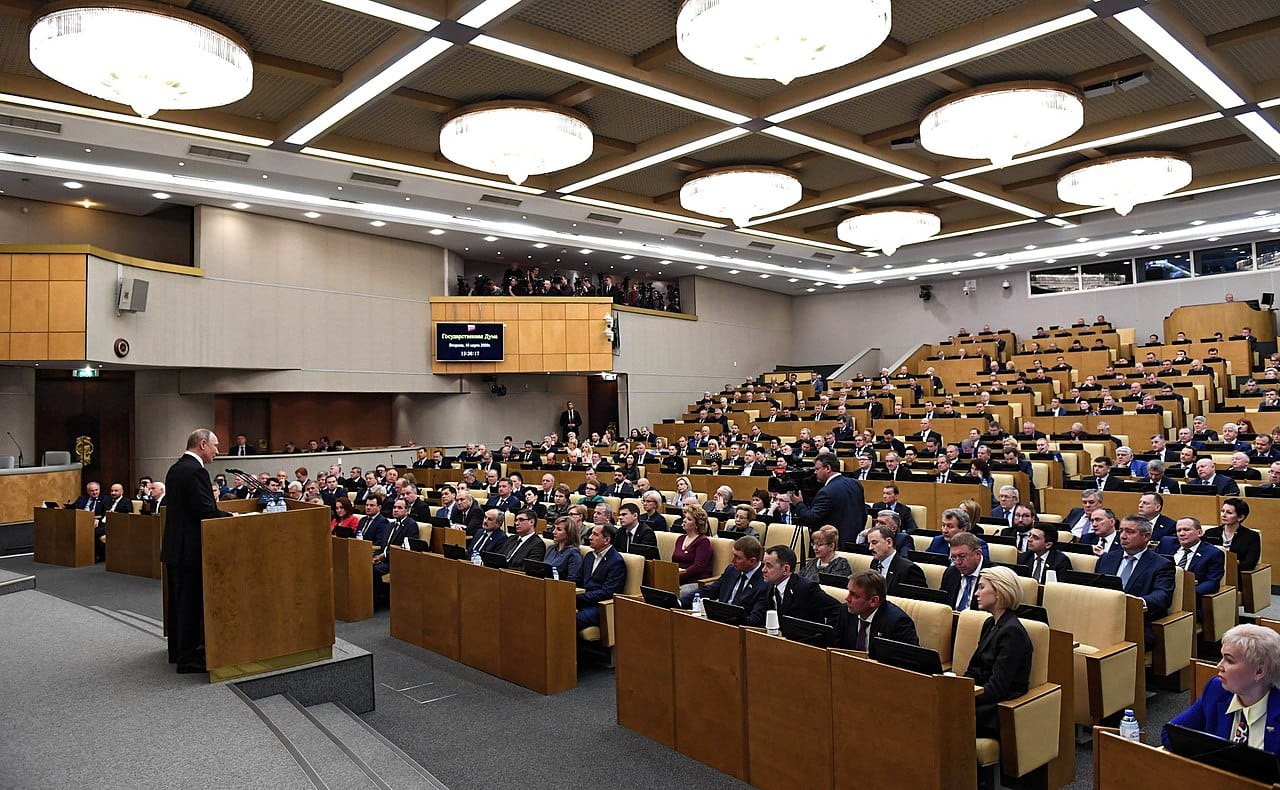
* Data on protest events, number of participants, and detentions is sourced from the Lankina Russian Protest-Event Dataset (LAruPED) for the years 2007 to 2016, from OVD-info for 2019 (Moscow and St. Petersburg only), and from the Center for Economic and Political Reforms for 2017-2018 (all regions). Data does not include pro-regime protests and demonstrations. Information on the number of protest participants in particular should be viewed with caution as attempts to calculate attendance are notoriously difficult. These totals should be viewed as conservative estimates.